Here’s our look at the Trump administration and the rest of Washington:
- Moscow ordered to close offices in San Francisco, New York and Washington
- Special counsel has lobbyist at 2016 meeting with Trump Jr. testify to grand jury
- President Trump kicks off fall campaign for tax cuts, still without any plan
- Trump gets criticism from the man he called ‘my African-American’
- Share via
Trump could pay a price if he hands out pardons in the Russia inquiry as he did for Joe Arpaio
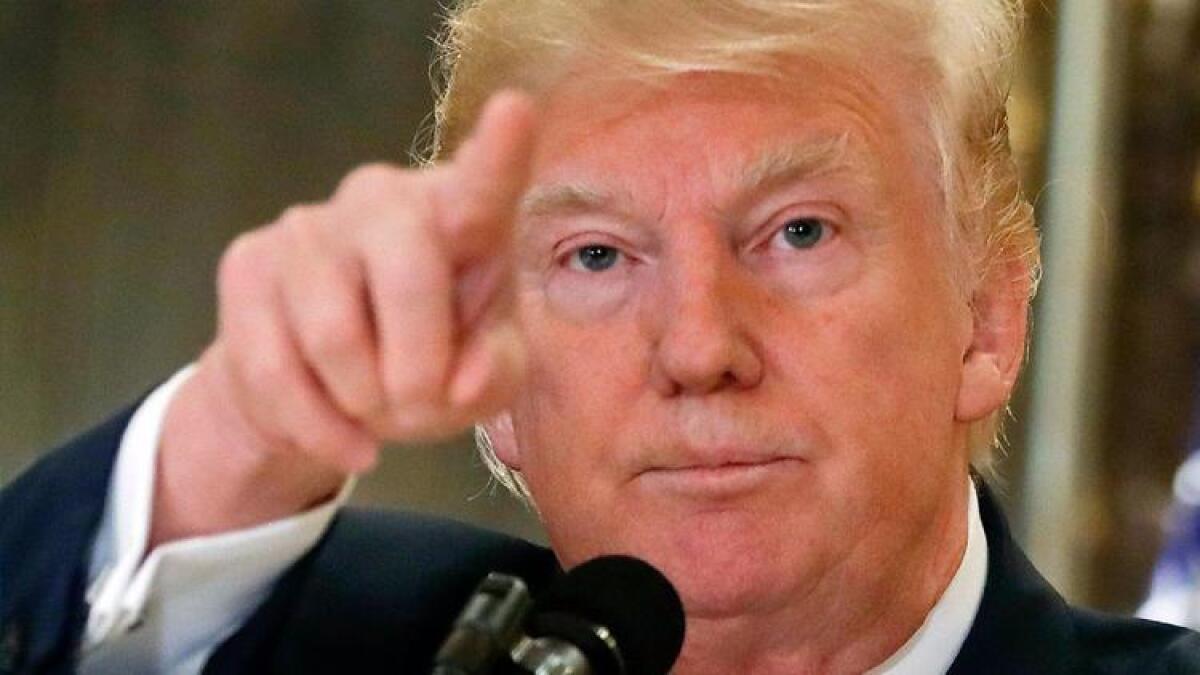
President Trump’s granting of a full pardon to former Sheriff Joe Arpaio was seen by many legal experts as a sign of what may come in the special counsel’s inquiry into Russia’s meddling in last year’s presidential race and possible collusion with the Trump campaign.
Trump has insisted the investigation led by former FBI Director Robert S. Mueller III is a “witch hunt” and should be shut down, the sooner the better. Some predict that the president will use his power to pardon anyone at any time for nearly any reason to make the investigation moot.
“Kim Jong Un was not the only leader testing his weapons” last week, said Bill Yeomans, a veteran Justice Department lawyer now working with the liberal Alliance for Justice, referring to the North Korean leader’s missile launch a day after Trump pardoned Arpaio, the former sheriff of Maricopa County in Arizona.
“Trump launched a warning pardon that announced the weaponization of the pardon power,” Yeomans said.
Trump insiders who might benefit include Jared Kushner, Donald Trump Jr., Paul Manafort, Michael Flynn and anyone else targeted by Mueller.
- Share via
Trump is considering ending DACA, but hasn’t decided, aides say

President Trump is still reviewing whether to end the Obama-era program that has protected from deportation more than 750,000 people brought to the country illegally as children, senior White House officials said on Thursday.
The officials denied the president had decided to end it, in response to press reports that Trump would announce the decision perhaps Friday.
“My position here today is that the administration is still reviewing the policy,” Trump’s homeland security advisor, Tom Bossert, told reporters.
White House Press Secretary Sarah Huckabee Sanders said a decision to end the program “has not been finalized,” adding that it is being reviewed “from a legal perspective.”
Administration lawyers are studying whether the program, known as Deferred Action for Childhood Arrivals, or DACA, could withstand an expected legal challenge from conservative state attorneys general that could be filed in court as soon as Sept. 5.
Senior officials from the departments of Justice and Homeland Security met last week to discuss ways to end the program — whether to do so immediately, phase it out or decline to defend it in court.
Trump said repeatedly on the campaign trail he would end the program and called it “unconstitutional.” But as president, he has said in interviews that he is sympathetic to people who were underage when they came into the country illegally and had nothing to do with the decision to come.
When Trump took office in January, aides had written an executive order that would have phased out the program by halting the renewal of two-year work permits issued to those who had submitted to a federal background check. Trump balked at signing the order.
But pressure on the president to act against DACA has continued to mount from hard-line supporters who see it as part of his promise to crack down on illegal immigration.
- Share via
Congress expected to approve first Harvey relief funds as soon as next week, with more to follow
Congress will likely need to address Tropical Storm Harvey relief aid as soon as next week, with the Federal Emergency Management Agency quickly spending down its main disaster account.
Lawmakers already face a full September agenda when Congress resumes. But the fallout from Harvey and the need to swiftly provide assistance to disaster victims now tops the agenda.
“FEMA will likely run out of money before there’s a comprehensive number to address the entirety of the disaster response, so immediate action is needed,” said a senior Democratic aide.
As of early Wednesday, FEMA’s Disaster Relief Fund had $2.3 billion, including $1.4 billion in the major disaster account, which was projected to fall to $830 million with outlays for temporary housing and other pending obligations, according to internal reports.
A FEMA spokesman declined to say how quickly funding would be depleted.
But Tom Bossert, the White House Homeland Security advisor, said an initial request for funding from Congress was coming soon.
“We’re going to go up and ask for a disaster supplemental shortly,” Bossert said.
Bossert said he expected a multi-phase process, with a first request for supplemental funds coming quickly. A second, more substantial funding request would likely come later.
“I will make that request shortly,” he said. “What we’ll do is come back later for a second supplemental request.”
President Trump is set to convene congressional leaders at the White House on Sept. 6, but already House and Senate leaders are talking among themselves about what will be expected.
House Minority Leader Nancy Pelosi reached out to Speaker Paul D. Ryan on Monday and spoke with White House Chief of Staff John F. Kelly on Tuesday, pressing for emergency funds.
Congress has tangled over disaster funds in recent years, most markedly when Republicans voted in large numbers against relief for Hurricane Sandy victims, saying it should be paid for with funding cuts elsewhere. Even though Republicans held the majority in Congress, GOP leaders relied on Democrats for passage of that measure.
Both parties, though, appear poised to quickly approve disaster funds after Harvey swept through Texas and Louisiana, leaving more than 30 dead. Rain and floodwaters continue to menace the region.
The first tranche of funding may likely be proposed as a separate stand-alone bill, unclouded by other issues, to help ensure quick passage, despite the other must-pass measures requiring attention this fall.
Congress will have a dozen working days in session as it races to meet a Sept. 30 deadline to fund the government, averting a federal shutdown, and raise the debt limit to prevent a financial crisis, among other issues.
Conservatives, who have been reluctant to allow additional spending, warned against linking the relief to other measures.
Both the House and Senate appropriations committees have vowed to quickly address the needs.
“The Senate Appropriations Committee continues to monitor the situation in Texas and Louisiana and remains in contact with FEMA and other relevant authorities,” said Stephen Worley, a spokesman for the panel chaired by Sen. Thad Cochran (R-Miss.). “Chairman Cochran is prepared to respond quickly to any requests for supplemental appropriations for Hurricane Harvey response and recovery.”
- Share via
Pentagon chief says he’s been ‘widely misinterpreted,’ denies any rift with Trump
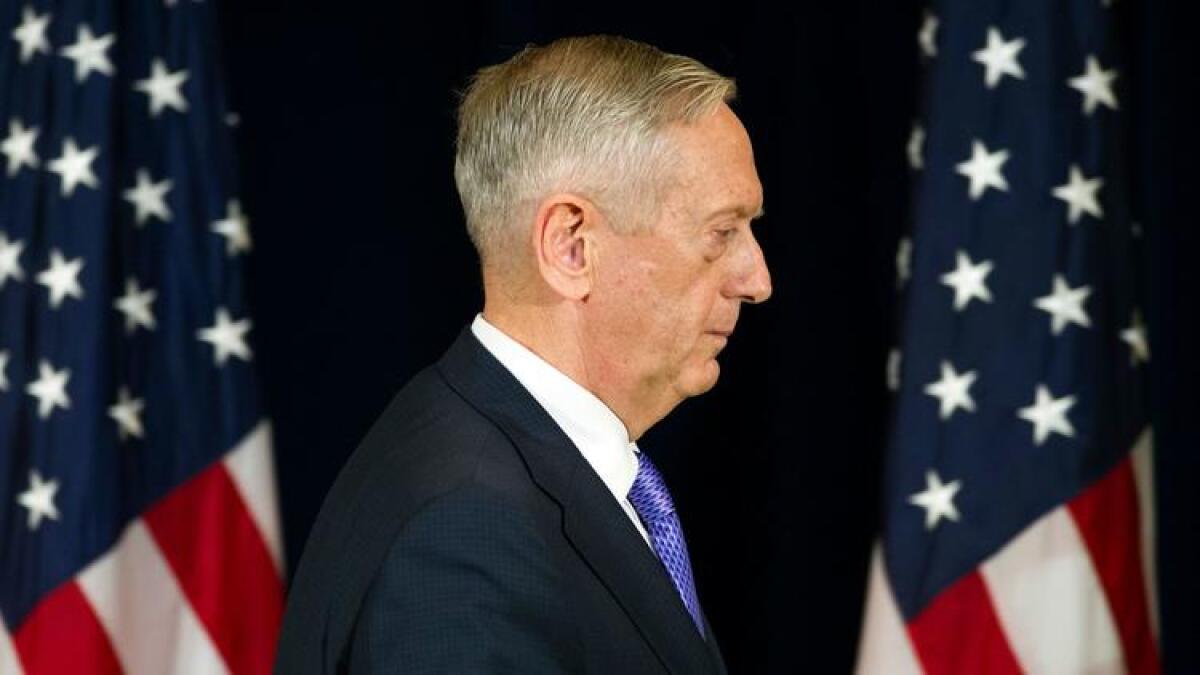
Defense Secretary James N. Mattis moved Thursday to knock down speculation that he was at odds with the White House, less than a week after a video of him talking to troops about American values led to widespread speculation that he was criticizing President Trump.
In the impromptu speech to U.S. forces deployed in Jordan, which was surreptitiously recorded on cellphone video, Mattis talked about political divisiveness in the wake of the racially inspired violence in Charlottesville, Va.
“Our country, right now, it’s got problems that we don’t have in the military,” Mattis said. “You just hold the line until our country gets back to understanding and respecting each other and showing it.”
When the video became public and circulated widely on social media, many interpreted the remarks as a slight against Trump’s leadership.
Speaking to reporters at the Pentagon on Thursday, Mattis called that interpretation “ludicrous.” He was reiterating what the president had said about the need for unity, he said.
“If I say ‘six’ and the president says ‘half a dozen,’ they’re going to say I disagreed with him,” Mattis said during the unscheduled appearance at the Pentagon press room.
The video, however, was not the only instance in which Mattis appeared to be saying something different from the president.
On Wednesday, Mattis publicly emphasized diplomacy as the path forward in the increasingly tense situation with North Korea. The statement came just hours after Trump tweeted that “talking is not the answer” to the problems with the defiant communist country.
Pyongyang has fired 21 missiles during 14 tests since February. The latest missile test, which flew over northern Japan on Monday, had triggered Trump’s tweet.
Even though Mattis said the “solutions” to the North Korea problem were likely to be found through diplomatic channels, he emphasized Thursday that he did not disagree with the president.
“There was no contradiction,” he said. “I agree with the president that we should not be talking to a nation that’s firing missiles over the top of Japan, an ally.”
Mattis acknowledged, however, that there are issues on which he and Trump disagreed.
In one example that was widely publicized, Trump reconsidered his calls for resuming the practice of waterboarding of terrorism suspects after talking to Mattis. The president also warmed to the North Atlantic Treaty Organization alliance, which he had previously called “obsolete,” following consultation with Mattis.
“First time I met with President Trump, we disagreed on three things in the first 40 minutes I met with him — on NATO, no torture and something else — and he hired me,” Mattis said. “This is not a man who is immune to being persuaded if he thinks you’ve got an argument.”
Despite the initial disagreements with Trump, Mattis agreed to serve as Defense secretary even though that meant coming out of retirement and back into the public spotlight.
“When a president of the United States asks you to do something ... I don’t think it’s old-fashioned or anything, I don’t care if it’s a Republican or Democrat, we all have an obligation to serve,” he said Thursday. “That’s all there is to it. And so, you serve.”
More recently, Trump settled on a new military strategy in Afghanistan, largely shaped by Mattis’ advice, after months of bitter internal debates within his national security team.
Trump said in announcing the strategy that his initial instinct had ben to “pull out.”
Ultimately, he was persuaded by his generals — Mattis, national security advisor Lt. Gen. H.R. McMaster, and Gen. Joseph F. Dunford, chairman of the Joint Chiefs of Staff — to provide U.S. commanders with additional troops and broader authority to pursue militant forces in Afghanistan.
Mattis confirmed that he has signed the first deployment orders to send additional U.S. troops to Afghanistan, but would not specify how many were being sent.
A highly respected four-star Marine general before his retirement, Mattis is a hard-charging but scholarly figure who issued heavy reading lists to subordinates and who carried “Meditations” by Marcus Aurelius on his deployments.
Trump likes to call him by the nickname “Mad Dog,” even though Mattis dislikes the moniker, dismissing it as something a “reporter came up with years ago on a slow news day.”
- Share via
Former DeVry University official chosen by White House to head Education Department student aid enforcement unit

The Trump administration announced Thursday that a former official at for-profit DeVry University has been picked to head an Education Department unit that polices colleges for student aid fraud.
Last year, DeVry paid $100 million to settle federal claims it misled students.
Julian Schmoke Jr., who was an associate dean at DeVry from 2008 to 2012, will lead federal student aid enforcement activities, Education Secretary Betsy DeVos said.
“In addition to a track record of successfully advocating for students for more than 20 years, he brings experience in higher education leadership, instruction and accreditation, including serving in an academic capacity at DeVry University, where he ensured the delivery of a quality education to students,” the Education Department said in a news release.
“Dr. Schmoke will lead a team focused on identifying, investigating and adjudicating statutory and regulatory violations of the federal student aid programs and on resolving borrower defense claims,” the release said.
The move drew criticism given DeVry’s troubles and the Trump administration’s efforts to reverse an Obama administration crackdown on for-profit colleges.
- Share via
U.S. orders Russia to close three diplomatic offices
Responding to a Russian government demand to drastically slash its diplomatic staff in Russia, the Trump administration Thursday ordered Moscow to close three of its consular offices in the United States.
Russia will be required to close its Consulate General in San Francisco, the chancery annex in Washington and the consular annex in New York, the State Department announced.
The move was the latest tit-for-tat action in worsening relations between Washington and Moscow, despite President Trump’s expressions of friendliness toward President Vladimir Putin.
Angered over a package of congressionally mandated economic sanctions, Russia had ordered the U.S. to cut its staff in Russia by around two-thirds, to 455.
- Share via
Trump called him “my African American.” But he condemns the president’s treatment of black America
On the day that changed his life, Gregory Cheadle almost stayed in bed.
He was tired — he traveled a lot in his long-shot bid for Congress — but asked himself: How often does a candidate for president come to the far reaches of Northern California? And why pass up a crowd and the chance to hand out more fliers?
So Cheadle roused himself that June 2016 morning and secured a spot up close when Donald Trump swooped in for a rally at Redding’s municipal airport.
It was hot, the atmosphere was loose and Trump’s patter seemed more stand-up comedy than campaign spiel. He went into one of those sidelong digressions, about protesters and an African American — “great fan, great guy” — and, by the way, whatever happened to him?
It was then, Cheadle said, he raised his hand and jokingly shouted, “I’m here.”
Trump looked and pointed, his voice a throaty rumble. “Look at my African American over here!” he exclaimed. “Are you the greatest?”
In the days and weeks that followed Cheadle was attacked on social media and harassed by people who dug up his phone number and email address. For a time he stayed home, too nervous to venture outside.
All, he said, because the media portrayed him as something he was not and never has been: a Trump sycophant.
- Share via
Lobbyist who attended Trump Tower meeting with Trump Jr. speaks to grand jury, reports say
A grand jury used by Special Counsel Robert Mueller has heard secret testimony from a Russian-American lobbyist who attended a June 2016 meeting with President Trump’s eldest son, the Associated Press has learned.
A person familiar with the matter confirmed to the AP that Rinat Akhmetshin had appeared before Mueller’s grand jury in recent weeks. The person spoke on condition of anonymity to discuss the secret proceedings.
The revelation is the clearest indication yet that Mueller and his team of investigators view the meeting, which came weeks after Trump had secured the Republican presidential nomination, as a relevant inquiry point in their broader probe into Russian interference in the 2016 election.
The meeting included Donald Trump Jr.; the president’s son-in-law, Jared Kushner; and his former campaign chairman, Paul Manafort. Emails released by Trump Jr. show he took the meeting expecting that he would be receiving damaging information about Hillary Clinton as part of what was described to him as a Russian government effort to aid the Trump campaign.
The Financial Times first reported Akhmetshin’s grand jury appearance. Reached by the AP, Akhmetshin declined comment. Peter Carr, a spokesman for Mueller, also declined comment Wednesday night.
The confirmation of Akhmetshin’s grand jury testimony comes after he spoke at length about his involvement in the Trump Tower meeting in an interview with the AP last month.
Akhmetshin, a former Soviet military officer who served in a counterintelligence unit, is also a well-known Washington lobbyist. He has been representing Russian interests trying to undermine the story of lawyer Sergei Magnitsky, who died in a Russian prison and is the namesake of a U.S. sanctions law.
Akhmetshin has been reported to have ties to Russian intelligence but he has denied that, calling the allegations a “smear campaign.”
Mueller and his team first signaled their interest in the Trump Tower gathering last month by contacting an attorney for at least some of the Russians who attended.
The meeting at issue was disclosed earlier this year to Congress and first revealed by the New York Times.
Trump Jr. has offered evolving explanations for the circumstances of the meeting, initially saying that the purpose was to discuss adoption and later acknowledging that he anticipated receiving information that he thought could be damaging to Clinton.
In addition to Akhmetshin, other attendees at the meeting included Russian lawyer Natalia Veselnitskaya, music publicist Rob Goldstone — who helped arrange the gathering — and a translator. Ike Kaveladze, who also goes by the name Irakly Kaveladze, also attended the meeting. Kaveladze works for a Russian developer who once partnered with Trump to bring the Miss Universe pageant to Moscow.
An email exchange posted to Twitter by Trump Jr. showed him conversing with Goldstone, who wanted him to meet with someone he described as a “Russian government attorney,” who supposedly had dirt on Clinton as “part of Russia and its government’s support for Mr. Trump.”
“If it’s what you say I love it especially later in the summer,” Trump Jr. wrote in one email response.
- Share via
U.S. has more troops in Afghanistan than previously disclosed, Pentagon reveals

The Pentagon revealed Wednesday that roughly 11,000 U.S. troops are currently deployed in Afghanistan, 2,600 more than the U.S. military had previously disclosed to the public.
Pentagon spokeswoman Dana W. White and Lt. Gen. Kenneth F. McKenzie Jr., director of the U.S. military’s Joint Staff, blamed the significant undercount on head-counting rules the Obama administration had devised.
The Obama-era policies did not include troops deployed for less than six-months -- a stint the military considers a “temporary basis” -- as part of the military’s total for Afghanistan. Because the Obama administration had set caps on the number of troops allowed to be deployed to active war zones in Afghanistan, Iraq and Syria, U.S. commanders found ways to supplement their forces by “temporarily” adding additional troops who would not be counted.
Defense Secretary James N. Mattis expressed frustration with the approach and ordered a comprehensive review to give a more accurate picture of the U.S. military footprint, following last week’s announcement by President Trump of a new military strategy in Afghanistan.
“The secretary has been clear about his commitment to transparency in our public reporting procedures and increasing commanders’ ability to adapt to battlefield conditions in countering emergent threats,” White told reporters at the Pentagon.
“Following a comprehensive review of our South Asia strategy, the secretary has determined we must simplify our accounting methodology and improve ... the public’s understanding of America’s military commitment in Afghanistan.”
The new policies “will balance informing the American people, maintaining operational security and denying the enemy any advantage,” White said, adding that the Pentagon is also reviewing its practices for disclosing troop numbers in Iraq and Syria.
“The fight is different in Iraq and Syria than it is in Afghanistan,” McKenzie said. “But in both theaters, eventually we’ll apply the same two pillars: balancing transparency of reporting with a requirement to protect the forces on the ground”
The Pentagon is still examining how many additional troops to deploy to join the 11,000 U.S. and 5,000 North Atlantic Treaty Organization troops now in Afghanistan. The U.S. and allied militaries train and advise Afghan security forces as they seek to quell a resurgent Taliban, Islamic State militants and other militias that have kept much of the country at war.
Trump has given Mattis the authority to send up to 4,000 more troops to the battlefield. U.S. warplanes already have stepped up the Afghan war, dropping 1,984 bombs and missiles so far this year -- more than twice as many as in the same period a year ago, according to Air Force statistics.
1:55 p.m.: This post was updated with additional Pentagon comments.
- Share via
Pentagon to convene panel on implementing Trump’s ban on transgender personnel in U.S. military
Defense Secretary James N. Mattis says the Pentagon won’t change its policy of allowing transgender people to serve in the U.S. military until he receives recommendations from a panel that is supposed to report back on the impact of a ban.
The panel will be drawn from the Departments of Defense and Homeland Security, but its members have yet to be named. They will examine how the Pentagon can implement President Trump’s directive banning transgender individuals from entering the armed forces.
Mattis’ statement Tuesday night came in response to Trump’s memo last Friday that directed Mattis, in consultation with secretary of Homeland Security, to submit a plan to him by Feb. 21. Trump has yet to appoint a new Homeland Security chief to replace John Kelly, who became White House chief of staff.
“As directed, we will develop a study and implementation plan, which will contain the steps that will promote military readiness, lethality, and unit cohesion, with due regard for budgetary constraints and consistent with applicable law,” Mattis said.
He said the panel will be made up of people with “mature experience, most notably in combat and deployed operations, and seasoned judgment to this task.”
In the interim, currently serving transgender troops will remain in the armed forces under existing policy, he said.
That policy, which was begun by President Obama last year after a lengthy Pentagon review, placed protection of gender rights in the military on par with race, religion, color, sex and sexual orientation. The move was part of a broader initiative to bring the military in line with shifts with social attitudes.
For the first time, transgender service members could serve openly, and several thousand people in the Army, Air Force, Navy, Marines and Coast Guard did so. The services had to provide medical and training plans, and arrange full implementation by July 1, 2017.
Mattis had pushed that deadline back six months before Trump unexpectedly announced on Twitter on July 26 that he planned to reverse Obama’s policy entirely, saying the military would neither accept nor allow transgender people to serve.
- Share via
Mattis says U.S. still aiming for diplomacy with North Korea despite Trump’s tweets to the contrary

Hours after President Trump tweeted that “talking is not the answer” in regards to the increasingly tense situation with North Korea, Defense Secretary James N. Mattis emphasized diplomacy as the path forward.
“We’re never out of diplomatic solutions,” he told reporters Wednesday while greeting South Korea’s defense minister, Song Young-moo, at the Pentagon
“We continue to work together, and the minister and I share responsibility to provide for the protection of our nation, our populations and our interests, which is what we are here to discuss today,” he said.
Trump had taken to Twitter less than three hours earlier to respond to North Korea’s latest missile test, which flew over northern Japan on Monday, and to subsequent threats from the isolated nation’s leader, Kim Jong Un.
“The U.S. has been talking to North Korea, and paying them extortion money, for 25 years. Talking is not the answer!” Trump tweeted Wednesday morning.
The statement raised questions about what the president meant, if diplomacy was not the way forward. Trump’s Cabinet members, including Mattis and Secretary of State Rex Tillerson, have repeatedly advocated for dialogue to ease tensions with the defiant communist country.
North Korean state media quoted Kim saying that Monday’s test of a Hwasong-12 intermediate-range missile was “the first step of the military operation” to target Guam, a U.S. territory that’s home to U.S. Navy and Air Force bases.
North Korea has fired 21 missiles during 14 tests since February, including three on Saturday, with many landing in the Sea of Japan, also known as the East Sea.
Last month, North Korea successfully test launched two intercontinental ballistic missiles — weapons in theory capable of striking the U.S. mainland, including California.
- Share via
Kremlin confirms it received email from Trump lawyer but never responded
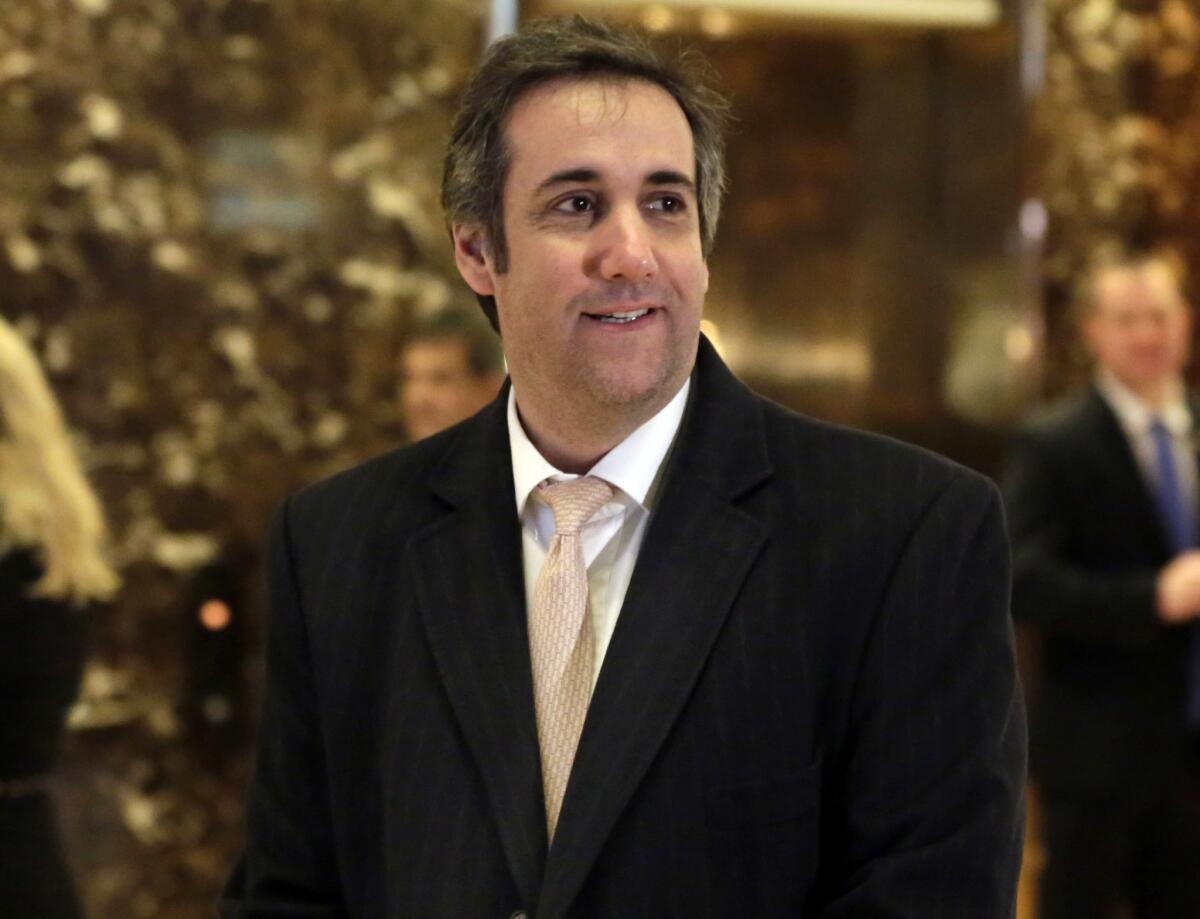
The Kremlin on Wednesday confirmed it received an email from President Trump’s personal lawyer during the 2016 U.S. presidential campaign in which the lawyer asked for help with a potential skyscraper project in Moscow.
Dmitry Peskov, spokesman for Russian President Vladimir Putin, said he did not respond to lawyer Michael Cohen’s email because the Kremlin does not address “such business requests.”
“It is not our job,” Peskov told reporters in a conference call Wednesday.
The Washington Post reported Monday that a Cohen statement to a House Intelligence Committee indicated that the president’s company pursued a project in Moscow during the Republican primary. The company later abandoned the project for unspecified reasons. The committee is investigating Russian interference in the 2016 U.S. presidential election and possible collusion between the Trump campaign and the Kremlin.
The email specifically asked for help with plans to build a Trump Tower skyscraper in Moscow, a plan which Cohen said he was working on with Felix Sater, a Russian-born New York businessman who claimed to have deep connections in Russia. The New York Times reported that Sater told Cohen Russian government approval was required for the project to move forward and suggested that Cohen reach out to Peskov directly for assistance.
“Buddy our boy can become President of the USA and we can engineer it,” Sater wrote in an email to Cohen. “I will get all of Putins team to buy in on this, I will manage this process.”
Peskov said his office had located a copy of Cohen’s 2016 email, which was sent to a general address for the Kremlin press office. The address can be easily found online, he told reporters.
Cohen’s email said “the business had been stalled and they were asking for help or some kind of recommendation about how to advance the issue,” Peskov said.
“We left it unanswered,” Peskov said.
The issue was never discussed with the Russian president, because it would be “impossible to discuss with President Putin the hundreds and thousands of requests of all kinds from a variety of countries” that are received in that general Kremlin address, Peskov said.
The Kremlin spokesman said he did not know Cohen personally.
“No, we never met, sadly … or thankfully,” Peskov said.
- Share via
AFL-CIO president: ‘Calling the president names, even if they’re accurate, gets you nowhere’
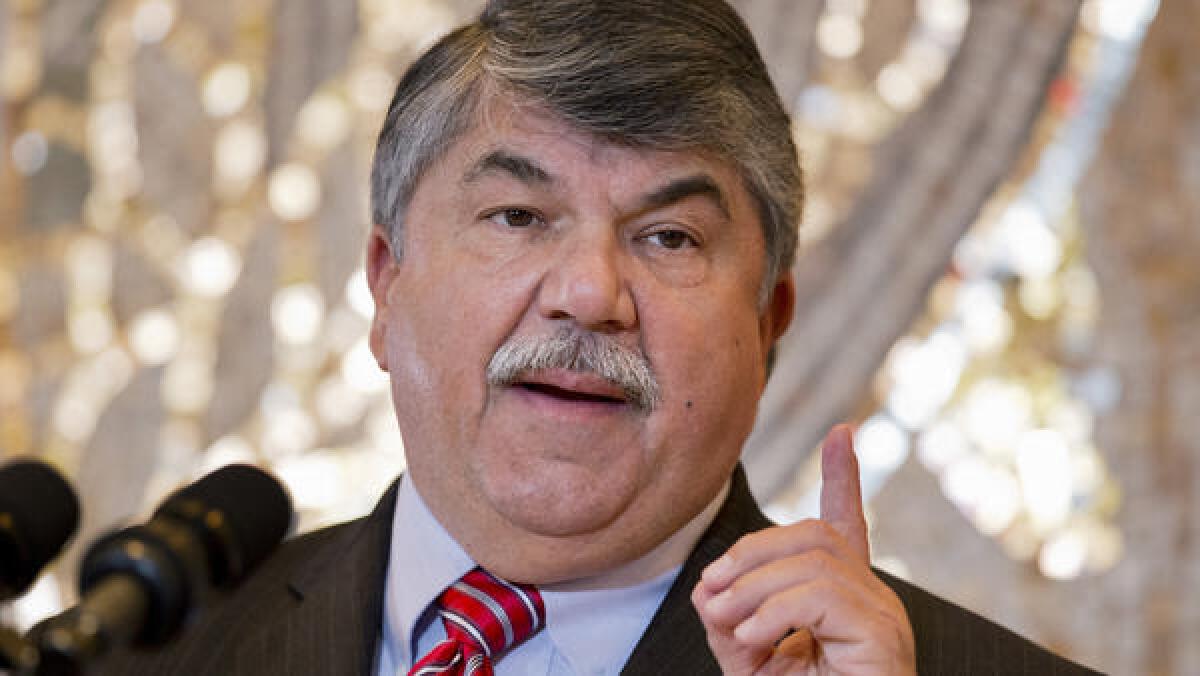
The nation’s most powerful labor union chief, still reeling from Democrats’ big losses in 2016, has a message for them as they work to win back working people.
“Calling the president names, even if they’re accurate, gets you nowhere,” Richard Trumka, president of the AFL-CIO, told reporters Wednesday at a breakfast sponsored by the Christian Science Monitor.
Trumka, reared in one of the Pennsylvania coal towns that Trump swept in the election, said that telling voters who supported him that they were stupid to do so is also a strategy for failure. Instead, he said, Democrats need to make the case to those who gave him the benefit of the doubt that Trump has not done what he promised.
“He hasn’t done any of these ‘do this and do that,” Trumka said.
Even as the labor chieftain cautioned against name-calling, he was not averse to criticizing Trump’s administration as he recounted his struggle to find common ground with the populists in the White House.
“The difficulty that you had was you had two factions in the White House,” Trumka said. “You had one faction that actually had some of the policies that we would have supported on trade and infrastructure but they turned out to be racist. On the other, you had people that weren’t racist. But they were Wall Street.”
Trumka, who was a strong supporter of Hillary Clinton, faulted the Democratic nominee for not delivering a “kitchen table message” to win over working-class voters. He also distanced organized labor from her defeat: “I wasn’t running. The union wasn’t running. It was him and Hillary.”
After the election, Trumka met several times with administration officials and was named to a White House advisory council on manufacturing. But he recently left the council, along with its corporate members, in protest of Trump’s handling of the racial violence in Charlottesville, Va., and the president dissolved it.
- Share via
If GOP scales back the mortgage interest deduction, Californians would be hit hardest

For decades, the home mortgage interest deduction has been one of the most sacred of cows in the U.S. tax code.
It is particularly revered in Los Angeles and other areas with high real estate prices, where the annual tax savings can be the difference between being able to afford a house or continuing to rent.
Now, Republicans crafting legislation to overhaul the federal tax system and cut rates are considering placing new limits on the home mortgage interest deduction.
And thousands of Californians could feel the pain.
- Share via
‘Disappointed’ and ‘let down’: Trump voters in focus group voice discontent
With each crisis of the young Trump administration, reporters and pollsters have documented the steady support he continues to get from his most ardent backers, the roughly one-in-four Americans who consistently tell pollsters that they approve of his performance in office, agree with him on most issues and like his personality.
Tuesday night at a focus group in Pittsburgh, a group of reporters heard from a different slice of Trump voters — ones he’s lost for now.
“Outrageous,” “disappointed,” “not ready” were among the adjectives that focus group members who had voted for Trump tossed out when asked for a single word to describe the president.
“He has got to be his own worst enemy,” said Tony Sciullo, a lifelong Pittsburgh resident and a registered independent who works for an insurance agency and described Trump as an “abject disappointment.”
Brian Rush, a registered Republican who works as a sales representative, voiced a slightly more supportive view.
“I’m still going to hold off judgment,” he said. “I’m hoping things can turn around.”
Trump “does want this country to be great,” Rush said. But he likened the administration to a recently bought car that now has several dents and is “not running the way it should” while the mechanics “don’t know exactly why.”
Their disappointment, the Trump voters present made clear, focused mostly on the president’s behavior and personality as opposed to his positions on particular issues.
Polls have documented Trump’s slide among voters like this — those who backed him with reluctance, not fervor, generally favoring other candidates in the GOP primaries and voting for Trump in the end largely as a reaction against Hillary Clinton, the Democratic nominee. The focus group, conducted by veteran pollster Peter D. Hart, provided an opportunity to hear their views in more detail.
The session was not originally designed to elicit such views: It’s part of a project Hart is conducting for Emory University in Atlanta to probe voter attitudes on major issues. Tuesday night’s group was primarily intended to look at views toward immigration. The 12 Pittsburgh-area residents who took part were divided roughly equally between Trump and Clinton voters.
- Share via
Missile Defense Agency says it successfully tested system against a medium-range ballistic missile
The Pentagon’s Missile Defense Agency says it has successfully completed a missile defense flight test -- intercepting a medium-range ballistic missile target from a warship off the coast of Hawaii.
The agency said the John Paul Jones detected and tracked a target missile launched from Kauai with its onboard AN/SPY-1 radar. The destroyer fired SM-6 missiles to intercept the test missile.
“We are working closely with the fleet to develop this important new capability, and this was a key milestone in giving our ... ships an enhanced capability to defeat ballistic missiles in their terminal phase,” Lt. Gen. Sam Greaves, who heads the missile defense agency, said in a statement. “We will continue developing ballistic missile defense technologies to stay ahead of the threat as it evolves.”
The test marks the second time an SM-6 missile has successfully intercepted a medium-range ballistic missile target, the agency said
It comes a day after North Korean leader Kim Jong Un’s government flew a medium-range ballistic missile over northern Japan, sparking alarms there. The missile was unarmed but officials said it was designed to carry a nuclear warhead
- Share via
Trump to kick off tax-cut push with speech devoid of details, White House says
President Trump will kick off a weeks-long effort to sell Americans on tax cuts with a speech on Wednesday in Missouri that aides said will not contain any details on a Republican plan that is still being drafted.
Trump will use the event at the Loren Cook Co. manufacturing plant in Springfield, Mo., to explain why Congress should cut corporate rates and make other changes to the federal tax code, said senior White House officials, who spoke on the condition of anonymity to provide a preview of the president’s remarks.
“This is not a ‘how’ speech,” said one official.
Trump will talk about the need to make America more globally competitive and the tax code more equitable, by cutting the rates paid by businesses and individuals as well as by eliminating special interest loopholes that benefit the wealthy, the officials said.
The goal is to relieve what Trump will call “the crushing tax burden on American industry,” they said, adding that he will describe a new “American model” of taxes that puts workers and their families first and calls for business to grow domestically and hire U.S. employees.
- Share via
A look on the sidelines of Trump’s visit to storm-ravaged Texas

As President Trump arrived in Texas on Tuesday to witness the damage from Tropical Storm Harvey, he was greeted in Corpus Christi by a microcosm of a divided nation: a mix of well-wishers and protesters, both thrilled and furious he was here.
Dozens of people stood along Agnes Street, a quiet stretch of road just across a cotton field from the city’s airport. Some held up protest signs. Some held giant American flags. Some just held up their hands, waving hello.
- Share via
Pentagon says up to 30,000 National Guard troops prepared to assist in response to Harvey
Pentagon officials said Tuesday that National Guard assets are at full readiness to assist in the unfolding disaster in Texas wrought by Tropical Storm Harvey.
Maj. Gen. James C. Witham, director of domestic operations for the National Guard, told Pentagon reporters that up to 30,000 guardsmen as well as a U.S. naval amphibious assault ship could be called upon to help out in rescue efforts on the ground.
There are 30 National Guard helicopters flying in Texas in support of relief efforts surrounding the hurricane and subsequent tropical storm, with 24 more requested, he said.
Witham said that could increase to 100 helicopters in the days ahead as the Guard prepares for a sustained, phased response -- a departure from what the Guard has done in the past.
“This will be a long-term effort,” Witham said. “When the Guard responds to hurricane-type events, normally we talk about that first 72 to 96 hours for the lifesaving and life-sustainment that takes place. Then, we’re into the recovery effort.
“Due to the nature of this storm as it spun across southwest Texas for days and dumped historic levels of rainfall, our response has been very different than what we’ve looked at before,” he said. “And the planning associated had to be different because of the nature of it.”
The Guard has alerted thousands of forces across the nation for possible deployment. It has already sent elite special operations para-rescuers from California and New York to aid in the effort, he said.
“We are leaning as far forward as we possibly can to ensure that military assets are postured to support the needs of Texas and potentially Louisiana,” Witham said.
Texas Gov. Gregg Abbott has ordered the entire Texas National Guard, which numbers around 12,000 troops, to assist those affected by the storm. Only about 3,500 Texas guardsmen are now involved, which raised questions as to whether U.S. commanders in Washington had identified a bigger demand than Texas officials were willing to request.
Witham said, “Texas has been given everything that they’ve asked for” and that the Pentagon expects “more forces will be requested.”
“If you look at the magnitude and duration of this storm, we are just trying to anticipate additional needs on behalf of Texas,” he said.
The California Air National Guard from the 129th Rescue Wing in Mountain View had deployed about 90 guardsmen on Monday night.
The wing sent a team of Guardian Angel para-rescuers, a U.S. special operations search-and-rescue unit. The wing also sent two HH-60G Pave Hawk rescue helicopters and an MC-130 transport aircraft.
“This is their wheelhouse,” said Capt. Will Martin, a California National Guard spokesman. “They carry out over-water rescue throughout the year and they have been in Texas before.”
The Bay Area wing was deployed to Texas in disaster response to Hurricane Rita in 2005, Hurricane Ike and Hurricane Gustav in 2008.
- Share via
Trump on Texas response: ‘We’ll congratulate each other when it’s all finished’
- Share via
Trump lands in Texas with promise of help to residents battered by Harvey
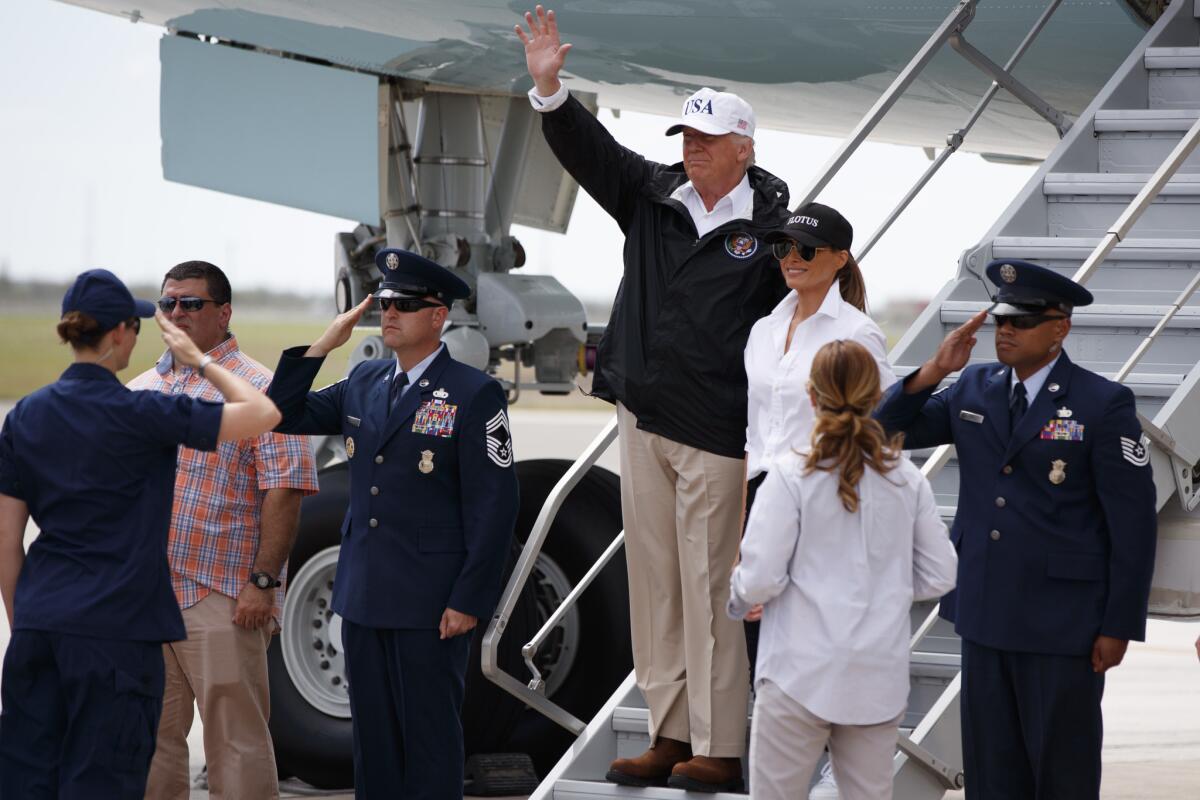
President Trump landed in Texas late Tuesday morning with plans to tour the state’s emergency operations center and get briefed on the state’s worsening flooding crisis while rescuers are still pulling people from submerged homes.
The trip to Corpus Christi and Austin comes a day after Trump promised to bring swift financial help for a “long and difficult” recovery from the storm’s devastation, which he said would cost billions.
“We think you’re going to have what you need, and it’s going to go fast,” he said.
Congress has not outlined a plan to tackle the needs of Texas and Louisiana, the two states that took the brunt of Harvey, a hurricane now downgraded to a tropical storm.
State and local officials are still responding to the immediate safety threat and have not begun to fully assess the long-term costs of the epic storm, which has turned large parts of Houston, the nation’s fourth-largest city, into a lake.
- Share via
Sen. Ted Cruz defends his ‘no’ vote on disaster relief funds for Sandy in light of damage from Tropical Storm Harvey
Texas Sen. Ted Cruz was among a group of Republicans who voted against a $50.5-billion relief package for victims of 2012’s Superstorm Sandy when it came before them in January 2013. The measure passed anyway.
Now that his own state is likely to need a federal relief package totaling $40 billion or more due to a storm still pummeling the Gulf Coast around Houston, critics are calling out Cruz for what they say is hypocrisy for his decision to oppose Sandy relief while presumably supporting it now for Texas.
In an interview with NBC’s Katy Tur, Cruz defended his vote, saying the Sandy relief bill was filled with “unrelated pork.”
“Two-thirds of that bill had nothing to do with Sandy. And what I said then, and still believe now, is that it’s not right for politicians to exploit a disaster when people are hurting to pay for their own political wishlist,” he said.
Lawmakers from the New York-New Jersey region, which sustained the heaviest damage from Sandy, have signaled that they won’t let their anger over Cruz’s and other Republicans’ opposition to Sandy aid cloud their decision on Harvey relief.
- Share via
Trump says ‘all options are on the table’ after North Korea flies test missile over Japan
President Trump said Tuesday that “all options are on the table” in terms of a U.S. response to North Korea’s launch of a missile over Japan.
In a terse, written statement, Trump said that with the missile launch North Korea has “signaled its contempt for its neighbors, for all members of the United Nations, and for minimum standards of acceptable international behavior.”
“Threatening and destabilizing actions only increase the North Korean regime’s isolation in the region and among all nations of the world,” Trump said. “All options are on the table.”
Trump later told reporters, “We’ll see, we’ll see” when asked what he would do about North Korea. Trump, accompanied by First Lady Melania Trump, was departing the White House for a trip to survey storm damage in southeastern Texas.
In a first, North Korea on Tuesday fired a midrange ballistic missile designed to carry a nuclear payload that flew over U.S. ally Japan and splashed into the northern Pacific Ocean, officials said. The aggressive launch over the territory of a close U.S. ally sent a clear message of defiance as Washington and South Korea conduct war games nearby.
Trump’s statement implies that military action remains an option in resolving the standoff over North Korea’s development of nuclear weapons that could threaten the United States. But a U.S. military strike against North Korea is considered highly unlikely. Even Trump’s own strategic adviser, Steve Bannon, dismissed the threat as a bluff shortly before he was dismissed earlier this month.
North Korea has the world’s largest standing army and a massive conventional weapons arsenal that can easily target the South Korean capital of Seoul and its metropolitan area of about 25 million people.
While Democrat and Republican presidents have routinely offered the “all options on the table” formulation, U.S. officials have long assessed that the North would likely respond to any U.S. strike by attacking its neighbor or nearby Japan. The result could be a war with the risk of mass casualties on both sides. Hundreds of thousands of Americans in northeastern Asia, military and civilians, would be endangered.
In recent weeks the administration has been emphasizing it wants to use economic and diplomatic pressure to achieve a negotiated solution.
Trump and Prime Minister Shinzo Abe of Japan conferred by telephone over the latest missile test.
The White House said the leaders agreed that North Korea poses “a grave and growing direct threat” to the United States, Japan, South Korea and countries around the world.
“President Trump and Prime Minister Abe committed to increasing pressure on North Korea, and doing their utmost to convince the international community to do the same,” the White House said.
Abe said in a statement that “Japan’s and the U.S. positions are totally at one.”
The prime minister added that both nations were in “total agreement” that an emergency meeting was needed at the U.N. Security Council to step up pressure on North Korea after what he called an unprecedented threat. He also said Trump expressed his “strong commitment” to defending Japan.
Read MoreUPDATES
6:40 a.m.: This article has been updated throughout with additional details and background.
- Share via
Trump calls pardoned ex-sheriff ‘a patriot,’ renews call for closer ties to Russia
President Trump seemed eager to field questions during a Monday news conference, defending his decision to pardon former Arizona sheriff Joe Arpaio, still insisting Mexico will pay for his promised border wall and again refusing to criticize Russia.
The defense of Arpaio came amid a longer than expected news conference with Finnish President Sauli Niinistö in which Trump took more questions than either man planned.
Trump pushed back against accusations that he had tried to hide the controversial pardon of Arpaio by releasing it on a Friday night as Hurricane Harvey headed toward Texas. Instead, Trump asserted that he believed the television ratings would be higher than normal because so many people were monitoring the storm.
“Sheriff Joe is a patriot,” Trump said. “Sheriff Joe loves our country. Sheriff Joe protected our borders.”
The president said his pardon was no more controversial than other presidents. He pulled out a list of notes from his pocket, reading the names of figures pardoned by his past two Democratic predecessors, Presidents Clinton and Obama.
Apraio was convicted of violating a federal court order to stop his practice of racial profiling Latinos.
The pardon was criticized by Arizona Sen. John McCain among other Republicans, but Trump pointed to a boisterous rally in Arizona last week as evidence that the people of Arizona stand with him.
In fact, Arpaio, a high profile Trump campaign supporter, lost a popular election in Maricopa County in November, which Trump attributed to “unbelievably” unfair treatment
In a moment of levity, as Trump continued to take questions, he good-naturedly chided the Finnish president for calling upon the same female Finnish reporter twice. In fact, Niinistö had called upon different women.
“We have a lot of blond women in Finland,” the reporter joked.
Trump also remained defiant on two other issues that have come up frequently in his presidency — the proposal to build a larger border wall with Mexico and his relationship with Russia.
“I say it loud and clear, I’ve been saying for years,” Trump said. “I think it’s a good thing if we have great relationships, or at least good relationships, with Russia. That’s very important and I believe some day that will happen.”
Asked if he viewed Russia as a security threat, Trump demurred, saying he views many nations as security threats, but declining to mention Russia by name.
The comments came amid new revelations about his campaign’s ties to Russia, the subject of a federal investigation into election meddling.
On the wall, Trump declined to back down from recent threats that he would allow the government to shut down if Congress refuses to provide more money for the wall. During the campaign, Trump said that Mexico would pay for the wall, something Mexican officials have repeatedly dismissed as a nonstarter.
“We may fund it through the United States but ultimately Mexico will pay for the wall,” Trump said.
- Share via
Hillary Clinton will go to Wisconsin, this time
California will be among the first stops for Hillary Clinton’s upcoming tour touting her new book, “What Happened,” a memoir about her loss to Donald Trump.
Clinton’s only scheduled appearance in California is at UC Davis on Oct. 9, although more stops could be added during her swing through the U.S. and Canada.
The book tour map at the moment looks a lot different from, say, Clinton’s campaign trail schedule one year ago, when she was hopscotching between swing states. She didn’t visit Wisconsin, one factor her aides have admitted probably contributed to her loss in the state after 32 years of Democratic presidential victories there. She lost reliably Democratic Michigan to Trump, too, in the first win for Republicans there since 1988. It’s a safe bet she’ll express regret in both states when she speaks in the college town of Ann Arbor on Oct. 24 and in Milwaukee on Nov. 9, one year and one day after the 2016 election.
The remaining U.S. stops are almost entirely in states she won. Clinton’s California victory was her largest — she beat Trump here by more than 4.2 million votes.
Clinton’s tour kicks off at the Warner Theater in Washington, D.C., on Sept. 18. Other stops include Chicago, New York, Atlanta, Boston, Philadelphia, Seattle, Portland, Ore., and Montreal and Vancouver in Canada.
A book tour website states that other cities will be added once they are confirmed.
To attend one of Clinton’s book tour events, it’ll cost. Ticket prices range from a low of $55 for the event in Washington, which includes a ticket and a book, to $3,000 for a “VIP Platinum ticket” for the stops in Canada.
The platinum ticket includes front-row seating, admission for two, a backstage meet-and-greet with a photo and a copy of “What Happened.” Tickets prices for some of the events, including the one at UC Davis, have not been released.
Publisher Simon & Schuster told the Associated Press in July that Clinton’s book will be a personal memoir of her campaign as well as a “cautionary tale” about Russian interference in the election. The book’s publication date is Sept. 12.
“In the past, for reasons I try to explain, I’ve often felt I had to be careful in public, like I was up on a wire without a net,” Clinton writes in the introduction, according to Simon & Schuster. “Now I’m letting my guard down.”
3:45 p.m.: This post was updated with details about the cost of the tour.
- Share via
Now embroiled in Trump-Russia inquiry, Felix Sater once was an FBI informant
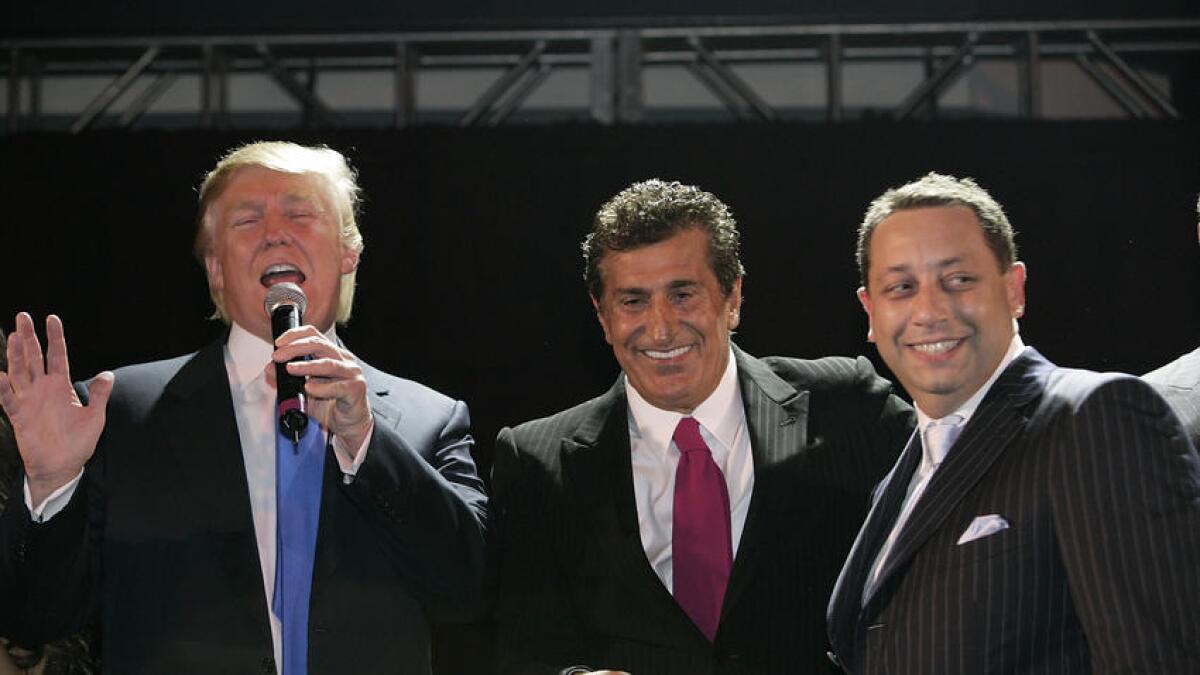
On Monday, the New York Times and Washington Post reported about Felix Sater, one of Donald Trump’s business associates, and the role he allegedly played during the presidential campaign in connecting Trump’s lawyer, Michael Cohen, to Russian government officials to facilitate approval of a proposed Trump Tower to be built in Moscow.
The Times spoke to Sater earlier this year about his work with the Trump organization and his claim to also be working with the FBI.
Working from a 24th-floor office in Manhattan’s Trump Tower, Felix Sater spent years trying to line up lucrative deals in the United States, Russia and elsewhere in Europe with Donald Trump’s real estate organization.
For much of that time, according to court records and U.S. officials, Sater also worked as a confidential informant for the FBI, and — he says — U.S. intelligence.
“I was building Trump Towers by day and hunting Bin Laden by night,” Sater, now 50, told the Los Angeles Times in a phone interview from New York.
As managing director of Bayrock Group LLC, a real estate development firm, the Russian-born businessman met Trump in 2003, court records show, when Trump was looking to expand his business and branding organization around the globe.
Although few projects were built, Sater worked on hotel and condominium deals with the Trump Organization through 2010 in New York, Florida, Arizona, London, Moscow and elsewhere even as he secretly helped the FBI infiltrate and take down organized crime figures, according to court records.
Trump has denied they were close, but Sater had access to Trump’s inner circle as recently as this year.
In January, Sater and Trump’s personal attorney, Michael Cohen, met in a New York hotel with a Ukrainian lawmaker who asked them to bring the White House a pro-Russian peace deal for Ukraine.
“I was only trying to stop a war,” Sater said of his role linking the lawmaker, Andrei Artemenko, with Cohen.
- Share via
Trump pledges quick federal aid to those hit by Harvey
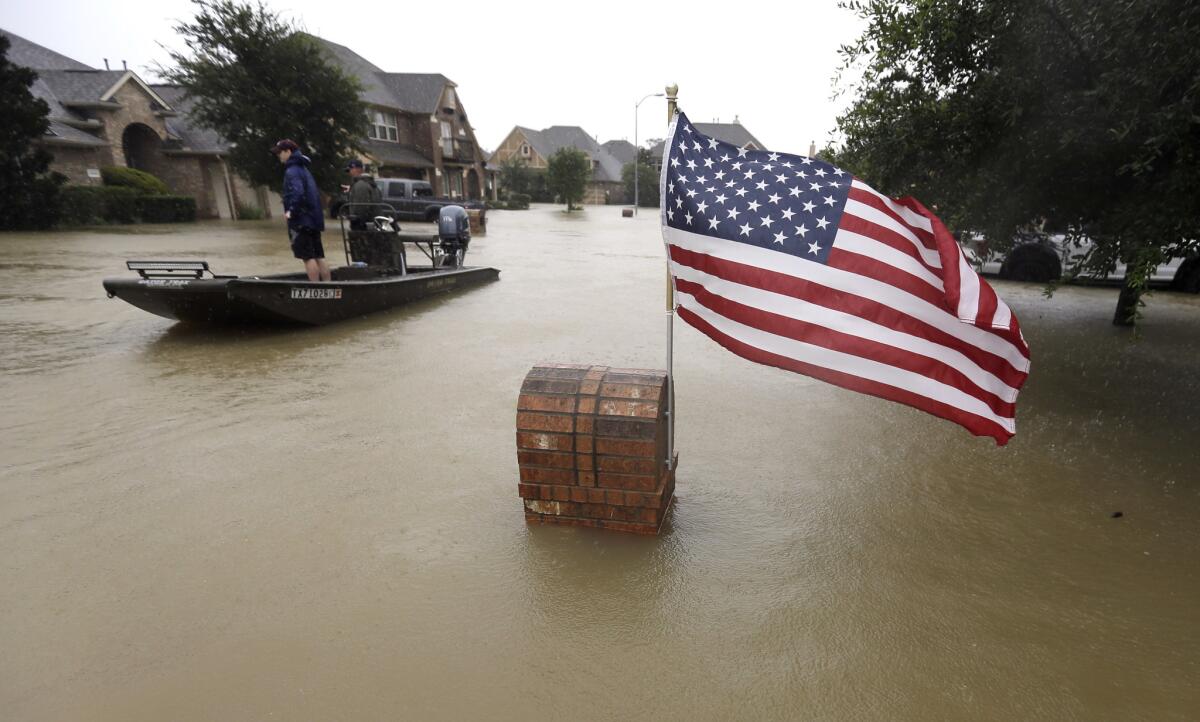
President Trump predicted that federal aid would be delivered quickly to those affected by Tropical Storm Harvey.
“You’re going to see very rapid action from Congress, certainly from the president.... We think you’re going to have what you need and it’s going to go fast,” Trump said at a news conference with the Finnish president in Washington today.
But he cautioned that the extent of the disaster is still unknown.
“It’s a long road. Still pouring. Nobody’s ever seen anything like it. I’ve heard the word epic. I’ve heard historic. That’s what it is,” he said.
- Share via
Lawyer says proposal for Trump Tower in Russia was abandoned
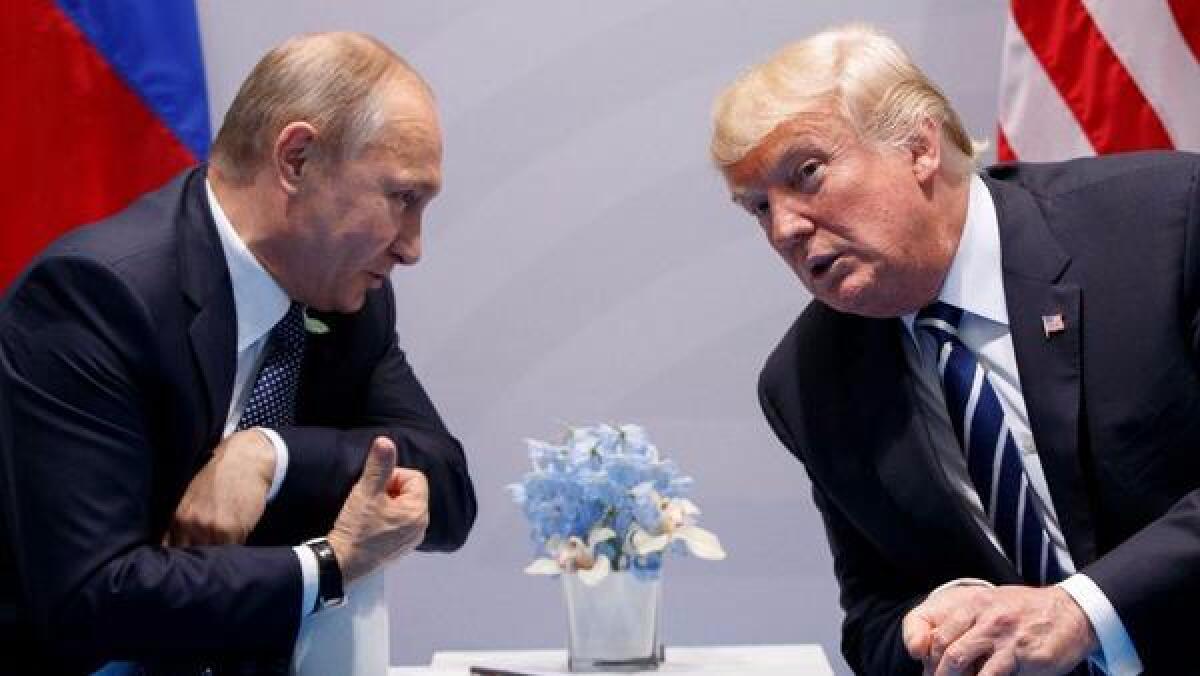
President Trump’s personal lawyer is acknowledging that the president’s company considered building a Trump Tower in Moscow during the Republican primary, but the plan was abandoned “for a variety of business reasons.”
The attorney, Michael Cohen, disclosed the details Monday to the House Intelligence Committee. The committee is looking into potential Russian interference in the 2016 presidential election. The statement was subsequently obtained by the Associated Press.
Cohen says he worked on the proposal with Felix Sater, a Russia-born associate who claimed to have deep connections in Moscow.
The story was first reported Monday by the Washington Post. The New York Times reported on emails in which Sater boasted to Cohen that the real estate deal could help get Trump elected.
UPDATES
12:05 p.m.: This post has been updated with a response from President Trump’s lawyer.
This post originally published at 5:58 a.m.
- Share via
ACLU sues Trump over transgender military ban
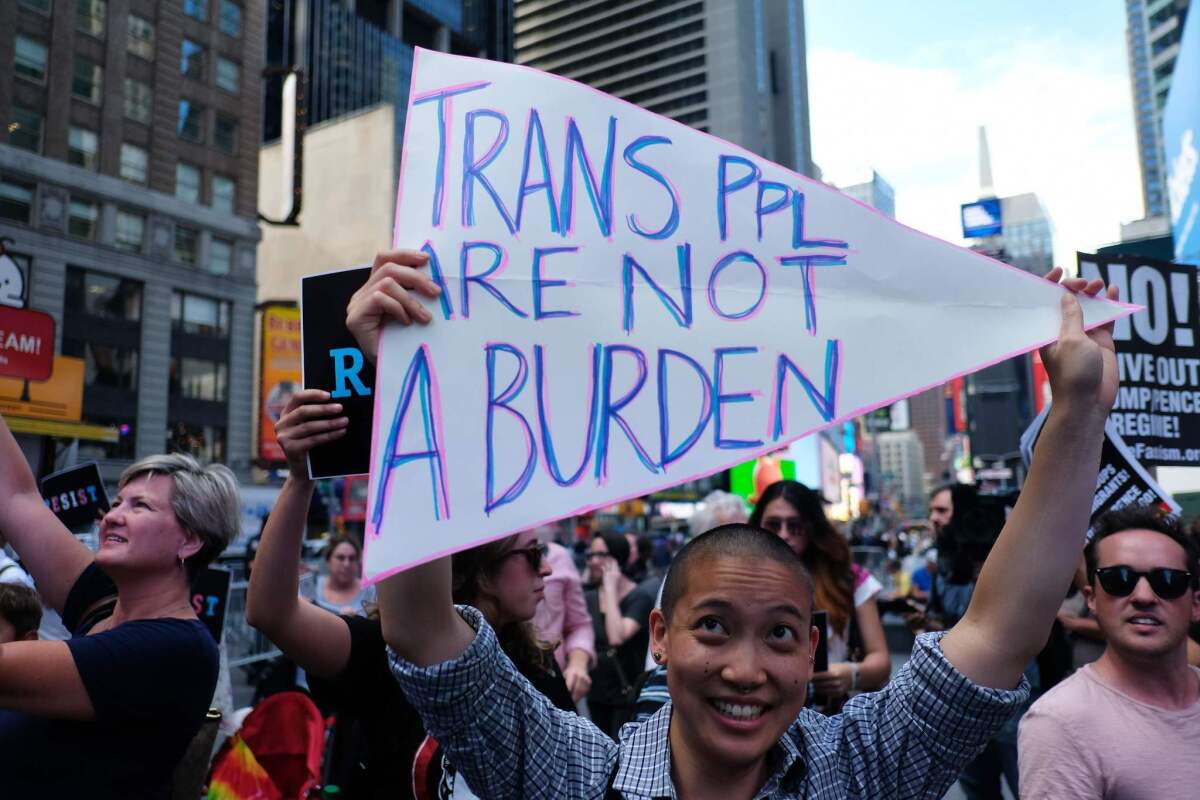
The American Civil Liberties Union on Monday filed a lawsuit challenging President Trump’s ban on transgender individuals joining the military.
The federal lawsuit was filed in Maryland by the ACLU of Maryland on behalf of several service members who are transgender.
Trump directed the Pentagon on Friday to implement the ban on transgender individuals joining the military, which he first announced in a tweet. He also gave the Pentagon the authority to decide the future of openly transgender people already serving.
The lawsuit says Trump’s policy violates the equal-protection rights of transgender service members who now have “grave reason to fear for their careers.”
- Share via
Trump travel to Texas now set for Tuesday, with promise to avoid hampering rescue efforts
The White House said Sunday that President Trump would travel to storm-battered Texas on Tuesday – although the president said earlier his travel would be planned so as not to disrupt rescue efforts.
The updated travel plan was announced by White House Press Secretary Sarah Huckabee Sanders as Trump returned to the White House by helicopter from Camp David, in Maryland, with his wife, Melania, and son Barron.
Daughter Ivanka Trump, her husband, Jared Kushner, and their three children had also traveled to the presidential retreat and returned with the first family on the short helicopter flight.
“We are coordinating logistics with state and local officials, and once details are finalized, we will let you know,” the White House statement said of Trump’s upcoming trip to Texas. “We continue to keep all of those affected in our thoughts and prayers.”
As Houston was hit by catastrophic flooding, Trump repeatedly tweeted praise for rescue workers and others trying to help those who were stranded by high waters.
The president also raised some eyebrows, though, with Twitter commentary on Sunday that had little to do with the onging disaster. One took aim at Sen. Claire McCaskill (D-Mo.), predicting Republican gains in the state and calling attention to his own margin of victory in the state in last year’s election.
Another tweet castigated Mexico as crime-infested and renewed Trump’s vow that Mexico would pay for his border wall. The Mexican government has said it will not.
- Share via
Speaker Ryan ‘does not agree’ with Trump’s pardon of Arpaio
House Speaker Paul D. Ryan became one of a few top Republicans to publicly disagree with President Trump’s pardon of former Arizona Sheriff Joe Arpaio, as lawmakers in Congress have become more willing to distance themselves from the White House, especially on issues of race.
“The speaker does not agree with this decision,” said Ryan spokesman Doug Andres. “Law enforcement officials have a special responsibility to respect the rights of everyone in the United States. We should not allow anyone to believe that responsibility is diminished by this pardon.”
Republicans tread carefully when leveling criticism of Trump or his administration’s approach to issues, fearful of turning off their supporters who back the president. Few Republicans in Congress spoke publicly after Trump’s pardon Friday of Arpaio, the former sheriff convicted of defying a court order to stop his department’s racial profiling of Latino residents suspected of illegally immigrating to Arizona.
The state’s two senators, John McCain and Jeff Flake, both expressed their disapproval. But they both have already endured Trump’s high-profile rebukes for their differences with the administration.
Only after Trump’s handling of the white supremacist rally in Charlottesville, Va., did larger numbers of Republicans in Congress publicly break from their party’s president. Lawmakers could not withstand having their party linked to any equivocation over the neo-Nazi groups.
Ryan spoke up against Trump last week, stating the president “messed up” in responding to Charlottesville.
But criticizing Trump carries risks as evident in Ryan’s statement on the Arpaio pardon. It was not disseminated broadly, through a press release or on social media or Twitter, but only given upon request.
- Share via
Trump sends message with Arpaio pardon: The federal government expects local help enforcing immigration laws
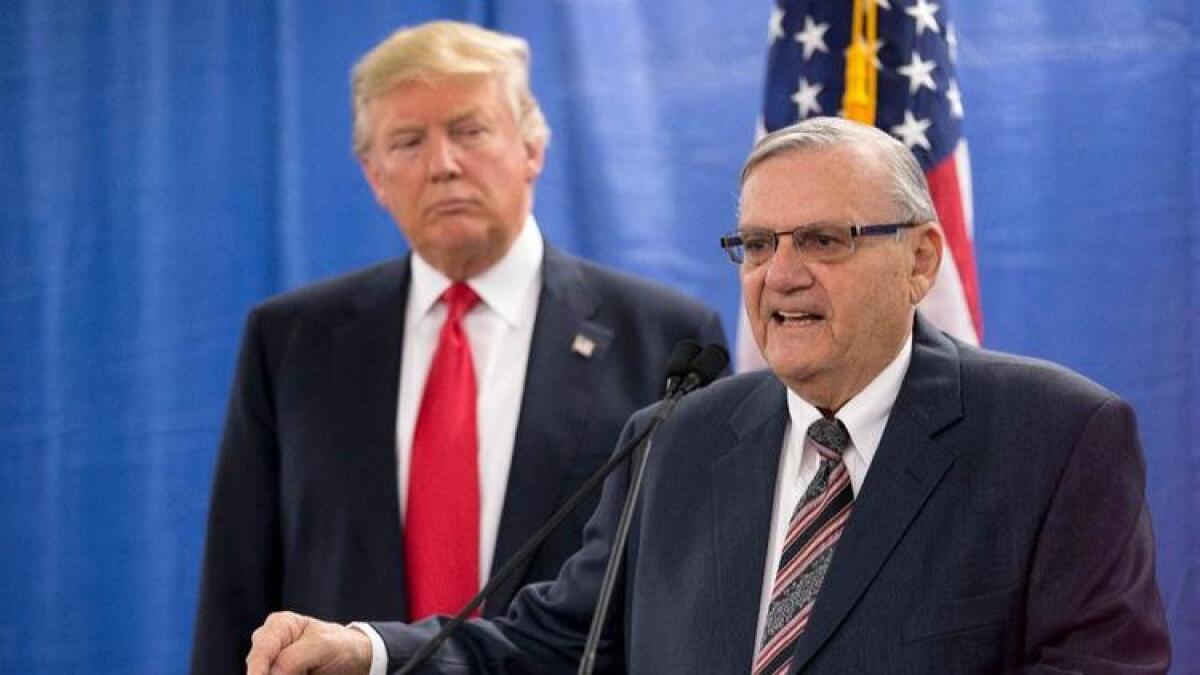
To President Trump and many of his supporters, Joe Arpaio is a national hero whose aggressive pursuit of people in the country illegally and cooperation with federal immigration authorities should be a model for cities and counties around the country.
“Was Sheriff Joe convicted for doing his job?” Trump asked at a raucous campaign-style rally in Phoenix last week, three days before pardoning the 85-year-old former Arizona sheriff.
The pardon of Arpaio — who was convicted of criminal contempt in July for flouting a court order to stop racial profiling of Latinos while he was sheriff — has galvanized Trump’s political base around an issue that was at the center of his presidential campaign.
But for civil rights advocates, who believe that local authorities should not enforce federal immigration laws, the pardon was an endorsement of illegal tactics and will only serve to deepen racial tensions.
“Arpaio built his work on terror and fear,” said Alejandra Gomez, co-executive director of the Arizona-based Living United for Change in Arizona, or LUCHA, an immigrant rights group. “Arpaio targeted the immigrant community, separating thousands of families. Arpaio built the foundation for Trump’s agenda.”
- Share via
Tillerson appears to distance himself from Trump on racism and ‘values’
As criticism of President Trump’s views on race has continued to mount, his secretary of State appeared – unusually -- to distance himself from “values” expressed by the chief executive in the aftermath of a white-supremacist march in Charlottesville, Va., earlier this month.
Appearing on “Fox News Sunday,” Rex Tillerson was asked about a U.N. panel’s recent criticism over failure at “the highest political level” of the U.S. to “unequivocally reject and condemn…racist violent events.” The panel, which normally confines its expressions of concern to the actions of dictatorial regimes or groups like Islamic State, did not mention Trump by name.
A 32-year-old paralegal, Heather Heyer, was killed when one of the Charlottesville marchers plowed a car into a crowd of counter-protesters. An Ohio man described as a Nazi sympathizer has been charged in the killing.
Asked about the statement earlier this month by the U.N. Committee on the Elimination of Racial Discrimination, TIllerson told interviewer Chris Wallace that he did not believe “anyone doubts the American people’s values” with respect to combating racism.
Pressed by Wallace whether Trump shared those values, Tillerson replied: “The president speaks for himself, Chris.”
When his interviewer followed up by asking the secretary whether he was separating himself from Trump’s views, Tillerson once again offered distancing language, saying “I have made my own comments” as to American values on racism.
Trump places a premium on personal loyalty, and in general, aides staunchly defend him even under the most controversial circumstances. But his homeland security advisor, Tom Bossert, declined Sunday to directly support the president’s contention that there had been “very fine people” among the white supremacist marchers.
Asked about that characterization, Bossert said: “I think you’ll have to ask the president how he wanted to parse” characteristics of march participants.
“I’d ask you to ask the president for clarification,” he said on ABC’s “This Week.”
Asked for his own views about those marching with Confederate banners and Nazi symbols while hurling racial invective, Bossert said: “I don’t think anyone chanting those things is a ‘very fine person’ – period.”
He did defend the overall tenor of Trump’s remarks condemning racism, however.
“I can’t be clearer,” he said after repeatedly attempting to return the conversation to the White House response to the hurricane that hit Texas. “I think the administration’s been clear.”
After Charlottesville, Trump drew fire when he initially failed to specifically denounce white supremacists and neo-Nazis as instigators of the violence, saying that the blame lay with “many sides.” Under pressure, he named the groups days later, but then made a series of statements appearing to walk back his initial response and slamming the unfairness of critics and the news media.
Virginia Gov. Terry McAuliffe, who has accused the president of fomenting disunity in response to the Charlottesville violence, criticized him anew on Sunday. Appearing on CNN’s “State of the Union,” the Democratic governor was asked about Trump’s contention that his initial response had been “perfect.”
“Those people came to do harm; they brought their hatred here,” he said of the white supremacists and their allies. “There is no moral equivalence…he needs to call that out for what it is.”
- Share via
Trump says he’ll visit hurricane-hit area when possible to do so without disrupting rescue efforts

President Trump said Sunday he would visit hurricane-hit Texas as soon as it was possible to do so without interfering with rescue efforts.
The state’s Republican governor, Greg Abbott, praised the response of federal authorities to the deadly storm, saying Texas was getting “absolutely everything we need” from the White House.
Hurricane Harvey made landfall Friday night and has since been downgraded to a tropical storm. It is blamed for at least two deaths, more than a dozen injuries, and widespread heavy flooding that has struck major cities such as Houston and Corpus Christi.
“We could not be more appreciative of what the federal government has done, from the president on down,” Abbott said on ABC’s “This Week.”
Appearing on the same program, Tom Bossert, the White House homeland security advisor, said the president’s travel would be planned so as not to interfere with lifesaving activity.
“The president wants to go to show his support,” Bossert said. “He doesn’t want to go to get in the way, and he’s been very clear about that.”
- Share via
Trump advisor Sebastian Gorka ‘no longer works at the White House’
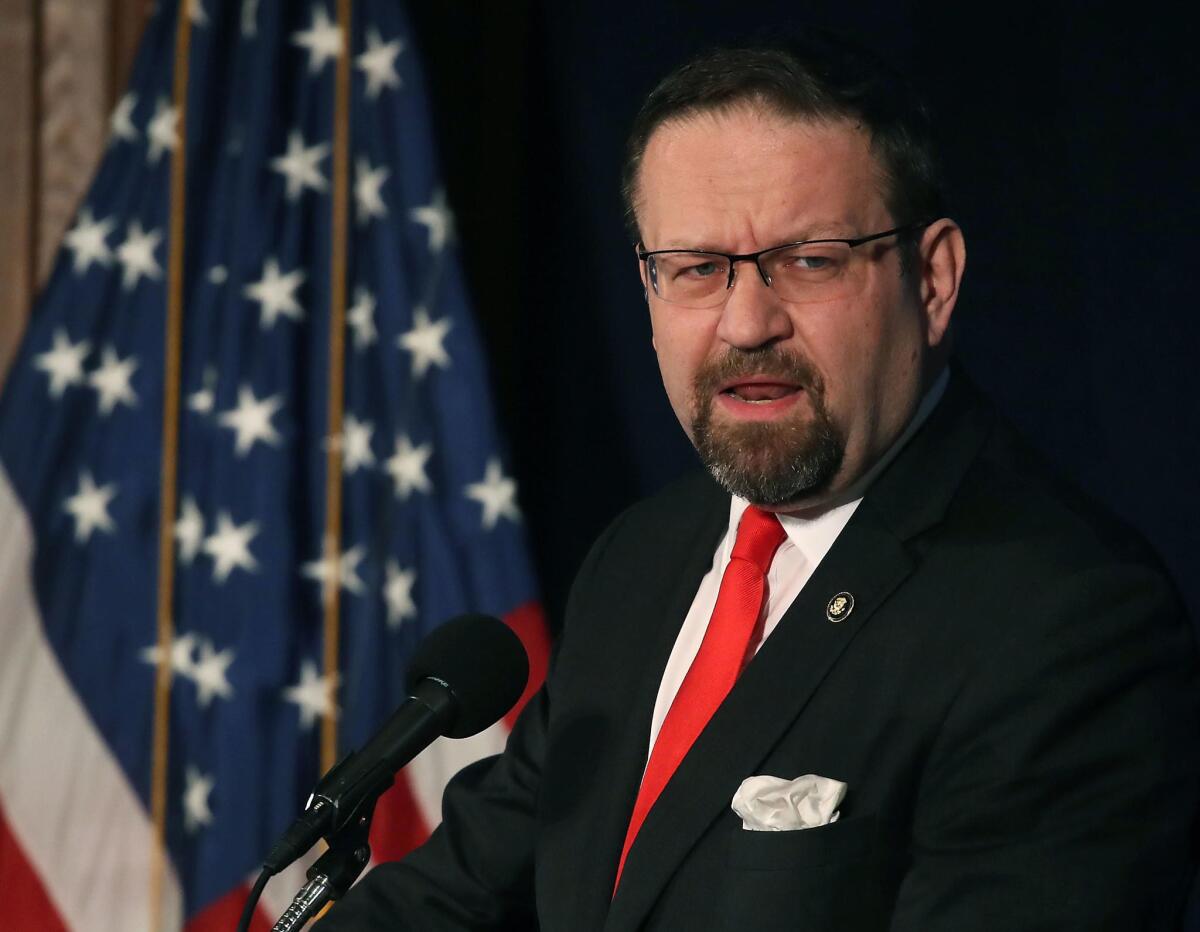
White House national security aide Sebastian Gorka has resigned from his position, according to the Associated Press.
A White House official, however, says Gorka did not resign but “no longer works at the White House.”
That official was not authorized to discuss the matter publicly and spoke on condition of anonymity.
Gorka is declining to discuss the reasons he has left the White House, but is pointing to excerpts from his resignation letter that were posted Friday evening by the Federalist website.
Gorka wrote that “the individuals who most embodied and represented the policies that will ‘Make America Great Again,’ have been internally countered, systematically removed, or undermined in recent months.”
Gorka’s departure comes a week after the exit of chief strategist Stephen K. Bannon from the White House.
6:25 p.m.: This story was updated with more information on the circumstances of Gorka’s resignation.
This story was originally posted at 6:12 p.m.
- Share via
Trump under pressure to end deferred deportations for ‘Dreamers’
Hard-liners in the Trump administration appear to be trying to pressure President Trump to stop an Obama-era program that has granted work permits to thousand of people who entered the country illegally as children.
Officials this week have met to prepare options for Trump that range from ending the Deferred Action for Childhood Arrivals program immediately to phasing it out by ending renewals of the two-year work permits, allowing them to expire over time.
The president promised to end DACA during his campaign last year. But he has refused since January to sign a draft executive order to halt the program.
The deferred-action program protects more than 750,000 people, known as Dreamers, from being deported.
Trump now is facing additional pressure from 10 Republican state attorneys general, from heavily Republican states, who have pledged to sue the Trump administration if the president doesn’t roll back the DACA program by Sept. 5.
U.S. Atty. Gen. Jeff Sessions, a hard-liner on immigration, is in favor of ending DACA. He has signaled internally that he would be reluctant to have Justice Department attorneys defend the program in court.
White House aides in favor of tighter immigration restrictions have privately hoped the litigation against DACA would move forward and provide a way to end protection for “Dreamers” while shielding Trump from the blowback of simply ending the program.
White House Press Secretary Sarah Huckabee Sanders refused to say Friday if Trump was close to ending DACA.
“The administration has indicated several times before that the DACA program is under review,” Sanders said. “It continues to be under review.”
Acting Secretary of Homeland Security Elaine Duke and Sessions discussed DACA with officials at the White House in a meeting Thursday, an administration official said, speaking on condition of anonymity to describe internal deliberations.
That followed a Monday meeting at Homeland Security between Duke and Thomas Homan, the acting head of Immigration and Customs Enforcement, the official said.
Since taking office, Trump has shown sympathy for people brought to the country illegally as children, a view encouraged by his daughter Ivanka Trump.
In recent months, he has indicated repeatedly he wouldn’t put recipients of the work permits in jeopardy of being removed from the country.
In April, Trump said in an interview with the Associated Press that people protected from deportation under DACA could “rest easy.”
- Share via
Trump orders Pentagon to reinstate ban on transgender people in the military
President Trump has directed the Pentagon to “return to the long-standing policy and practice” barring military service by transgender individuals, guidance that the Pentagon previously said was needed before it could act on the president’s Twitter messages on the issue.
The three-page memorandum allows Defense Secretary James N. Mattis to determine whether self-declared transgender members of the military can continue to serve.
The guidance reverses a year-old Obama administration policy that ended a ban on transgender people in the armed services and the Coast Guard, which comes under the Homeland Security Department. It gives those departments until Jan. 1 to implement the policy.
Trump’s memo also directs the Pentagon to stop providing sex-reassignment surgical procedures for military personnel – unless it would hurt the person in the midst of transition.
“In my judgment, the previous administration failed to identify a sufficient basis to conclude that terminating the departments’ long-standing policy and practice would not hinder military effectiveness and lethality, disrupt unit cohesion, or tax military resources, and there remain meaningful concerns that further study is needed to ensure that continued implementation of last year’s policy change would not have those negative effects,” Trump wrote.
He said he therefore had decided to return to the policy that was in place prior to June 2016, when President Obama changed it.
The guidance follows Trump’s announcement on Twitter in June that the military “will not accept or allow” transgender service members “in any capacity.”
The Pentagon was caught flat-footed by the tweets. Top U.S. commanders publicly said there would be no change until the White House issued formal guidance.
Defense officials and White House have worked to draw up the guidance so the Pentagon could reverse course on allowing transgender individuals into the military in such a way that the changes would stand up in court.
House Minority Leader Nancy Pelosi condemned the decision Friday.
“Prejudice, not the national defense, is behind President Trump’s cruel decision to kick transgender troops out of the military,” she said in a statement.
She said that a study commissioned by the Defense Department had found the cost of providing medical care for transgender troops would be miniscule.
“In fact, every year, the Pentagon spends five times more on Viagra than they would for transition-related care,” she said.
Trump, she added, “should have more respect for the transgender men and women who had the patriotism and bravery to serve our country in uniform.”
Trump’s declaration drew rebuke from many war veterans and LGBT advocacy groups, who vowed to challenge the president in federal court if self-identified transgender service members were forced out of the military.
A federal lawsuit was filed on Aug. 9 on behalf of five transgender service members who seek to block implementation of the ban while the suit proceeds.
Attorneys representing those service members from the National Center for Lesbian Rights and GLBTQ Legal Advocates and Defenders called Trump’s memo “shameful.”
“Our military is strongest when all people who are fit to serve have the opportunity to do so,” Jennifer Levi, GLAD Transgender Rights Project Director, said in a statement. “This unprecedented policy amounts to a purge of qualified, contributing troops, and will serve only to undermine unit cohesion and weaken military readiness.”
Several powerful Republican lawmakers — including Sens. John McCain of Arizona, Richard C. Shelby of Alabama and Orrin G. Hatch of Utah — expressed outright opposition, suggesting the policy might get slow-rolled in hearings and studies.
The White House memo says the Pentagon should submit final plans on implementation to the White House by Feb. 21.
The document is addressed to the Department of Defense and the Department of Homeland Security. The Army, Navy, Air Force and Marine Corps fall under Defense, while the Coast Guard is part of Homeland Security.
The Pentagon keeps no figures on transgender personnel in the military. Outside groups estimate there are between 1,300 and 15,000 transgender troops in the military, which has an active-duty force of about 1.3 million.
- Share via
Trump will monitor Hurricane Harvey from Camp David, may visit Texas early next week
The White House is considering having President Trump declare a federal emergency before Hurricane Harvey makes landfall on the Gulf Coast, officials said Friday, to assure that state and local responders have adequate resources.
The potentially devastating storm is confronting Trump with the first natural disaster of his administration, posing a test of leadership and governing competence at a time when he is being widely criticized on that score, even within his own party.
Trump departed the White House on Friday afternoon for a weekend at Camp David in Maryland after being briefed by officials from the Federal Emergency Management Agency and the Department of Homeland Security, along with other emergency management officials.
Aides said Trump’s main questions were whether emergency responders had what they need to protect residents in Texas, Louisiana and anywhere else in the storm’s path that could experience the torrential rains projected for days in its aftermath.
“This is right up President Trump’s alley,” Tom Bossert, the Homeland Security advisor, said at a news briefing.
“His questions were: Are are you doing what it takes to help the people,” he said. “What we’ve done has gotten a lot better as a government.”
The administration is especially mindful of the slow and bungled response of the George W. Bush administration to Hurricane Katrina in 2005. Questions of competence raised by that episode hobbled President Bush for the remainder of his term.
Longtime Sen. Charles Grassley (R-Iowa) warned Trump in a morning tweet, “keep on top of hurricane Harvey dont mke same mistake Pres Bush made w Katrina.”
As Trump strode to his helicopter for the departure to Camp David, reporters shouted to ask what message he had for those in Texas; Trump said either “Be strong” or “Be safe” — the words were unclear over the noise of the helicopter. With him were his wife, son Barron, daughter Ivanka and son-in-law Jared Kushner and their three children.
The president will be able to monitor the situation from the weekend retreat, aides said, and might address the nation later.
Trump is likely to visit Texas early next week, said Press Secretary Sarah Huckabee Sanders.
Federal officials urged Gulf Coast residents not to ignore advice from local authorities, including evacuation orders. Bossert warned that residents may be unaware of planned road closures or lane reversals if they depart too late, and that delays could endanger their lives and responders.
“You have nothing to lose but your life,” Bossert said. “So I want you to take it seriously. If they’re telling you to evacuate and do it now, listen to their advice.”
Bossert also sought to reassure immigrants who are in the region if they or family members are in the country illegally. Concerns have been raised that they may fear evacuating on routes near border control checkpoints, or avoid taking refuge in shelters at a time when the Trump administration is aggressively pursuing deportations.
Bossert insisted that immigrants would be safe.
“People shouldn’t be fearful of going to a shelter,” he said. “That’s not a problem.”
To Americans far from the storm, going about their summer weekends, Bossert had a separate message: “Let’s say a little prayer for those who are affected.”
- Share via
U.S. imposes tough economic sanctions on Venezuela
The Trump administration on Friday slapped sweeping financial sanctions on Venezuela, barring banks from any new financial deals with the government or state-run oil giant PDVSA.
The sanctions Trump signed by executive order are bound to dramatically escalate tensions between Venezuela and the U.S. and exacerbate the country’s economic crisis.
The White House said in a statement that the measures “are carefully calibrated to deny the [President Nicolas] Maduro dictatorship a critical source of financing to maintain its illegitimate rule, protect the United States financial system from complicity in Venezuela’s corruption and in the impoverishment of the Venezuelan people, and allow for humanitarian assistance.”
The new actions prohibit dealings in new debt and equity issued by the government of Venezuela and its state oil company. It also prohibits dealings in certain existing bonds owned by the Venezuelan public sector, as well as dividend payments to the government of Venezuela.
- Share via
Trump again bashes the Republican leaders in Congress he needs to pass his agenda
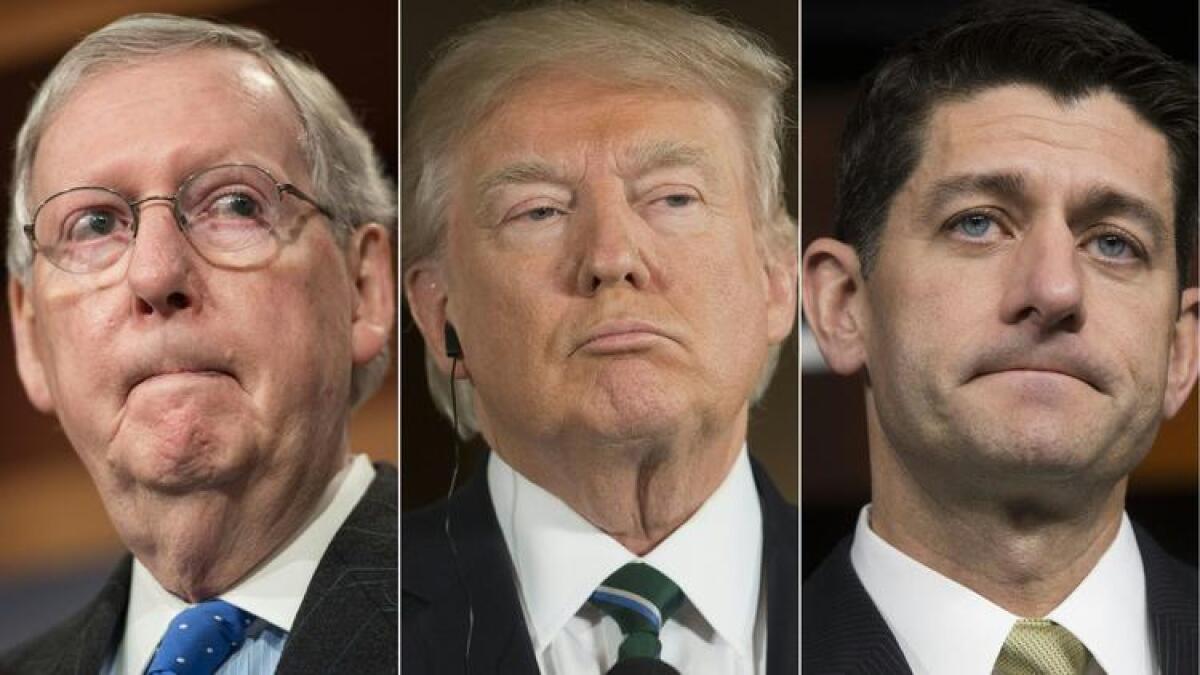
Senate Majority Leader Mitch McConnell (R-Ky.) tends toward restraint in public comments, but his observation that President Trump, as a newcomer to politics, had “excessive expectations” about the legislative process provoked an unexpected war with the White House that shows no signs of easing.
Trump, in tweet after scalding tweet, has turned on McConnell, attacking the Republican Senate leader — and at times House Speaker Paul D. Ryan (R-Wis.) — in a relentless barrage that continued Thursday, long after each sides’ offices had tried to put the matter to rest by pledging to work together on shared GOP priorities.
The outbursts from the president have not only driven a wedge between the White House and its Capitol Hill allies, but they have also exposed the limits of the president’s understanding of how to interact with Congress and how the legislative branch works.
In many ways, Trump’s escalating retorts have only proven McConnell’s initial criticism correct.
- Share via
Former CIA agent starts crowdfunding campaign to buy Twitter in order to kick Trump off
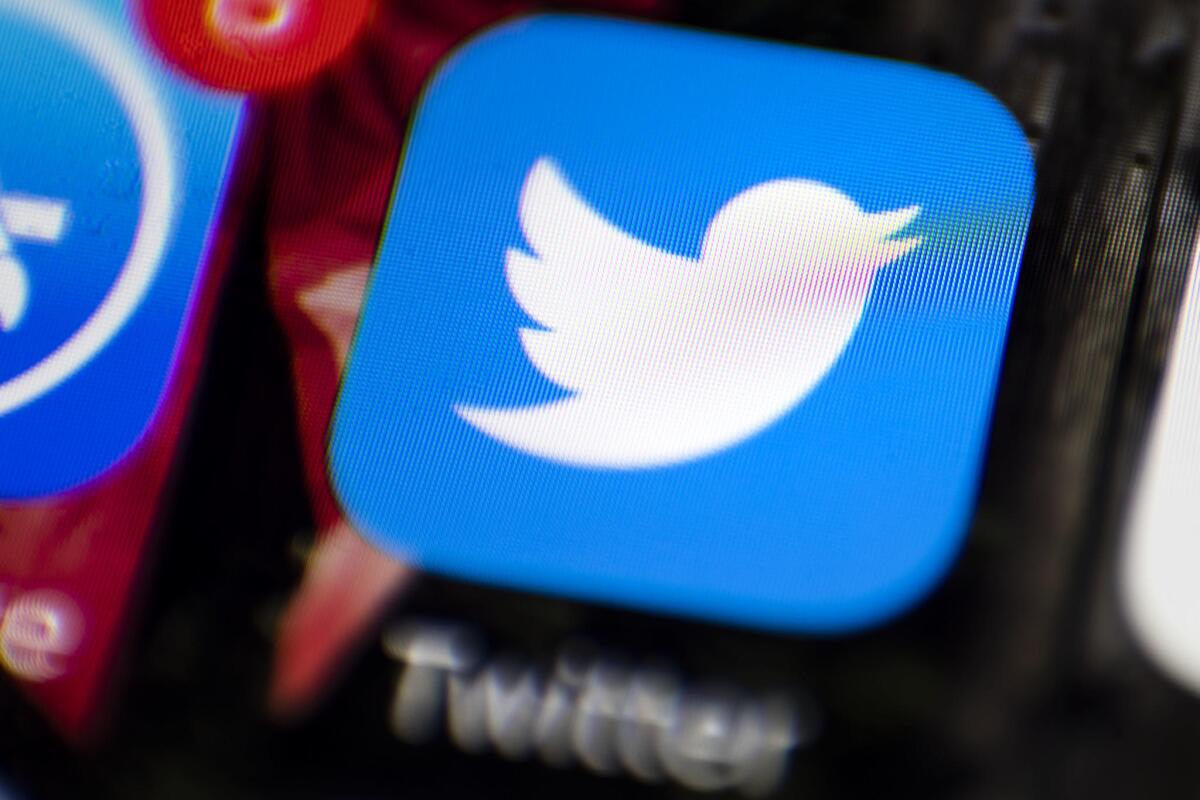
Former undercover CIA agent Valerie Plame Wilson is looking to raise enough money to buy Twitter so President Trump can’t use it.
Wilson launched the crowdfunding campaign last week, tweeting: “If @Twitter executives won’t shut down Trump’s violence and hate, then it’s up to us. #BuyTwitter #BanTrump.” The GoFundMe page says Trump’s tweets “damage the country and put people in harm’s way.”
As of Friday morning, she had raised about $63,000 of the $1-billion goal.
In an emailed statement, White House Press Secretary Sarah Huckabee Sanders said the low total shows that the American people like Trump’s use of Twitter.
“Her ridiculous attempt to shut down his 1st Amendment is the only clear violation and expression of hate and intolerance in this equation,” the statement read.
The 1st Amendment, however, forbids only the government from curtailing free speech; it does not obligate private companies to provide a platform for users to say whatever they want.
Wilson wrote on the GoFundMe page that she hopes to raise enough money to buy a controlling interest of Twitter Inc. stock. If she doesn’t have enough to purchase a majority of shares, she said, she will explore options to buy “a significant stake” and champion the proposal at Twitter’s annual shareholder meeting.
- Share via
Gary Cohn publicly criticizes Trump’s Charlottesville response and reportedly came close to resigning over it
Top White House economic advisor Gary Cohn publicly criticized President Trump’s response to the violence in Charlottesville, Va., and reportedly came close to resigning over it.
In his first public comments on the matter, Cohn told the Financial Times in an interview published Friday that the Trump administration “can and must do better in consistently and unequivocally condemning” white supremacists, neo-Nazis and the Ku Klux Klan.
Cohn, who is Jewish, plays a key role in the administration and his departure would be a blow to Trump’s economic agenda. In addition to directing the White House National Economic Council, the former Goldman Sachs Group Inc. executive is helping lead the administration’s push to overhaul the tax code.
Trump also has said he’s considering nominating Cohn to chair the Federal Reserve. The four-year term of Fed Chairwoman Janet L. Yellen expires in February.
Cohn stood by Trump’s side during an impromptu news conference in New York last week in which the president said there were “some very fine people” marching alongside neo-Nazis in Charlottesville.
Cohn said he had “come under enormous pressure both to resign and to remain in my current position.”
The New York Times reported Friday that Cohn had seriously considered resigning and even drafted a resignation letter, citing two unnamed people familiar with the draft.
But Cohn said he was not leaving his White House job.
- Share via
Trump foes, questioning his mental fitness, are citing the 25th Amendment. So how does that work?
Is President Trump crazy?
Not can-you-believe-he-really-said-that? crazy. Certifiably-mentally-unfit-to-serve-as-president crazy.
It’s an outlandish assertion — insulting, really — and a measure of the antipathy of Trump’s critics that some, including members of Congress, have seriously raised the subject. Which brings us to the 25th Amendment.
Born of the Cold War and enacted after the assassination of President Kennedy, the language amounts to a bit of technical housekeeping appended to the Constitution. It outlines the presidential line of secession, including procedures in the event, as the amendment states, the chief executive “is unable to discharge the powers and duties of his office.”
With impeachment of Trump an exceeding long shot — given the GOP’s firm grip on Congress — a small chorus of Democrats has suggested an even less likely antidote to a presidency they cannot and will not abide: removing Trump on the grounds he is mentally unsound.
- Share via
White House calls GOP Sen. Corker’s criticism of Trump ‘ridiculous and outrageous’
Sen. Bob Corker ventured further than most Republicans in Congress who’ve criticized President Trump when he suggested recently that Trump had not shown the “stability” or “competence” needed in the White House.
Yet Trump, who has taken to Twitter to lambaste other Republican Senate leaders, initially kept quiet about Corker, an ally who was once under consideration to be secretary of State.
On Thursday, Trump’s press secretary did not hold back.
Asked about Corker’s criticism, Sarah Huckabee Sanders said, “That’s a ridiculous and outrageous claim and doesn’t dignify a response from this podium.”
By Friday, Trump weighed in with his own tweet calling Corker’s statement “strange considering that he is constantly asking me whether or not he should run again in ’18.”
The Tennessee senator’s striking critique of the president, which has been replayed repeatedly on cable television, and now the White House’s rebuke of him, captured as well as anything the disintegrating relationship between Trump and his party in Congress.
Corker, chairman of the Foreign Relations Committee, may have felt more at liberty to speak up last week, in the aftermath of Trump’s much-criticized response to a violent white supremacist rally in Charlottesville, in part because he has maintained a relationship with the president.
Their ties also may explain Trump’s apparent reluctance to tweet against Corker afterward, and his willingness to let his press secretary fire back instead.
Sanders’ reprimand of Corker was itself remarkable, and perhaps was a warning to others. Rarely has a White House aide so publicly attacked a senator of the president’s own party. Corker, moreover, is up for reelection next year.
Updated 9:10 a.m.: This article was updated to include the president’s reaction on Twitter on Friday.
- Share via
Israeli and Palestinian leaders meet separately with Trump son-in-law and advisor, Jared Kushner
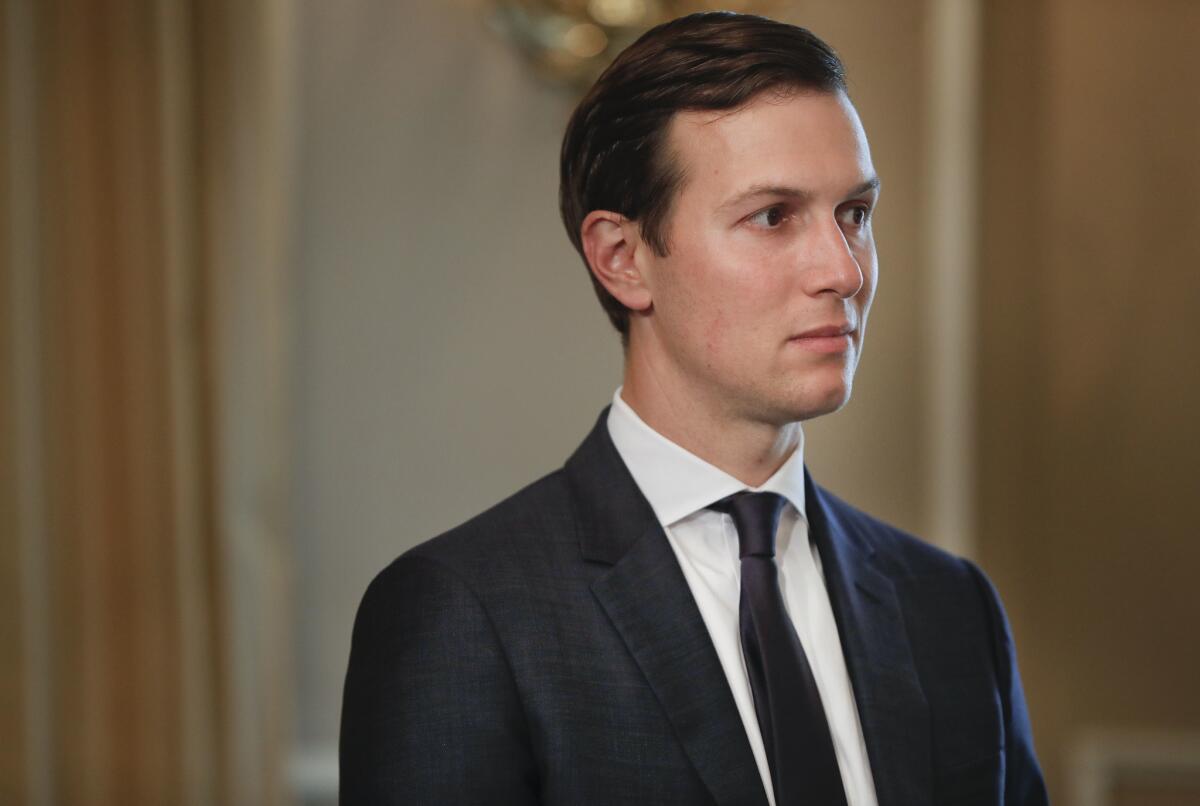
Israeli Prime Minister Benjamin Netanyahu met Thursday with President Trump advisor and son-in-law Jared Kushner, who arrived in Jerusalem to try to restart stalled peace talks between Israelis and Palestinians.
Later, Kushner and his delegation headed to Ramallah in the West Bank to meet with Palestinian leaders including Palestinian Authority President Mahmoud Abbas.
Kushner led a delegation including special envoy Jason Greenblatt, Ambassador to Israel David Friedman and Dina Powell, deputy national security advisor for strategy.
Netanyahu, who has known Kushner since he was a teenager, received the U.S. delegation in Jerusalem.
“I’m very pleased to see you again, Jared,” he said. “We have a lot of things to talk about: how to advance peace, stability and security in our region, prosperity too. And I think all of them are within our reach.”
According to a statement issued by Netanyahu’s office, Kushner said, “The president is very committed to achieving a solution here that will be able to bring prosperity and peace to all people in this area, and we really appreciate the commitment of the prime minister and his team to engaging very thoughtfully and respectfully in the way that the president has asked them to do so.”
“The relationship between Israel and America is stronger than ever, and we really thank Prime Minister Netanyahu for his leadership and his partnership.”
Netanyahu’s office issued a news release saying “the talks were constructive and substantive and the prime minister looks forward to continuing those discussions in the weeks ahead.”
Before the start of the meeting Trump posted a message to Netanyahu on social media: “There is no doubt that our relationship with you is stronger than ever! See you soon.”
- Share via
In a series of morning tweets, Trump fires at familiar targets and a new one: Former intelligence chief James Clapper
The president returned late Wednesday from a two-day trip to the West and was back on Twitter first thing this morning, going on the attack against Republican leaders.
The tweets about the Senate majority leader came in as McConnell offered mostly praise for the administration in a speech at the Kentucky Farm Bureau’s annual ham breakfast, CNN reported.
Trump also attacked the media, and Democrats — again:
He also fired back at the former director of national intelligence under President Obama, James R. Clapper, who this week on television called Trump’s caustic remarks at a Phoenix rally “scary” and questioned his fitness to serve and to have power over the nation’s nuclear codes.
- Share via
White House reportedly will send guidance to the Pentagon on military transgender ban
The White House is close to finishing guidelines for the Pentagon to implement President Trump’s call for banning transgender people from military service, according to media reports.
The Wall Street Journal reported on Wednesday that the guidelines were in the “final stage,” though the policy could still change. The paper cited an unnamed senior administration official.
Trump announced his ban on Twitter last month, writing that transgender people would be prohibited from serving “in any capacity” in the military.
Contrary to Trump’s claim in his tweet, military leaders were blindsided by his posting for a ban. In an unusual show of independence, they declined to carry it out without more specific guidance from the commander in chief.
Following the president’s unorthodox announcement, Marine Gen. Joseph F. Dunford Jr., chairman of the Joint Chiefs of Staff, issued a memo saying there would be “no modifications” to the Obama-era policy unless a directive was issued through proper channels.
- Share via
Again breaking ground, Trump takes the permanent campaign to new heights
The permanent campaign has been a fixture of the modern presidency for more than a generation — ever since Jimmy Carter, eyeing reelection, shucked his suit coat in favor of a more casual cardigan.
But President Trump, in yet another break with convention, has scaled new heights when it comes to politicizing and, especially, personalizing the workings of the White House.
Unabashedly proclaiming his desire for a second term, Trump filed the paperwork establishing his 2020 reelection committee the day he took office and has already started fundraising, years before his predecessors began raking in cash.
He has trampled protocol and turned explicitly nonpolitical events, like the Boy Scouts’ national jamboree, into replicas of his roisterous campaign stops.
Perhaps most significantly, Trump has transformed the bully pulpit — the president’s ability to rally the country in pursuit of his goals — into a sort of vanity project, staging events not to advance any substantive agenda but to vent and, as aides admit, bask in the adulation of supportive audiences.
- Share via
Joe Arpaio appreciates Trump’s hint of a pardon, but the ex-sheriff’s opponents are not impressed

The words of President Trump, spoken to a roaring crowd at a campaign-style rally here, came as sweet relief to Joe Arpaio, who was at home watching on television.
“Was Sheriff Joe convicted for doing his job?” the president said to heavy applause Tuesday night at the Phoenix Convention Center.
“I’ll make a prediction,” Trump added. “I think he’s going to be just fine.”
It was a clear indication from Trump that he plans to pardon Arpaio, the former sheriff of Maricopa County who was convicted last month of criminal contempt for flouting a judge’s orders to stop racial profiling.
- Share via
Don’t forget about coal, new Energy Department report says

Coal should remain an important source of electricity in the U.S. despite the growth of renewable energy, the federal government has recommended in a highly anticipated report commissioned by Energy Secretary Rick Perry.
Clean energy advocates feared that the overdue report, which was produced by experts at the Energy Department and national laboratories and released Wednesday night, would be slanted to undercut the push to phase out fossil fuels in favor of solar, wind and other renewable energy sources.
On that front, the report was a mixed bag.
It notably undercut a central premise of President Trump’s energy agenda: that the coal industry be resuscitated by slashing regulations.
The blame for coal’s decline rests with the low price of natural gas, a cleaner alternative.
“The biggest contributor to coal and nuclear plant retirements has been the advantaged economics of natural gas-fired generation,” the report says.
But the report also recommends that more be done to increase the reliability of the U.S. electricity grid because the growing solar and wind industries produce power only when the sun shines or the wind blows.
That conclusion upset some clean-energy advocates.
“This report seriously overstates the challenges associated with new energy resources,” said Graham Richard, CEO of Advanced Energy Economy, an association of clean energy companies.
Because coal plants can generate power constantly, the report says they should be valued as a reliable contributor to the electricity grid. It also says the federal government should loosen regulations for power plants, including coal.
Don Furman, who leads a campaign seeking more clean energy cooperation among Western states, said the recommendations were misplaced. He noted that coal plants have been shutting down without problems maintaining the electricity grid.
“If those plants were needed for reliability, then why didn’t the lights go out when they retired?” he said.
Perry said in a letter that the report would provide “the starting point for an important conversation.”
“We must utilize the most effective combination of energy sources with an ‘all of the above’ approach to achieve long-term, reliable American energy security,” he wrote.
Michael Wara, a Stanford environmental law professor, called the report a “very balanced response” to Perry’s “very unbalanced request” for an analysis of how regulations were hurting dirtier sources of energy.
- Share via
Trump calls for healing ‘the wounds that divide us’
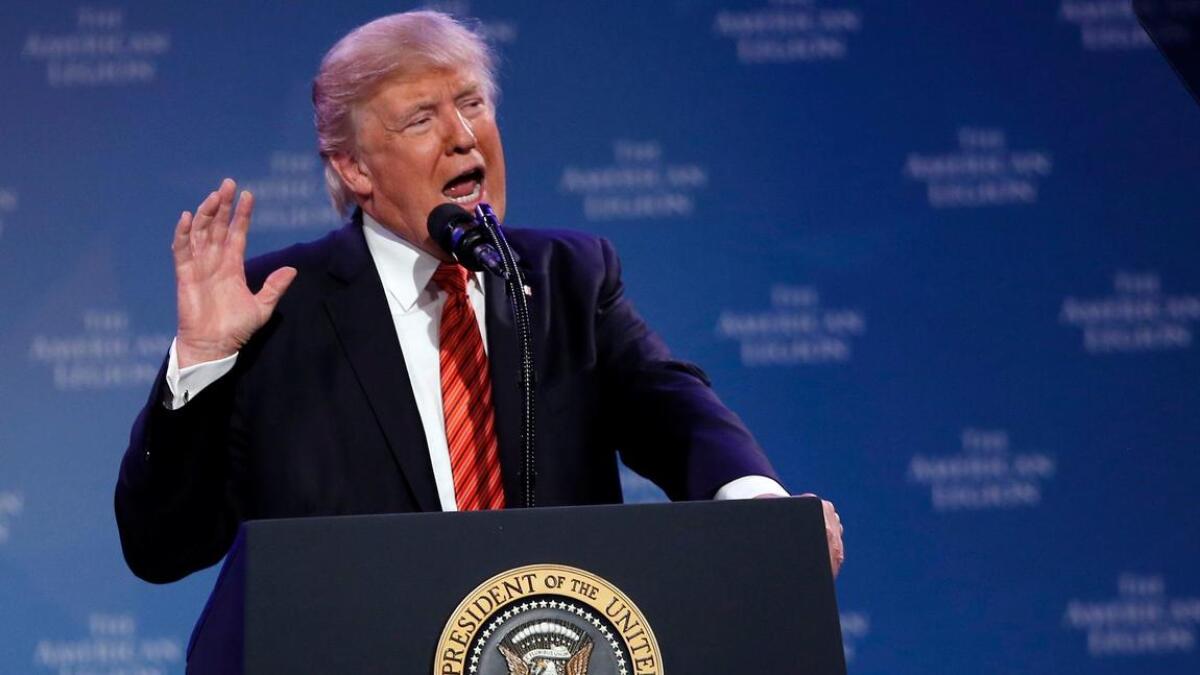
A day after stoking the nation’s racial tensions at a political rally in Phoenix, President Trump set aside his anger and called for healing “the wounds that divide us.”
“We are not defined by the color of our skin, the figure on our paycheck or the party of our politics,” Trump told an American Legion convention Wednesday in Reno. “We are defined by our shared humanity, by our citizenship in this magnificent nation and by the love that fills our hearts.”
Trump’s subdued speech, read from a teleprompter, contrasted sharply with his ad-libbed tirade Tuesday night in Phoenix, where he told cheering supporters that the news media had misreported his reaction to the recent deadly violence at a neo-Nazi and white supremacist protest in Charlottesville, Va.
- Share via
McConnell pushes back on reports of discontent with Trump; Ryan doubts shutdown over border wall
Senate Majority Leader Mitch McConnell on Wednesday sought to dispel reports of a deteriorating relationship with President Trump, insisting they remain in “regular contact” over shared Republican Party goals.
Issuing such a statement was uncharacteristic for the GOP leader. The quiet Kentuckian rarely responds publicly to Beltway banter, especially stories about political intrigue and intraparty fighting.
But a report in the New York Times, which said the two men had not spoken since Trump berated McConnell in a phone call earlier this month after the collapse of the healthcare bill, provoked a response. The report also said Trump complained that the Senate leader was not doing enough to shield the president from the Russia investigation. The call, made from the president’s golf resort in Bedminster, N.J., reportedly devolved into a profane shouting match.
“The president and I, and our teams, have been and continue to be in regular contact about our shared goals,” McConnell said in the statement.
“We have a lot of work ahead of us, and we are committed to advancing our shared agenda together and anyone who suggests otherwise is clearly not part of the conversation.”
While the two men may be patching up differences, it is clear that Republicans in Congress are no longer looking to Trump for leadership to advance their legislative agenda.
Lawmakers have come to see Trump as unwilling, or unable, to commandeer the traditional presidential role of party leader, failing to utilize the bully pulpit of the White House to power public support around the Republican agenda.
At Trump’s rally Tuesday night in Phoenix, he barely mentioned a top priority on the congressional to-do list -- tax reform -- at the end of a rambling, combative speech that mostly aired old grievances against the media and even Democrat Hillary Clinton.
Instead, Trump promised to go to the mat for federal funding for his own campaign promise, the U.S-Mexico border wall, even threatening a government shutdown for money he previously said would come from Mexico. It is not a priority widely shared by members of his party in Congress.
House Speaker Paul D. Ryan said Wednesday he saw no need for a federal shutdown over the border wall funds, which the House has already approved, as Congress works to secure the money through the fiscal year appropriation bills.
“I don’t think a government shutdown’s necessary and I don’t think most people want to see a government shutdown, ourselves included,” Ryan told reporters at an event in Oregon.
Republicans, who have the majority in Congress, desperately want Trump to help shape their legislative initiatives and bring his hardcore supporters behind their goals.
But they have resigned themselves to the new political reality that Congress must take the lead for an isolated president.
Lawmakers are typically wary of criticizing Trump given his willingness to turn on those in his own party, but many have become more emboldened. They had almost no choice but to speak out after the white supremacist rally in Charlottesville, when Trump suggested the supremacists and those protesting them were equally to blame for the violence. Some Republicans were willing to create distance from Trump for the first time.
McConnell’s office did not respond to a request to clarify when the leader and president last spoke directly.
Sensing the fallout, the White House also pushed back, dismissing reports of the disintegrating relationship, according to talking points being circulated.
“We’re not going to get into the president’s private conversations,” said a statement from the White House. “He looks forward to signing legislation that reforms our tax code, invests in rebuilding our military and constructs a border wall, all goals Senate Republicans share.”
3:30 p.m.: This story was updated to include Ryan’s comments.
- Share via
Lots of noise, no fireworks, at Trump protest in Reno
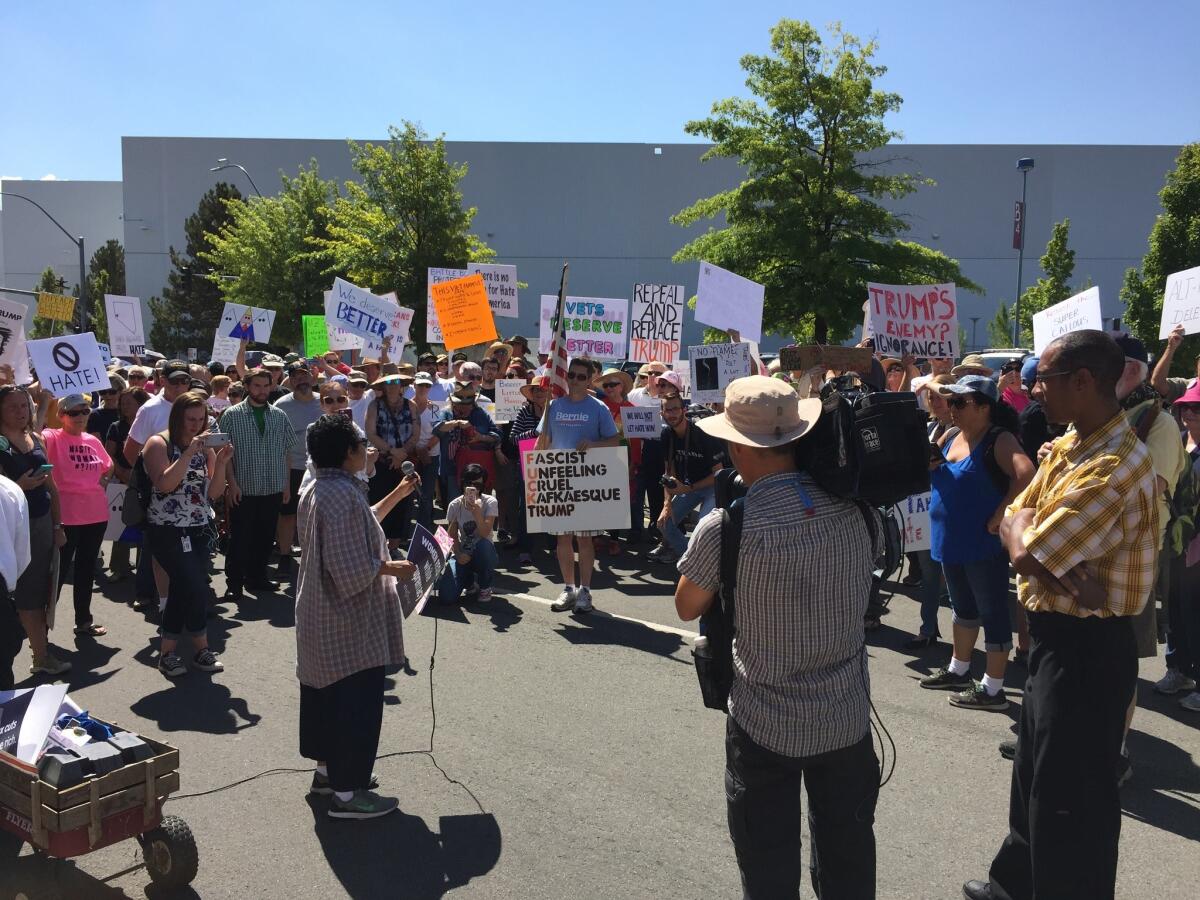
Just over 1,000 angry, boisterous, yet largely peaceful protesters on Wednesday welcomed President Trump to Reno, a city thankful to be spared the kind of clashes that erupted the day before during the president’s visit to Phoenix.
The protests on the streets outside the Reno-Sparks Convention Center broke up just under two hours after Trump’s relatively concise speech at the American Legion convention, with police reporting no arrests of serious incidents or any kind.
“I was very happy but not surprised,” Reno Police Chief Jason Soto said.
Soto said more than 100 police officers were stationed on the streets and inside the convention center, an overwhelming show of force to help keep a lid on things. Police officials also met with the main protest organizers over the past week, including Indivisible Northern Arizona, to help avoid any flare-ups, he said.
“It turned out exactly how we planned for it to turn out,” Soto said.
Anti-Trump protesters started pouring into downtown Reno around 10 a.m., an hour before Trump was scheduled to speak, and were penned in on West Peckham Lane, which had been closed off by police.
A much smaller group of pro-Trump supporters were corralled on a separate street, keeping the two sides apart.
Katie Dills clutched a Trump sign as she spent the morning screaming at protesters 20 feet away, calling them a “bunch of baby killers.”
“They believe in abortion and homosexuals, everything that is against God,” said Dills, 40, a homemaker from Reno. “Their eyes are closed to the truth. God put [Trump] there. They’re full of hate.”
Trump supporter John Franklin Smith was a little less hostile, but just as loud. Draped with an American flag, he spent a half-hour screaming at protesters.
“We just came here to support the president,” said Smith, an Army veteran from Reno. “None of us are white supremacists; none of us are Nazis. We’re American citizens.”
But Silke Pflueger, a retired engineer and member of the activist group Indivisible in Truckee, Calif., said the fervor whipped up by Trump has some disturbing similarities to what happened in her native Germany during the mid-20th century.
“I think it’s very much the same situation,” Pflueger said, and then took a jab at Trump’s “Make American Great Again” campaign slogan. “Hitler came into power to make Germany great again after World War I.”
She said her own grandparents never spoke out when Hitler rose to power, and she promised herself never to make that mistake.
Protest organizer Laynette Evans of Indivisible Northern Nevada said she doubts the protest will have much of an impact on Trump. But she said she hopes it will influence Republicans representing Nevada. That includes U.S. Sen. Dean Heller, who was a target of Trump’s wrath when he opposed the GOP’s initial effort to repeal and replace the Affordable Care Act.
“We want Trump to go,” Evans said. “We would like Heller to hear our message. He’s got to stand up.”
After Trump’s speech, Ron Abbe, an American Legion member who now lives in Puerto Vallarta, Mexico, said the president received a warm welcome inside. Abbe, a Trump supporter, didn’t mind seeing all the protests when he walked outside the hall.
“They have a right to say what they like,” said Abbe, a Marine Corps veteran. “They’re not burning flags. They’re not stepping on flags. They’re respectful.”
By early afternoon, traffic was flowing on Reno streets that had been blockaded with giant dump trucks all morning.
- Share via
Media report says U.S., Canadian diplomats in Cuba may have suffered brain damage
The mystery over why U.S. and Canadian diplomats in Cuba have developed hearing loss and other symptoms deepened Wednesday after a media report suggested they may have suffered brain damage.
Some officials believe the diplomats were injured by sonic waves from listening devices hidden in their homes or workplaces in Havana, but that has not been confirmed.
It is still not clear who planted the devices, and whether they were intended to cause harm.
“This is unprecedented,” State Department spokeswoman Heather Nauert said. “We have not seen this anywhere.”
Cuba has denied any responsibility and is cooperating with U.S. and Canadian investigators, she said.
CBS News reported Wednesday that it had reviewed medical records of some of the people affected. It said doctors had diagnosed mild traumatic brain injury and damage to the central nervous system.
The diplomats began reporting health problems, including hearing loss and dizziness, in December. Several cut short their assignments in Cuba because of the symptoms.
Secretary of State Rex Tillerson has cited the “health attacks” on diplomats but has not provided details. The State Department will not say how many Americans were affected.
- Share via
U.S. withholding aid to Egypt over human rights issues
Despite President Trump’s warm embrace of Egyptian President Abdel Fattah Sisi, the United States has held back a substantial amount of foreign aid because of the country’s human rights abuses.
State Department officials said Wednesday that around $195 million was held in abeyance and another $100 million redirected to other entities.
Egypt is the world’s second-largest recipient of U.S. aid at about $1.3 billion annually.
“We were unable to certify” that Egypt had obeyed rules of human rights and democracy, State Department spokeswoman Heather Nauert said.
The money “will be held until we see progress on democracy,” she added. She cited, among other concerns, a law in Egypt that restricts the work of nongovernmental groups that often promote democracy and human rights.
It was not surprising to anyone who has followed Egypt that the country would be found to be an egregious abuser of human rights. It was more surprising that the Trump administration, which has at times chosen to overlook human rights issues in its dealings with strategic allies, would notice and take punitive action.
When Sisi in April became the first Egyptian leader to be received at the White House since 2009, Trump praised his “great friend and ally” who was doing a “fantastic job in a very difficult situation.”
Sisi’s government has been accused of killing, jailing or torturing tens of thousands of opponents.
Egyptian officials were furious at the U.S. action on aid, and briefly refused to receive a U.S. delegation that included President Trump’s son-in-law, Jared Kushner. The meetings eventually were rescheduled and took place, U.S. officials said.
Kushner is in the Middle East as part of his effort to promote peace between Israel and the Palestinians.
Nauert said the Egyptians were not caught off guard, as some seemed to suggest, and had been informed of the U.S. decision with ample warning.
That didn’t stop their anger, however.
“Egypt sees this measure as reflecting poor judgment of the strategic relationship that ties the two countries over long decades and as adopting a view that lacks an accurate understanding of the importance of supporting Egypt’s stability,” the foreign ministry said in a statement.
- Share via
Fired FBI chief Comey joins Howard University for public policy lecture series
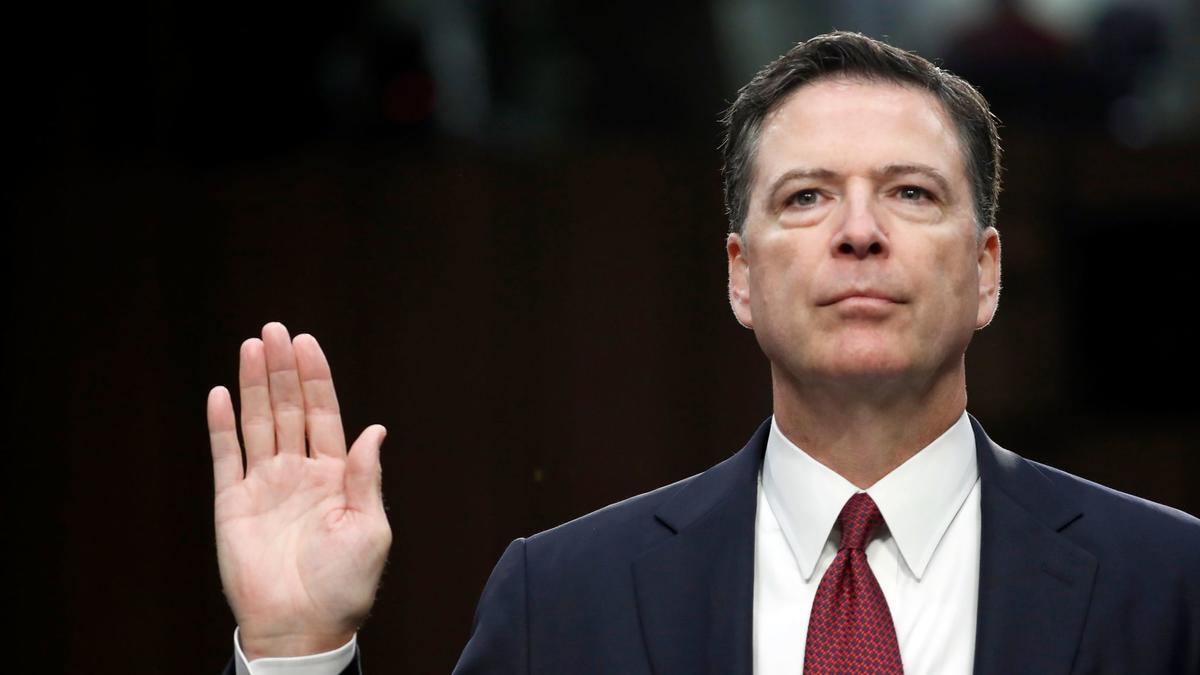
James Comey has a new gig not far from his old office atop the FBI headquarters.
Comey, who was fired as FBI chief in May, will deliver the convocation keynote address next month to students at Howard University, a historically black university in northwest Washington.
He also will give five lectures on public policy as the newly-appointed Gwendolyn S. and Colbert I. King Endowed Chair in Public Policy.
Howard will pay Comey $100,000 that he said he will donate to a scholarship fund for students from foster homes.
“Few in public life are better suited for this role than the experienced and esteemed Jim Comey,” the school said in a statement.
Comey is writing a book that is due for release next spring, but he has kept a relatively low profile since he testified before the Senate Intelligence Committee in June, a month after President Trump abruptly fired him.
In his testimony, Comey detailed five times when he said he had privately met with or spoken by phone with Trump. He said the president demanded “loyalty” from him and pressed him to end the FBI investigation of Michael Flynn, Trump’s former national security advisor.
Until his dismissal, Comey led the FBI’s investigation into Russian meddling in the 2016 election, and whether the Trump campaign had coordinated with Russian intelligence, allegations that Trump has fiercely denied.
The president’s decision to fire Comey caused such an uproar that the Justice Department appointed a special counsel, Robert Mueller III, to ensure the investigation would continue.
No word yet on what Comey will say during Howard’s convocation on Sept. 22.
- Share via
Keeping protesters cool at Trump’s Reno rally. ‘Everyone deserves water’

Ian Bigely -- yes, he’s heard the jokes -- doesn’t like Donald Trump much, and when he heard last week that the president was coming to Reno, he decided he would bring water for everyone – even supporters of the man he loathes.
“I may argue with them, but I won’t turn them down,” Bigely said. “Everyone deserves water.”
So he and Eden Gutierrez set up a stand outside the Reno-Sparks Convention Center with a sparkling jug of water filled with cucumber, lemon slices and ice. As things heated up, the line started forming for cool relief.
“How much is it?” a woman asked.
“Free,” Bigely said.
The woman -- a Trump protestor -- looked startled. And then smiled.
“How un-American,” she said before grabbing a plastic cup and disappearing into the crowd. More and more came and quenched their thirsts before heading back to the crowd gathered in the street to chant their opposition to Trump.
Bigely said they hoped to keep protestors hydrated throughout the president’s appearance and until the last person was gone. He said they had plenty of iced coffee, but the water was disappearing fast. So far, he said he hadn’t seen a Trump supporter come to take advantage of their offer.
If they, did though, he said he might not be able to risk taking a jab at them.
“I’d let them know that this water was oil-free,” he said.
- Share via
Reno streets remain fairly quiet shortly before Trump speech at American Legion convention
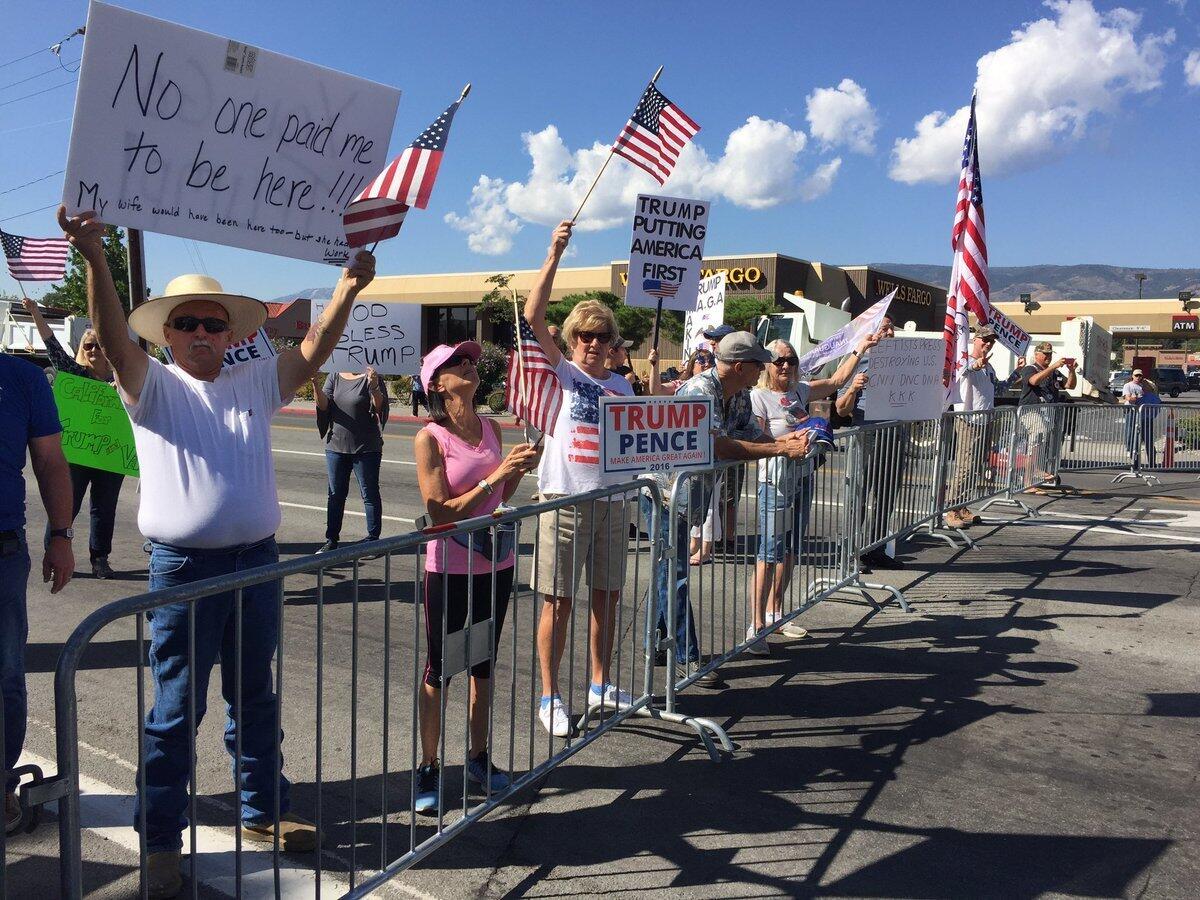
With President Trump’s speech to the American Legion convention less than an hour away, the streets of Reno remained relatively quiet Wednesday morning — nothing like the protests in Phoenix the day before.
Fewer than 100 protesters were gathered outside the Reno-Sparks Convention Center, where Trump was to deliver his address, but Reno police expect the crowd to swell to at least several hundred.
Jeffrey Mehoves, 61, a Vietnam veteran and retired deputy sheriff from Sparks, said he came out to voice his anger about Trump’s attempt to ban transgender soldiers from the military.
“I don’t believe Trump has the right to tell people they cannot serve this country, no matter if they’re gay, transgender or whatever,” Mehoves said. “Especially when he never served.”
Police used dump trucks to close the streets surrounding the convention center and used temporary barricades to keep protests away from the hall where Trump will speak. Authorities also plan to corral protesters and pro-Trump counter-protesters in separate areas to avoid any conflict.
Thus far, many protesters were denouncing Trump, shouting “No hate, not Trump” and “Impeach 45” at South Virginia Street and West Peckham Lane in the shadow of the Atlantis Casino.
American Legion members filing into the hall Wednesday morning said they had no problem with seeing people march in the streets.
“Happy protest day. That’s what we fought for,” said Tom Goodin of Jefferson City, Mo., a Marine Corps veteran who served in Vietnam.
Goodin declined to say if he voted for Trump, saying that’s his own business, but said he’s happy with the president’s record on military and veterans issues. At the American Legion convention, Trump is expected to sign reforms to improve care in the Veterans Administration healthcare system.
“As veterans, we respect and support the office,” Goodin said of the president. “I support anyone that takes care of the troops over there and veterans.”
Rick Johnson of Ft. Lauderdale, Fla., an Army tank officer who served in Iraq, said U.S. troops have been fighting in Iraq and Afghanistan far too long. Instead of increasing U.S. troops, he’d like to see America’s allies pick up the slack, he said.
“Trump’s right. We need to get other countries to help out and to finance this thing,” said Johnson, 61.
- Share via
Trump said the government is doing a ‘phenomenal job’ on illegal immigration. Not really
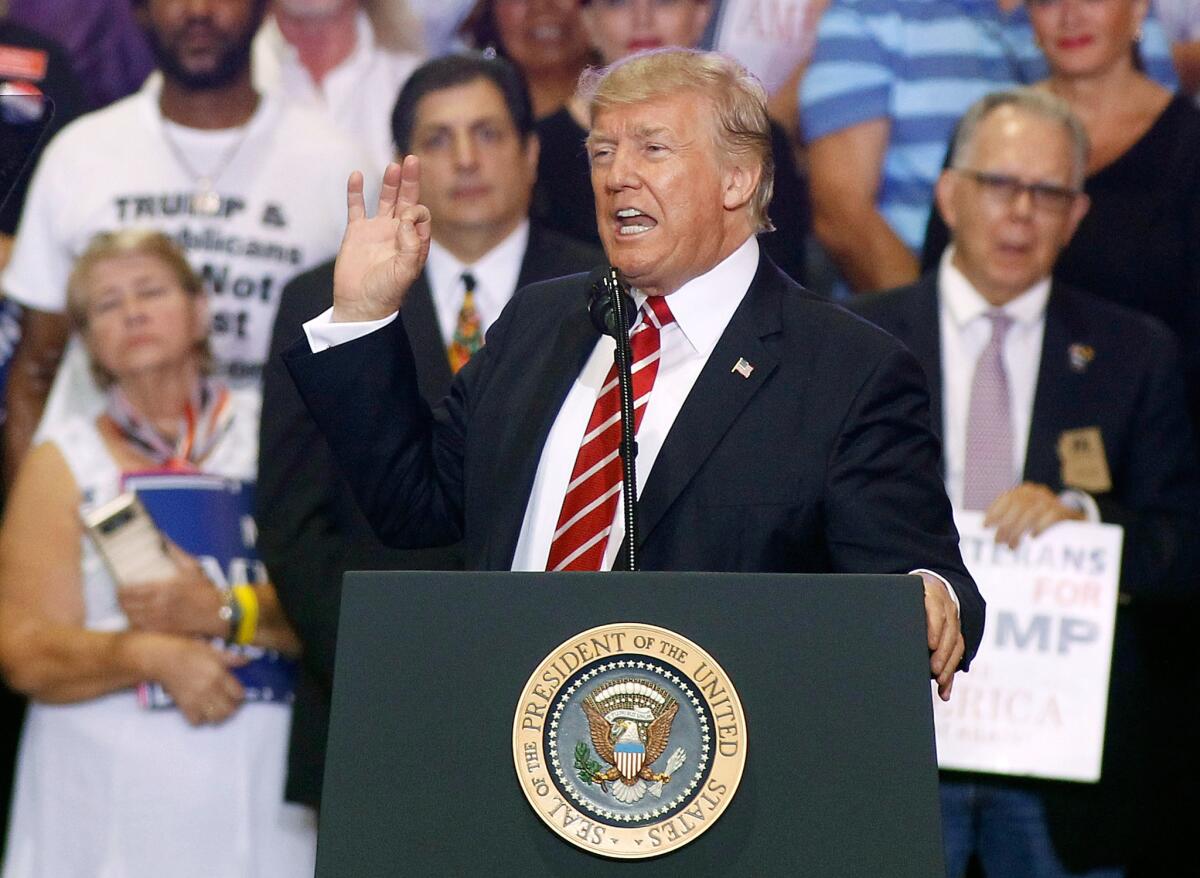
During his Tuesday night rally in Phoenix, President Trump brought up many of his campaign promises — including illegal immigration.
“We are doing a phenomenal job of putting a stop to it,” Trump told hundreds at the Phoenix Convention Center.
Actually, seven months later after Trump entered the White House, construction of his proposed wall on the U.S.-Mexico has yet to begin, the number of Border Patrol officers has dropped by 220, and immigration agents are on track to deport 10,000 fewer people this year than in President Obama’s last year in office, the latest figures show.
- Share via
U.S. credit rating at risk if debt limit is not raised in a ‘timely manner,’ Fitch warns
The United States’ credit rating is at risk if the $19.9-trillion debt limit is not raised “in a timely manner” before the Treasury runs out of cash in October, Fitch Ratings warned on Wednesday.
“Brinkmanship over the debt limit could ultimately have rating consequences, as failure to raise it would jeopardize the Treasury’s ability to meet debt service and other obligations,” Fitch, one of the three leading credit-rating companies, said after President Trump on Tuesday raised the possibility of a government shutdown over funding a Mexican border wall.
Federal spending is only authorized through Sept. 30 as Congress works to pass a new budget and faces a potential showdown over funding for the wall, which Trump had vowed during his campaign would be paid for by Mexico.
A government shutdown “would not have a direct impact” on the nation’s AAA rating, “but it would highlight how political divisions pose challenges to the budgetary process,” Fitch said.
Failure to raise the debt limit, however, would threaten that top-level credit rating, even if the Treasury Department were to try to prioritize its debt payments, Fitch said.
- Share via
‘My skin crawled’: Hillary Clinton says Trump’s debate shadowing made her want to shout, ‘Back up, you creep’
Hillary Clinton says Donald Trump’s pacing, hovering demeanor onstage during their October 2016 presidential debate made her so uncomfortable “my skin crawled.” She says in her upcoming book that Trump shadowed her so closely that she had to resist shouting out, “Back up, you creep, get away from me.”
In the book, the Democratic presidential nominee recounts her struggle to keep composed during that pivotal Oct. 9 faceoff in St. Louis, less than a month before the election. Two days earlier, their bitter campaign was rocked by the release of footage in which Trump bragged aggressively about groping women.
During the town-hall style debate, the 6-foot-3 Trump repeatedly hovered over Clinton, who’s closer to 5-foot-5, as she responded to questions.
“This is not OK, I thought,” Clinton says in her audio narration of “What Happened,” set for release Sept. 12. “It was the second presidential debate, and Donald Trump was looming behind me. Two days before, the world heard him brag about groping women. Now we were on a small stage and no matter where I walked, he followed me closely, staring at me, making faces. It was incredibly uncomfortable. He was literally breathing down my neck. My skin crawled.”
- Share via
What the record shows on whether Steve Mnuchin and Louise Linton really ‘give more to the economy’ than they took
Louise Linton, the wife of Treasury Secretary Steve Mnuchin, already has apologized for a certain nasty Instagram post aimed at a citizen who criticized her for bragging about her designer wardrobe during an official trip with her husband.
We’re not as interested in the controversy over Linton’s Instagram posts per se, one of which was a childish outburst directed at Jenni Miller, an Oregon woman who had tagged Linton’s original post as “#deplorable.” We’re more interested in Linton’s comments about the economic contributions she and her husband make.
“Have you given more to the economy than me and my husband?” Linton asked Miller. “Either as an individual earner in taxes OR in self sacrifice to your country?...Pretty sure the amount we sacrifice per year is a lot more than you’d be willing to sacrifice if the choice was yours.”
These are substantive assertions subject to factual analysis. So let’s ask: How much have the Mnuchins “given” to the economy? Are they paying their fair share of taxes? Are they sacrificing?
- Share via
Egyptian president to meet with Jared Kushner, but meeting with foreign minister is canceled
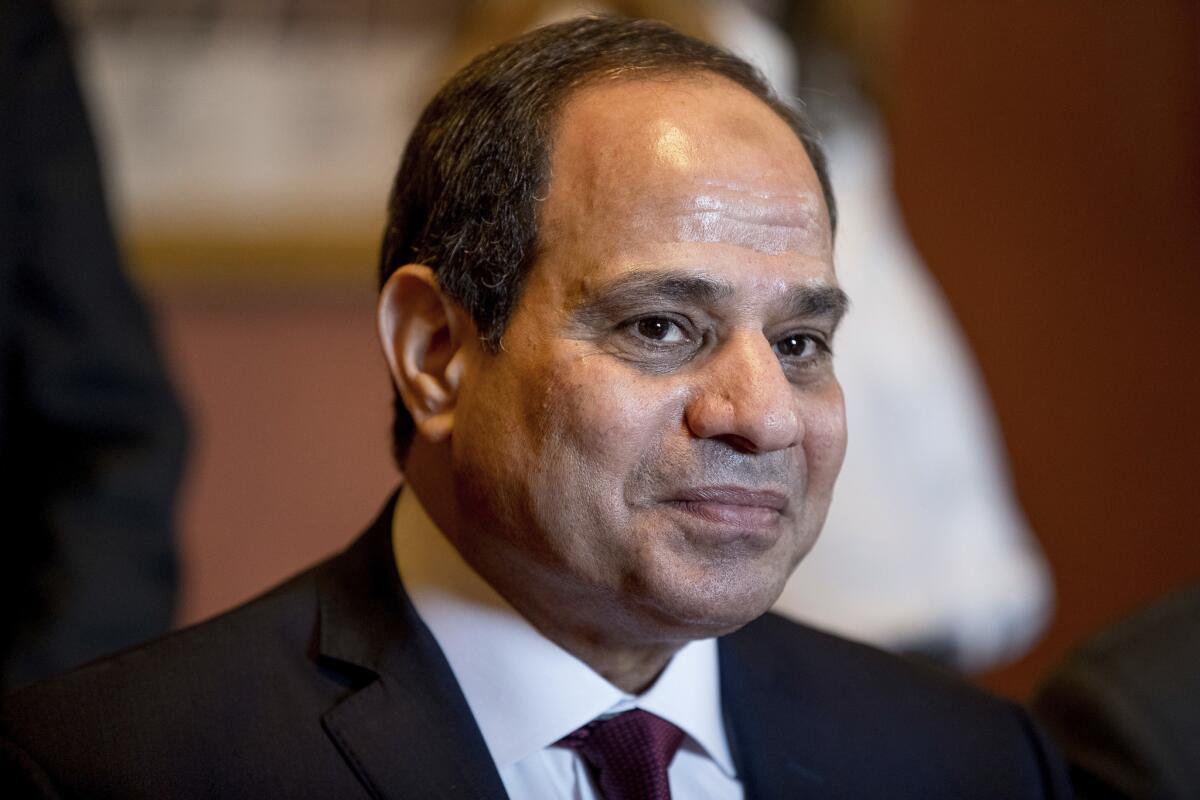
Egyptian officials said President Abdel Fattah Sisi would meet Wednesday with a U.S. delegation led by Jared Kushner, though a separate meeting with the country’s foreign minister was canceled after the Trump administration decided to withhold millions of dollars in aid.
Kushner, President Trump’s son-in-law and advisor, and others, expected to meet with Sameh Shoukry, Egypt’s foreign minister, but an updated version of Shoukry’s schedule distributed Wednesday made no mention of the meeting, with no explanation given regarding the change.
Kushner is on a Middle East tour aimed at reviving Israeli-Palestinian peace talks.
The schedule change followed a statement from Cairo indicating it regretted the U.S.’s decision to reduce funds given to Egypt.
“Egypt considers this step as a misjudgment of the nature of the strategic relations that binds the two countries over decades, and reflects the lack of understanding of the importance of supporting the stability and success of Egypt,” said the statement. “It… implies a mixing of cards that may have negative repercussions on achieving Egyptian-American common interests.”
The Trump administration on Tuesday cut almost $100 million in military and economic aid to Egypt and withheld nearly $200 million in aid.
Egypt’s military, seen as a crucial security partner by the U.S., receives $1.3 billion per year from Washington, second only to Israel. It also receives tens of millions of dollars in economic assistance.
- Share via
Trump fills Phoenix speech with charged language, accusing media and fellow Republicans of failings
As protesters massed on the streets of Phoenix, President Trump on Tuesday unleashed a vitriolic 76-minute speech mocking those who considered his response to the Charlottesville white supremacist march racist, adopting racially charged language and hinting that he would pardon former Arizona Sheriff Joe Arpaio, long accused of brutality against Latinos.
He reread for more than 16 minutes the remarks he had uttered after violence in Virginia claimed the life of a woman protesting the white supremacists, omitting the remarks in which he said that both sides were to blame and occupied the same plane in his view.
“The words were perfect,” he said.
But even as he sought to dismiss one racially fraught controversy, he ignited another with words that seemed to promise a pardon to Arpaio, who last month was convicted of contempt of court for refusing to halt his habit of stopping Latinos based solely on a suspicion that they might be living in the United States without proper papers.
- Share via
China denounces U.S. sanctions on North Korea trade
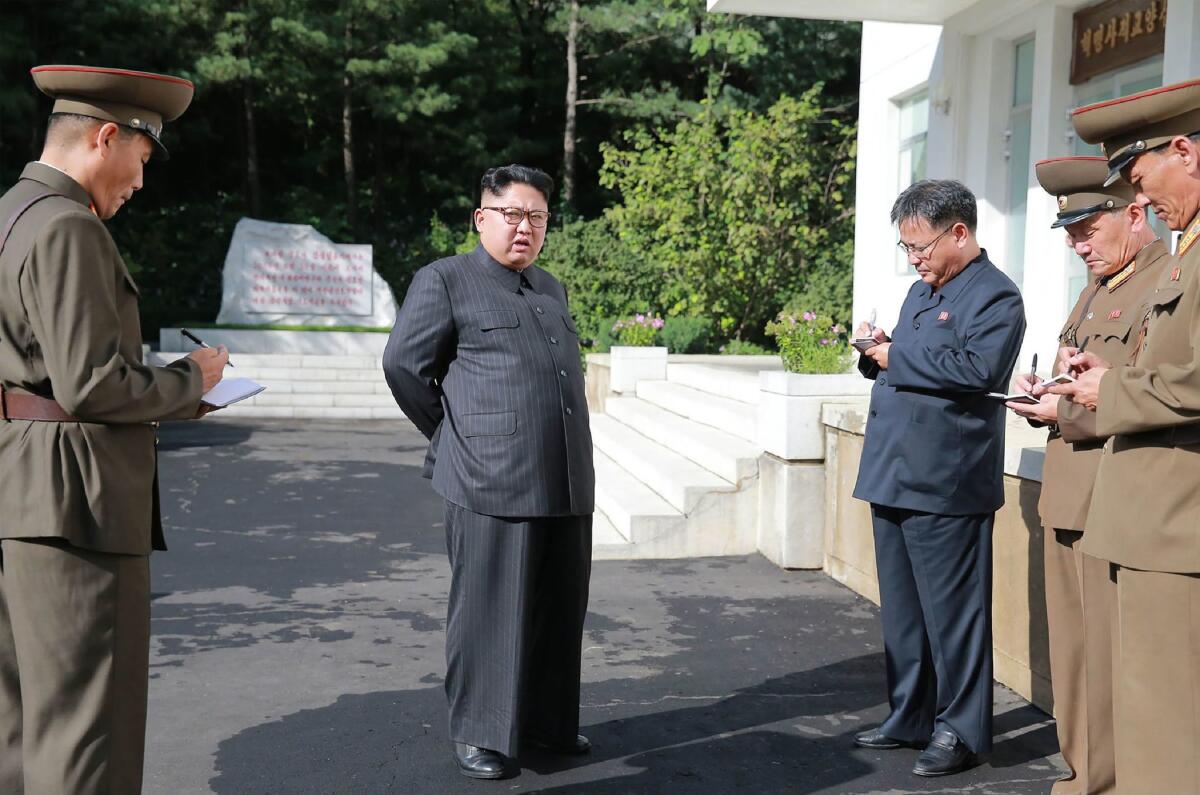
China on Wednesday denounced new U.S. sanctions linked to North Korea trade, accusing the Trump administration of “long-arm jurisdiction” that unfairly targets Chinese companies and threatens Beijing’s cooperation in reining in the rogue state.
The Treasury Department on Tuesday slapped sanctions on 10 firms and six individuals, mostly from China and Russia. U.S. officials aim to sever economic ties that allow North Korea to advance its weapons program.
“We urge the U.S. side to stop this wrongdoing and correct this immediately,” Chinese Foreign Ministry spokeswoman Hua Chunying told reporters.
The U.S. action follows a unanimous United Nations resolution last month to impose tougher sanctions on North Korea. The isolated nation recently tested its first two intercontinental ballistic missiles.
The latest sanctions largely target companies that allegedly buy or sell resources, such as coal or metals, which could aid in nuclear weapons development. A Chinese company in Africa was sanctioned for enabling the hires of North Korean workers; one in northeastern China was accused of facilitating financial transactions on behalf of North Korea’s proliferation network.
The Chinese government insisted it implements the Security Council resolutions and would punish companies that violate sanctions. Earlier this month, China suspended imports of coal, iron and lead ores, and seafood products.
China opposes unilateral sanctions outside the Security Council, Hua said, especially “long-arm jurisdiction over Chinese entities and individuals.” The U.S. actions “are not helpful in solving the problem and unhelpful to mutual trust and cooperation.”
The U.S. views China, North Korea’s economic lifeline, as key to preventing further missile development. China is responsible for about 90% of its neighbor’s international trade. And while Beijing has increased periodic bans on certain goods, its border has proved porous -- a quick drive over the Yalu River.
China fears Pyongyang’s economic collapse would trigger a refugee crisis on its border and a united, democratic Korea at its doorstep. It has repeatedly urged dialogue and negotiations.
“From the Chinese perspective, these sanctions are ridiculous because those enterprises engaged with North Korea before the Security Council resolution,” said Shi Yinhong, a professor of international relations at Renmin University in Beijing. “China will not accept this kind of punishment.”
The U.S. government has long used sanctions as a tool against the hermit kingdom’s nuclear ambitions, but the Trump administration has increased its urgency as North Korea inches closer to developing weapons capable of reaching California.
It’s unclear, once again, whether they will work. An editorial by Chen Weihua, deputy editor of China Daily’s U.S. edition, said these so-called secondary sanctions would have no effect on North Korea. Instead, they will “undermine cooperation” between the world’s two largest economies.
America’s “past track records have shown that the majority of sanctions not only failed but caused humanitarian disasters in other countries,” he said.
U.S. officials stopped short of previous threats to sanction Chinese banks, suggesting they still anticipate Beijing’s help with Pyongyang.
“Trump’s China strategy is that everything relates to China’s behavior on North Korea,” Shi said. “This could spoil the Sino-American relationship. It already has.”
- Share via
Outside Trump’s rally, thousands take to the streets in mostly peaceful protests
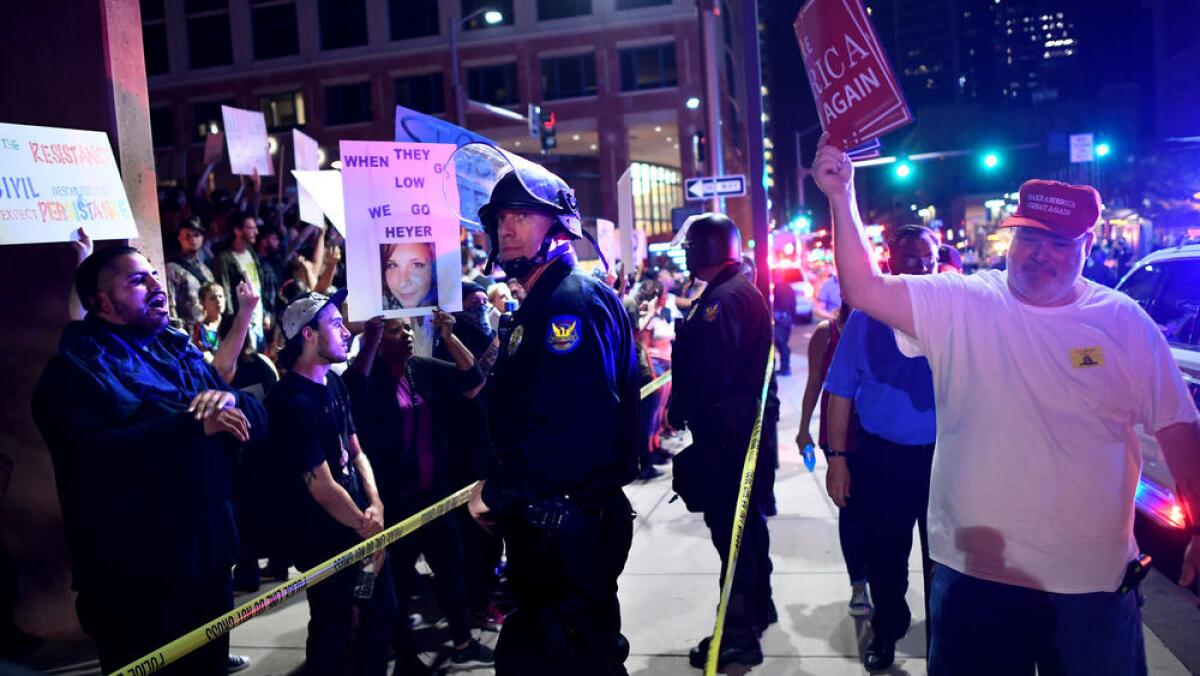
Thousands of protesters gathered here Tuesday outside a campaign-style rally by President Trump, engaging his supporters in shouting matches over whether he harbors racist views.
The demonstrations remained peaceful until the end of the rally, when some protesters tried to break through barricades near an entrance to the convention center where Trump was finishing his speech. Police, who said some protesters had thrown rocks and bottles at them, used tear gas to disperse the crowds.
Hanging over the city all day was the shadow of Charlottesville, Va., and Trump’s recent assessment that “both sides” were to blame for the violence at a recent rally there by white nationalists and his comments that “some very fine people” were marching alongside neo-Nazis.
In an effort to prevent the Phoenix demonstrations from turning violent, authorities called in extra officers and put the National Guard on the ready.
- Share via
Phoenix police deploy tear gas on protesters as Trump rally ends
After hours of largely peaceful protests, clashes broke out Tuesday night between police and protesters at a rally held by President Trump in downtown Phoenix.
Once the president’s speech was done, some protesters attempted to move barricades that were holding back the anti-Trump crowds. Police issued a warning, then fired tear-gas canisters. Thick plumes of smoke filled the air.
“Some people in the crowd began fighting and throwing rocks and bottles at police,” said Phoenix police spokesman Sgt. Jonathan Howard, who said officers “reportedly dispersed gas into the area.”
In an earlier tweet, the Police Department said officers were “addressing criminal behavior near 2nd St. & Monroe,” which is the northwest corner of the convention center where Trump spoke.
American Civil Liberties Union lawyers offered to aid those who felt their rights had been violated.
“Between Trump’s attacks on the press and Phoenix PD’s attacks on protesters, this has not been a good night for the 1st Amendment,” tweeted the national ACLU deputy legal director, Cecillia Wang.
“This is crazy, so crazy. Everything was great until the end,” said Phoenix resident Mira Ramirez, 20, who came to protest against the president.
Some demonstrators donned gas masks as the air thickened with smoke.
After the initial round of tear gas, most protesters dispersed from the convention center area. However, several dozen remained and congregated in the street a few blocks away. A police helicopter circled overhead, warning them at least half a dozen times to leave. Finally, after about 45 minutes, the scene was clear.
Police said later there were four arrests.
UPDATE 10:59 p.m.: The post was updated with news of four arrests.
UPDATE 10:20 p.m.: The post was updated with the dispersal of most of the last protesters.
UPDATE 9:29 p.m.: The post was updated with statements from police and the American Civil Liberties Union.
- Share via
Trump’s Phoenix speech drew chants from crowd and criticism from social media
President Trump played some of his greatest hits Tuesday night.
The president made a 90-minute speech during a campaign-style rally in Phoenix. He began by complaining about his old foe, the “truly dishonest people” in the media, then moved on to a rehash of his widely criticized response to the racial violence at Charlottesville, Va., this month, omitting his claim -- the one that led to most of the criticism -- that “many sides” had been responsible for the trouble.
At different points, the crowd chanted “USA!” “Drain the swamp!” and “Lock her up!,” some of the unofficial mottos of last year’s presidential campaign.
The rally was streamed live on TV and online, which meant people on social media were able to essentially do live fact -checks.
Early on, Trump asserted that “very few people even showed up” to protest the rally, prompted people to start retweeting images of the thousands of people demonstrating outside. (After his speech ended, police used tear gas on protesters.)
Trump also said the media wouldn’t show the size of the crowd inside the venue. But a reporter for U.S. News & World Report tweeted photos and video of what the assembly looked like.
At a couple of points during the speech, Trump said cameras were being turned off because networks didn’t want to show his speech. “They’re very nervous to have me on live television,” Trump told the crowd in a speech that was being aired live in numerous places on television and online -- including CNN.
Trump appeared to have been urged by aides to avoid calling out specific people in his party. As he lamented the Senate’s failure to repeal the Affordable Care Act, he told the crowd, “They said, ‘Please, please, Mr. President, don’t mention any names.’ So I won’t. I won’t.… One vote away! I will not mention any names. Very presidential, isn’t it?”
Later on, he said, “Nobody wants me to talk about your other senator” – that would be Arizona Republican Sen. Jeff Flake, whose 2018 primary challenger Trump recently talked up on Twitter.
Toward the end of his speech, Trump briefly spoke about tax reform and energy – two talking points that are broadly popular with Republicans. He mentioned a new coal mine that would produce “clean coal … meaning they’re taking out coal and they’re going to clean it.”
The phrase “clean coal” actually refers not to whether the coal is clean but to technologies such as carbon capture that help reduce harmful emissions when it is burned. (Last month, columnist Michael Hiltzik took a look at a “clean coal” plant in Mississippi that shut down over cost concerns.)
Naturally, some people drew comparisons between Trump’s speech and Monday’s big news event: the eclipse.
- Share via
Navy relieves commander of U.S. 7th Fleet after latest collision near Singapore

The Navy said Wednesday it has fired the commander of the Japan-based U.S. fleet that has suffered four major accidents at sea this year, including two deadly collisions in the last two months, a rash of mishaps that have shaken the Navy.
The punishment comes two days after the Navy announced a rare suspension of operations around the globe for a fleet-wide safety review following the predawn collision of a guided-missile destroyer and an oil tanker that left 10 sailors missing -- and presumed dead -- near Singapore.
Adm. Scott Swift, commander of U.S. Pacific Fleet, dismissed Vice Adm. Joseph Aucoin, commander of the 7th Fleet, “due to a loss of confidence in his ability to command,” the Navy said.
The Navy said Rear Adm. Phil Sawyer, who was supposed to take command in September, will assume command immediately. The 7th Fleet, which oversees naval operations in the western Pacific and Indian Ocean, is based in Yokosuka, Japan.
There had been no finding of fault against Aucoin because the Navy is still conducting what it called a comprehensive investigation into the unusual string of deadly incidents, which have rocked the Navy.
Chief of Naval Operations Adm. John Richardson ordered the review Monday, saying “more forceful action” is needed to determine why trained crews on U.S. warships carrying radars and other high-tech sensors failed to avoid collisions while underway.
Richardson also announced the unusual “operational pause” in a video posted to social media.
The stand-down was announced hours after the U.S. guided-missile destroyer John S. McCain collided with the Alnic MC, a Liberian-flagged oil and chemical tanker that is nearly three times its size. The accident occurred at 5:24 a.m. local time at the entrance to the Strait of Malacca, one of the world’s busiest shipping lanes.
The collision came two months after the McCain’s sister ship, the guided-missile destroyer Fitzgerald, was rammed by a much larger Philippine-flagged container ship, the ACX Crystal, on a calm, clear night about 50 nautical miles from Yokosuka.
Seven sailors were killed in the June 17 collision, and the commander and his executive officer were relieved of command last week after a Navy investigation.
A guided-missile cruiser, Lake Champlain, collided with a South Korean fishing vessel on May 9 off the Korean Peninsula. Another guided-missile cruiser, Antietam, ran aground Jan. 31 and gushed oil into Tokyo Bay.
Update, 1:54 a.m.: This story was updated to include Navy’s statement.
- Share via
Trump defends remarks on Charlottesville violence, slams ‘crooked media’ on race
President Trump blamed the news media Tuesday for the uproar over his equivocal reaction to the recent deadly violence at a rally of neo-Nazis and white supremacists in Charlottesville, Va.
Speaking at a campaign-style rally in Phoenix, Trump reviewed his public statements on the matter, but omitted the ones that sparked outrage across the political spectrum.
Trump read verbatim -- almost -- some of the remarks that he has made deploring right-wing extremists and accused the media of ignoring them.
“I hit ’em with neo-Nazi,” he said. “I hit ’em with everything. I got the white supremacist, the neo-Nazi. I got ’em all in there. Let’s see. KKK? We have KKK. I got ’em all. So they’re having a hard time. So what did they say, right? ‘It should have been sooner; he’s a racist.’”
But what actually offended many people were Trump’s statements faulting “many sides” for the violence in Charlottesville, along with his comment that some “very fine people” were among the white supremacists and neo-Nazis protesting the town’s removal of a Robert E. Lee statue.
Trump didn’t mention that part Tuesday night.
Trump told the cheering crowd that it was “time to challenge the crooked media deceptions.”
“By the way, they are trying to take away our history and our heritage,” he added, renewing his criticism of efforts to take down monuments to the Confederacy.
Turning to race relations in the United States, Trump said, “I have to say, they were pretty bad under Barack Obama, that I can tell you.”
Trump also hinted that he might pardon former Maricopa County Sheriff Joe Arpaio, whose harsh immigration enforcement tactics in Arizona have long drawn controversy.
“So was Sheriff Joe convicted for doing his job?” Trump asked the crowd, which burst into cheers.
Arpaio was recently found guilty of contempt of court for defying a judge’s 2011 order directing him to stop racially profiling Latinos during patrols and turning them over to federal immigration officials.
“I’ll make a prediction,” Trump told his supporters in Phoenix. “I think he’s going to be just fine, OK?”
- Share via
Supporters pack Phoenix arena as Trump prepares to take stage
- Share via
Justice Department drops bid to collect information on visitors to website involved with Inauguration Day protests
The Justice Department has dropped its request for digital addresses that could identify more than 1 million visitors to a website involved with organizing protests on President Trump’s Inauguration Day.
Government lawyers wrote in a court filing Monday they had “no interest in records relating to the 1.3 million IP addresses” of site visitors, but wanted information on the planning, coordinating and participation of the protests.
“The government values and respects the 1st Amendment right of all Americans to participate in peaceful political protests and to read protected political expression online. This warrant has nothing to do with that right,” the filing said.
The move marks a change in the Trump administration’s previous attempts to gather information on those who protested during Trump’s swearing-in on Jan. 20.
The Justice Department obtained a search warrant in July for information regarding the website disruptj20, hosted by DreamHost and associated with the Inauguration Day protests that led to more than 200 criminal cases.
DreamHost refused to comply with the warrant, saying it violated its 1st and 4th Amendment rights because it would require releasing contact information, email addresses and photos of people who had visited the website to “exercise and express political speech. That should be enough to set alarm bells off in anyone’s mind.”
An amended warrant specified that the government would only request information from July 1, 2016, to Jan. 20, 2017, the day of the protests, and that DreamHost should not include unpublished materials or records.
The government said it would seal any information it did not use and that it was not trying to “identify political dissidents of the current administration.”
DreamHost said in a statement that the Justice Department shift marked a “huge victory for Internet privacy,” but that there were still constitutional concerns with the warrant.
The government initially sought to compel DreamHost to release the information on July 28. A hearing is scheduled Thursday before District of Columbia Superior Court Chief Judge Robert E. Morin.
- Share via
Undaunted by protests, Trump backers await president in Phoenix
- Share via
‘No Trump, no KKK, no fascist USA!’ Protesters chant before Trump rally in Phoenix
Protesters numbering a few dozen in the morning have grown to the thousands in downtown Phoenix ahead of President Trump’s evening rally at the city’s convention center.
“No Trump, no KKK, no fascist USA!” a group chanted as it arrived at the city center in sweltering 107-degree weather just hours before the president was set to speak during his first major event in the West since his inauguration.
“Resist,” “Lock him up” and “Down with white supremacy,” read signs among demonstrators.
- Share via
Trump supporters await ‘the greatest show on Earth’ in Phoenix — a Trump rally

Hours before President Trump was set to arrive here in Phoenix on Tuesday, several hundred supporters sipped water and sought out the shade of mesquite trees as they waited in a line that snaked down a side street of the convention center.
Ross Hubbard held his navy blue “Make America Great Again” hat as he fanned his face with a leaflet.

“This is America right here … a great day, what a time to be alive,” the 45-year-old Phoenix resident said as stood in the 105-degree heat. “This will be the greatest show on earth tonight.”
Hubbard owns his own company — Pur Beverage — and said that he’s never been more excited to be a Republican than right now.
“Trump has hit a lot of politicians in the mouth, and that’s refreshing,” he said.
He lauded the president’s Supreme Court pick — one of the president’s few major accomplishments in his first six months in office.
“Obstructionists are why the other stuff isn’t getting done,” Hubbard said.

Sharon Miller, 62, traveled from her home a short drive to the east in Mesa, Ariz.
“I’m so tired of everyone acting like they’re doing something so brave by standing up to our president ... they’re not,” she said. She was referring to pushback against Trump for, among other things, blaming “both sides” in the recent violence in Charlottesville, Va.
- Share via
No pardon for Arpaio tonight, White House says
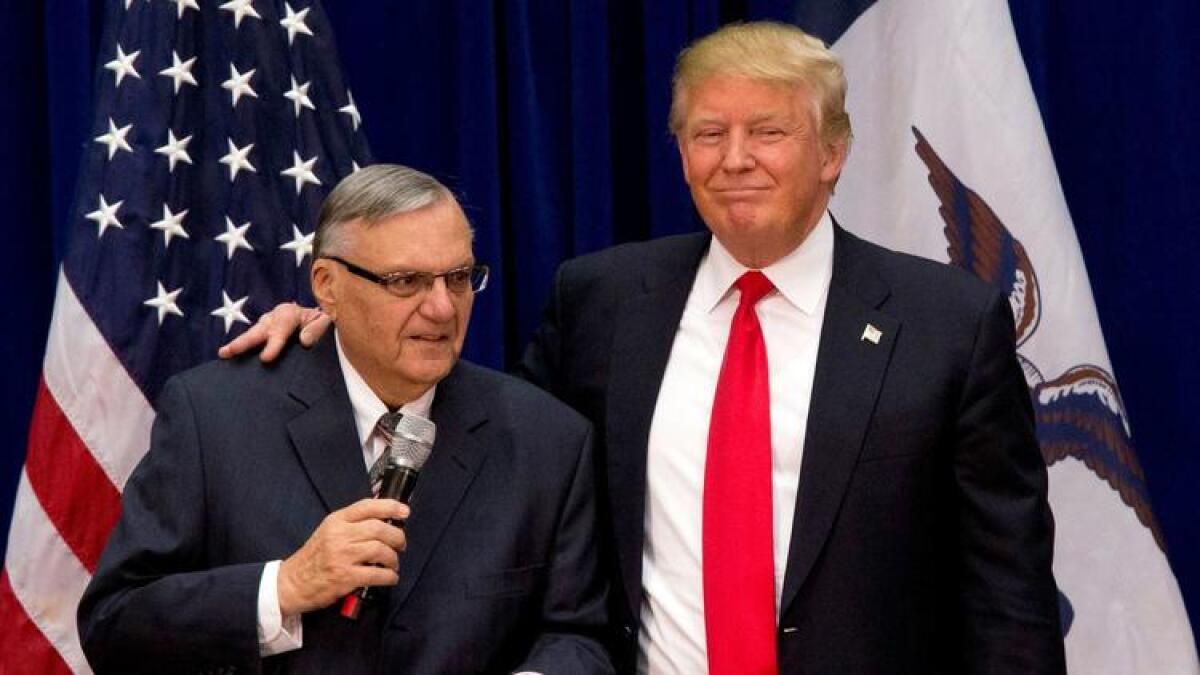
Former Maricopa County Sheriff Joe Arpaio won’t be getting a pardon tonight, the White House announced as President Trump flew to Arizona for a visit to the border and a campaign-style rally.
“There will be no discussion of that today at any point, and no action will be taken on that front at any point today,” White House Press Secretary Sarah Huckabee Sanders told reporters on Air Force 1 as Trump flew west.
Trump fueled speculation about a pardon earlier this month when he told a Fox News contributor that he was considering the step for Arpaio, whose immigration enforcement tactics drew legal and political scrutiny long before Trump’s rise in politics.
Arpaio recently was found guilty of contempt of court for defying a judge’s order, issued in 2011, which directed him to stop racially profiling Latinos during patrols and turning them over to federal immigration officials. He’s scheduled for sentencing in October.
Earlier this week, a White House official had said a pardon at this stage of the proceedings was “very unlikely.”
- Share via
Tillerson notes signs of ‘restraint’ in North Korea and hints at dialogue
Secretary of State Rex Tillerson on Tuesday voiced a rare note of optimism in the North Korea nuclear crisis, saying ruler Kim Jong Un may be showing signs of restraint that could lead to dialogue.
Tillerson noted that North Korea had not launched a ballistic missile nor done other “provocative acts” since the United Nations Security Council voted unanimously on Aug. 5 to impose blistering economic sanctions on Pyongyang.
“I’m pleased to see that the regime in Pyongyang has certainly demonstrated some level of restraint that we’ve not seen in the past,” Tillerson said in a briefing with reporters at the State Department convened primarily to discuss the Trump administration’s plans for Afghanistan.
He expressed hope that such restraint was “the beginning of this signal that we’ve been looking for.”
“Perhaps we are seeing our pathway to some time in the near future to having some dialogue,” Tillerson said, adding that he still wanted to see more signs but also thought it important to acknowledge the steps taken.
Though sanctions have been used repeatedly to punish and isolate North Korea over the last two decades, the U.N. package was described as the most severe. If enforced, the penalties could cut that country’s export income by one-third, around $1 billion.
Before the U.N. Security Council’s action, North Korea had launched two intercontinental missiles within a few weeks of each other in July.
That led to particularly belligerent rounds of threats from North Korea state media and President Trump, who at one point vowed “fire and fury” against North Korea and then warned that U.S. military weapons were “locked and loaded.”
Earlier Tuesday, the United States had imposed a separate round of sanctions on 16 Chinese and Russian companies and individuals accused of working with North Korea.
- Share via
More U.S. sanctions on Russian, Chinese firms accused of working with North Korea
The Trump administration on Tuesday imposed a new round of economic sanctions on Russian and Chinese companies and individuals who it said are working with North Korea.
Sanctions have served as the cornerstone of U.S. efforts to isolate North Korea economically and diplomatically over the last two decades as the country has developed and tested nuclear weapons and ballistic missiles.
The United Nations Security Council supports the efforts, voting unanimously this month for a package of additional sanctions after North Korea successfully tested two intercontinental ballistic missiles.
After North Korean media said the country’s autocratic ruler, Kim Jong Un, was considering a plan to send four ballistic missiles into waters off Guam, President Trump warned that he could unleash “fire and fury” if North Korea attacked the U.S. territory.
Kim shelved the plan, at least for now, and tensions eased. His government has denounced annual U.S.-South Korean military exercises that began Monday, but without adding a specific threat of attack.
The newest Treasury Department sanctions target 10 firms and six individuals, all from China or Russia. The sanctions mean U.S. authorities can freeze any assets the targets have in the United States, and U.S. companies and people are barred from doing business with them.
Among those blacklisted are a company based in Hong Kong accused of helping finance Pyongyang’s ballistic missile program; three Chinese coal companies that the U.S. says imported nearly $500 million in North Korean coal between 2013 and 2016; and a Chinese firm based in Africa that facilitates the employment of North Korean workers, whose wages go to Kim’s government.
Three Russians who run a company that exports oil to North Korea also were targeted, administration officials said.
“Treasury will continue to increase pressure on North Korea by targeting those who support the advancement of nuclear and ballistic missile programs, and isolating them from the American financial system,” Treasury Secretary Steven T. Mnuchin said in a statement.
“It is unacceptable for individuals and companies in China, Russia and elsewhere to enable North Korea to generate income used to develop weapons of mass destruction and destabilize the region,” he added.
- Share via
Pentagon chief says new strategy for Afghanistan will replicate tactics used against Islamic State
U.S. Defense Secretary James N. Mattis said Tuesday that the new strategy for Afghanistan will try to replicate “a lot” of the tactics that have successfully pushed Islamic State from large parts of Iraq and Syria since 2014.
Key to those campaigns has been a willingness to embed U.S. advisors closer to the front lines to help ground assaults by Iraqi security forces and Syrian militias. The advisors help on battlefield strategy and coordinate airstrikes on enemy targets.
But Mattis said he is still awaiting a detailed plan from Gen. Joseph F. Dunford, chairman of the Joint Chiefs of Staff, for how to implement the strategy that President Trump announced Monday night.
Trump has given Mattis authority to send about 4,000 more troops, adding to 8,400 U.S. forces already deployed to Afghanistan. But during a previously unannounced visit to Baghdad, Mattis said he won’t decide a precise figure until he gets Dunford’s plan.
“When he brings that to me, I will determine how many more we need to send in,” Mattis said. “It may or may not the number that is bandied about.”
Trump disclosed few details about his plan to again deepen U.S. involvement in the nearly 16-year-old U.S. war against an array of Islamist insurgents who have gained ground against the central government in Kabul.
The Taliban now controls or contests more than 40% of Afghan territory — more ground than at any point since the U.S.-led invasion in 2001 toppled the militants from power, according to recent United Nations estimates.
Trump said he won’t provide a “blank check” for U.S. support to the Afghan government, but added he didn’t want to be hemmed in by timelines.
Mattis also refused to provide specifics on the military’s strategy, which has been deliberated for months by top U.S. military and government officials, or say how Pakistan figures in.
“There is a broader approach to this and it all comes down to the execution and we will have to stand and deliver on this,” Mattis said. “You’ll just have to watch it unfold to really get the answer to it.”
- Share via
German police seize thousands of ‘Trump’ ecstasy tablets
German police say they have seized thousands of tablets of the party drug Ecstasy in the shape of President Trump’s head, a haul with an estimated street value of $45,900.
Police in Osnabrueck, northwest Germany, say they found the drugs while checking an Austrian-registered car on the A30 highway Saturday.
They say the people in the car, a 51-year-old man and his 17-year-old son, told officers they had been in the Netherlands to buy a vehicle but hadn’t succeeded so were returning home.
Officers said they found about 5,000 of the orange, Trump-shaped Ecstasy tablets along with a large, but unspecified quantity of cash.
A judge on Sunday ordered the father and son kept in custody. The car was seized.
ALSO:
Trump heads to Arizona to tout immigration crackdown and rally supporters
Afghans express hope for Trump’s new war strategy, while Pakistanis feel stung by criticism
- Share via
Louise Linton, wife of Treasury Secretary Steven Mnuchin, slams Instagram follower after criticisms from several users
Louise Linton, the wife of Treasury Secretary Steven Mnuchin, blasted as “adorably out of touch” a person who criticized her Instagram post in which Linton depicted her designer-label outfit.
Linton posted the picture of herself Monday getting off a government plane in Kentucky with Mnuchin. In her post, she mentioned several designer labels for her all-white outfit, including Tom Ford and Valentino.
The commenter responded: “Glad we could pay for your little getaway. #deplorable.”
Linton, an actress, responded on Instagram by calling the commenter “adorably out of touch.” She suggested she and Mnuchin, a former Goldman Sachs executive and hedge fund investor, contributed more to the U.S. economy and paid more in taxes than her critic.
“Pretty sure the amount we sacrifice per year is a lot more than you’d be willing to sacrifice if the choice was yours,” Linton added.
She went on to call the commenter’s response “passive aggressive” and “nasty” before ending her retort with a suggestion that the critic, “go chill out and watch the new game of thrones.”
Linton’s Instagram account is private, but a screengrab of her response has circulated online. Linton and the Treasury Department didn’t immediately respond to requests for comment from the Associated Press on Tuesday.
Mnuchin was visiting Kentucky on Monday for an appearance with Republican Senate Majority Leader Mitch McConnell and a tour of Fort Knox.
The Scottish-born Linton apologized last year amid criticism of a self-published memoir of a year she spent in Africa as a teen, and withdrew the book. Critics deemed it inaccurate in its depiction of life on the continent. An excerpt was published online by the Telegraph, but taken down by the British newspaper “in light of the concerns raised by readers.”
Linton has also had small roles in films and television shows and more recently worked as a producer. Mnuchin produced several films before being tapped for the Treasury post by President Trump. The pair married in June in a ceremony attended by the president.
- Share via
On eve of Trump’s Arizona rally, GOP Sen. Jeff Flake — a vocal critic — isn’t worried about blowback
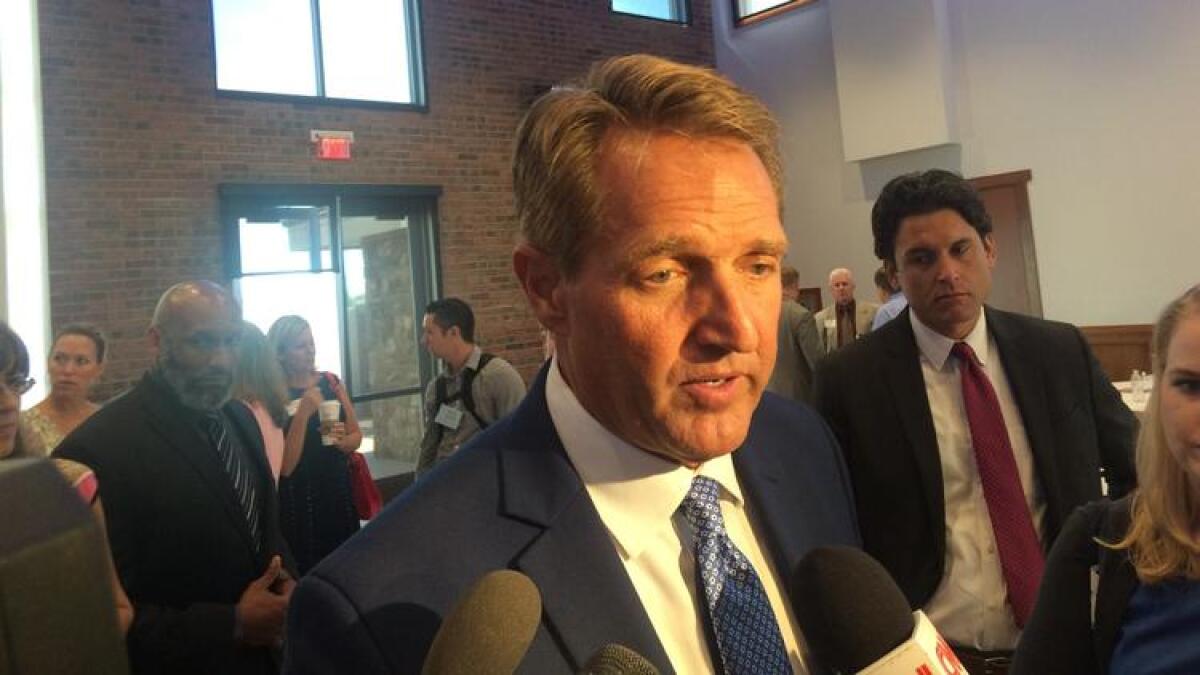
For Arizona Sen. Jeff Flake, the political climate around him is far from ideal.
In recent days, the president, a fellow Republican, has taunted Flake on Twitter and even praised his rival in the state’s Republican primary — a rare move in politics before Donald Trump came along.
But for a day at least, Flake ignored it all and let political bygones be bygones.
On Monday, reporters asked Flake — who spoke to a gathering of local business leaders — what he thought of Trump calling him toxic on Twitter.
“I don’t worry about it at all,” Flake said at an events center here in the suburbs east of Phoenix.
Is Trump right in offering aid and comfort to his primary challenger, former state Sen. Kelli Ward?
“That’s not my realm. That’s somebody else’s. I just — I’m running my own campaign. It’s going well. And what the president does, that’s his prerogative,” Flake said.
- Share via
Trump’s Afghanistan strategy is met with mixed reviews, reviving war authorization and funding debate in Congress
President Trump’s strategy for Afghanistan quickly divided Congress along familiar lines, as Republicans splintered between defense and deficit hawks, and Democrats resisted what many see as a never-ending conflict.
House Speaker Paul Ryan said he was “pleased” with the president’s plan while Senate Majority Leader Mitch McConnell commended Trump and his national security team for a “thoughtful” approach.
But House Minority Leader Nancy Pelosi warned that by failing to cap troop levels or provide a timeline for withdrawal Trump was “declaring an open-ended commitment of American lives with no accountability.”
Congress is reluctant to pour more money into the military strategy without greater oversight, and may have trouble approving extra funds if the White House seeks them.
Lawmakers wary of broader military entanglements have found momentum for efforts to revisit the war authorization first approved after the Sept. 11, 2001, attacks.
Even before the president spoke Monday night, the GOP’s libertarian-leaning wing refused to commit to approve more money or personnel to the Afghan war.
“I think it is a terrible idea to send any more troops into that war,” said Sen. Rand Paul (R-Ky.)
And though defense hawks welcomed Trump’s approach, which many saw as overdue, some signaled caution, in part a reflection of the GOP’s disconnect with the White House.
Sen. John McCain (R-Ariz.), chairman of the Armed Service Committee, said the panel will review the administration’s plan when lawmakers return from the August recess.
“The President must conduct himself as a wartime commander-in-chief,” said McCain counseled. “He must speak regularly to the American people, and to those waging this war on their behalf, about why we are fighting, why the additional sacrifices are worth it, and how we will succeed.”
At the same time, McCain said, “Congress has a role to play in sending America’s young men and women into harm’s way, and we intend to exercise that responsibility.”
- Share via
House Speaker Paul Ryan: Trump ‘messed up’ in response to Charlottesville violence
House Speaker Paul D. Ryan said President Trump “messed up” in responding to the neo-Nazi rally in Charlottesville, Va., by saying both sides were to blame for violence between white supremacists and groups protesting them.
“He could have done better,” Ryan said Monday at a CNN televised town hall.
“I do believe that he messed up in his comments.”
Pressed on Trump’s remarks, Ryan said that those marching with Nazi slogans and racist signs did not include, as Trump suggested in a combative news conference last week, “very fine people.”
“You’re not a good person if you’re there,” Ryan said.
Trump revisited the issue Monday evening during his speech to the nation on Afghanistan. Reading from prepared remarks, he called on Americans to find the courage to “heal our divisions.”
“I just think he needs to do better,” Ryan said after the speech, “and I think he just did today.”
- Share via
Secret Service runs short of money to pay agents protecting Trump and his circle
The Secret Service is close to its annual caps for salary and overtime pay for more than 1,000 agents, partly because of President Trump’s large family, multiple properties and frequent travel, according to a report Monday in USA Today.
The Secret Service director, Randolph “Tex” Alles, told the newspaper that he is working to raise the combined salary and overtime caps for agents from $160,000 to $187,000 for the duration of Trump’s first term, but said he doesn’t see the problem changing “in the near term.”
In a CNN report, Alles said the issue cannot be attributed to the current administration but rather to “an overall increase in operational tempo” over nearly a decade.
Yet with Trump as president, the agency is responsible for protecting 42 people, compared with 31 people during the Obama administration. It also must guard several Trump-owned properties where the president stays, including Trump Tower in Manhattan, Mar-a-Lago in Florida and his private golf club in Bedminster, N.J., where Trump recently vacationed.
Also, among others, agents protect Trump’s two adult sons, who often travel internationally for business, and their families, as well as daughter Ivanka Trump and her family.
The Los Angeles Times reported in May that in the first 100 days of Trump’s presidency, the total cost of travel and protection for him and his family was about $30 million, compared with an annual cost of $12 million for President Obama, who did not travel as frequently but came in for criticism nonetheless from conservatives.
Congress allocated an additional $13 million to the Secret Service in May to cover unanticipated overtime for its agents and $61 million to reimburse New York and Palm Beach for their expenses during the election season.
Trump, in a statement in July marking the 152nd anniversary of the Secret Service, said he and First Lady Melania Trump were “especially thankful for those who selflessly stand by our side to safeguard our family every day.”
- Share via
Speaker Paul Ryan on Charlottesville: ‘There are no sides’
House Speaker Paul D. Ryan kept a noticeably low profile in the aftermath of President Trump’s equivocating response to the white supremacist violence in Charlottesville, Va., on Aug. 12. On Monday he spoke up with more force.
In amplifying his views — and implicitly upbraiding the president — Ryan anticipated what is likely to be a top question during his nationally televised appearance Monday night, in a CNN town-hall-style broadcast immediately after Trump’s address to the nation on the Afghanistan policy.
“We all need to make clear there is no moral relativism when it comes to neo-Nazis. We cannot allow the slightest ambiguity on such a fundamental question,” Ryan wrote on Facebook.
“The immediate condemnations from left, right and center affirmed that there is no confusion about right and wrong here. There are no sides. There is no other argument. We will not tolerate this hateful ideology in our society.”
Republicans are coming under continued scrutiny for their own responses after Trump blamed “both sides” for the violence in Charlottesville — the neo-Nazis who rallied there and the counterprotesters opposing them — after one of the counterprotesters was killed in a car attack by an alleged white supremacist.
Ryan, like many Republicans, still did not directly criticize Trump by name. But his latest remarks more clearly implied criticism of the president’s rhetoric than last week’s reaction, before the onslaught of opprobrium of Trump.
“White supremacy is repulsive,” Ryan said last week. “This bigotry is counter to all this country stands for. There can be no moral ambiguity.”
Republicans in Congress continue to calculate the best way to interact with Trump and respond to him, especially as lawmakers begin their 2018 reelection campaigns without having achieved many of their biggest legislative promises, including repealing the Affordable Care Act or enacting tax reform.
Ryan, who has been trying to push ahead to tax reform this fall, after the failure of the Obamacare repeal, wrote that he was camping with his family last weekend when the white supremacist groups descended on Charlottesville, a quiet college town that is home to the University of Virginia.
“I felt the range of emotions that so many of us did. Anger, bewilderment, sadness,” the speaker wrote.
Republicans had hoped in the final weeks of the congressional recess to begin laying the groundwork for their legislative efforts this fall, with Ryan’s CNN appearance part of the campaign for public support. But Ryan was upstaged by Trump’s plans, announced Sunday, for the Afghanistan address.
- Share via
Former Sheriff Joe Arpaio ‘very unlikely’ to appear with Trump at Arizona campaign rally

Former Maricopa County Sheriff Joe Arpaio, one of President Trump’s most loyal and most polarizing supporters, is “very unlikely” to be included in Trump’s campaign-style rally in Phoenix on Tuesday night, nor is he likely to receive word of a pardon during the event, according to a person familiar with the planning efforts.
The person, who requested anonymity to discuss the internal decision-making process, said a final decision has not been made, but that event organizers fear an appearance by Arpaio could cause an unnecessary distraction.
Since Trump announced the rally last week — part of his first trip to the West as president — Arpaio’s potential appearance has been the subject of speculation. He had introduced Trump in his home state during the campaign, ridden in his plane and formed what Arpaio described as a warm relationship.
Even if organizers do not plan for Trump to announce a pardon, Trump is known for going off script and may very well decide to talk extemporaneously about the possibility of one.
Arpaio said in a phone interview Monday that he did not know whether he would be invited to the event as a dignitary.
“If you hear anything, will you let me know?” Arpaio said.
He said he would not show up without an invitation.
“I don’t think I’ll be in the crowd these days,” he said. “I don’t want to cause any havoc, if you know what I mean.”
Trump told a Fox News contributor last week that he was considering a pardon for Arpaio, whose immigration enforcement tactics drew legal and political scrutiny long before Trump’s rise in politics.
Arpaio was recently found guilty of contempt of court for defying a judge’s order to stop racial profiling of Latinos and turning detainees over to federal immigration officials during his tenure in office.
Arpaio said he had not spoken with the president since before Trump took office. Trump called Arpaio’s wife before the inauguration to check on her health, he said. She has been battling cancer and Arpaio said Trump has checked in on her four or five times.
He said he does not know whether Trump will pardon him for what he calls “a miscarriage of justice.”
“I know that he’s sure got a good case to do that,” Arpaio said. “I don’t know what he’s thinking.”
Arpaio is due to be sentenced in October.
- Share via
Bannon’s ouster could boost the powerful Koch network, which has surprising sway in Trump’s White House
During the presidential campaign, about the only common ground between Donald Trump and billionaire conservative Charles Koch was a colorful disregard for each other.
Koch called the choice between Trump and Hillary Clinton like opting for cancer or a heart attack. And Trump bashed big-money donors, deriding his Republican rivals as “puppets” who begged at Koch’s door.
Not surprisingly, Koch and his allies largely sat out the presidential election, and Trump won without them. Normally such a high-profile snub would carry a steep political price.
But Koch’s network of conservative advocacy groups has exerted surprising sway in the Trump administration, scoring some early victories and pushing its priorities to the top of the White House agenda.
Its influence is likely to grow after the ouster of Trump’s top strategist, Stephen K. Bannon, amid the White House turmoil over neo-Nazi violence in Charlottesville, Va. Bannon had clashed with several of Trump’s top aides, including those aligned with the Koch crowd, over his hard-right views.
Bannon’s populist agenda, with its nationalist, nativist and anti-immigration bent, found few fans among the business-oriented, small-government conservatives aligned with Koch.
With Bannon back at Breitbart News, a far-right website, the question is whether he will still have Trump’s ear from the outside while Koch and his cohorts retain strong allies in the White House.
- Share via
U.S. will stop issuing nonimmigrant visas in Russia in deepening diplomatic standoff

In the latest tit-for-tat in the diplomatic standoff between the United States and Russia, the U.S. embassy in Russia announced Monday that it will suspend visa processing for Russian applicants beginning Aug. 23.
The move is a response to Russian President Vladimir Putin’s order for the U.S. to cut its staff at the U.S. embassy and three consulates by 755 people by Sept. 1. Russia also seized a warehouse and a resort complex in Moscow used by U.S. diplomatic staff.
The State Department hasn’t said how many U.S. diplomats will be forced to leave and how many Russian nationals and others who work at the U.S. government will be laid off.
Secretary of State Rex Tillerson has said he will respond by Sept. 1, but has not yet given a public assessment of how the cuts are likely to impact the vast array of embassy-backed services in Russia, from assisting U.S. businesses to enforcing arms control agreements.
U.S. relations with Moscow have nosedived since Putin’s government seized Crimea and backed separatists in eastern Ukraine in 2014, promping U.S. sanctions.
They worsened last year when U.S. intelligence agencies determined that the Kremlin interfered in the U.S. presidential race in a bid to help Donald Trump win.
President Obama retaliated in December by expelling 35 Russian diplomats who the White House said were spies, and seizing two Russian-owned waterfront compounds - one in New York and the other in Maryland - that it said were used for espionage.
Putin initially did not respond, but his order to cut the U.S. staff last month followed a near-unanimous vote in the U.S. Congress to impose additional sanctions on Russia for its meddling in the election. President Trump later signed the bill into law.
Trump has repeatedly praised Putin and called for improving relations with Moscow. But any attempts to do so have been hampered by the widening FBI investigation into whether his campaign cooperated with the Russian attempts to influence the U.S. election.
The U.S. embassy statement Monday cited the Russian order to cut staff as the reason it was suspending visa processing.
“As a result of the Russian government’s personnel cap imposed on the U.S. Mission, all non-immigrant visa operations across Russia will be suspended beginning August 23, 2017,” the embassy said on its website.
The move will affect Russians applying for tourist, business and other kinds of nonimmigrant visas to the United States.
The U.S. Mission in Russia issued 182,958 visas in 2016, according to the State Department. About 25% were issued at U.S. consulates in St. Petersburg, Ekaterinburg and Vladivostok, and the rest in Moscow.
The embassy said it would begin Monday to cancel appointments for visa interviews. No visas will be processed until Sept. 1, after which all applicants must undergo an interview in Moscow, it said.
Even before the announcement, interview schedules were backed up 45 days or more. After Sept. 1, the embassy warned, visa processing for Russian citizens will be conducted “on a greatly reduced scale.”
Russian Foreign Minister Sergei Lavrov said Moscow would respond after a closer examination of the U.S. announcement. He cautioned against a response that would similarly reduce applications of American applicants for Russian visas, saying that the Russian response would not be intended to punish American citizens.
“If someone hoped that in this case a bad example would be contagious, then he miscalculated,” Lavrov told a news conference Monday.
In Russia’s upper parliament, Andrei Klimov, the deputy head of the Committee on International Affairs, suggested that Russia should respond by reducing visas issued to U.S. citizens.
“The legitimate rights of our citizens must be defended, so if there are any infringements on our citizens, then mirror measures should also be introduced against the citizens of the United States,” Klimov said, according to Interfax, a Russian news agency.
Klimov’s counterpart in Russia’s lower house of parliament, called the Duma, blamed the United States for the nosedive in relations.
“It always comes from the American side,” Leonid Slutsky, who chairs the Duma’s international affairs committee, posted on the Russian social media site VKontakte. “We believe it is testament to Washington’s mood to further accelerate the deterioration of relations with Moscow.”
- Share via
Putin names new Russian ambassador to U.S. to replace Sergei Kislyak
Russian President Vladimir Putin has appointed a new ambassador to the United States.
The Kremlin said on Monday that Putin has replaced Sergei Kislyak, whose tenure ended in July, with Anatoly Antonov, a deputy foreign minister and former deputy defense minister seen as a hardliner regarding the U.S.
The outgoing ambassador played a prominent role in the controversy over Russia’s possible involvement in the 2016 U.S. presidential election.
President Trump’s first national security advisor, Michael Flynn, resigned after lying about contacts with Kislyak. Atty. Gen. Jeff Sessions recused himself from the investigation into possible Russian interference in the 2016 election after reports that he hadn’t disclosed meetings with Kislyak.
- Share via
Trump, who once backed withdrawal from Afghanistan, will try to sell the nation on deeper involvement
President Trump, who as a private citizen blamed “stupid leaders” for prolonging the war in Afghanistan, plans to make a prime-time speech Monday in an attempt to sell Americans on his proposal for deeper involvement there.
It’s another challenge for a president who rose to popularity as a sharp-elbowed commentator in the public arena, now being forced to confront the tough realities of war and peace through the lens of American security and interests in what has become the nation’s longest war.
Militants serving the Taliban, Islamic State and other militias have wrought more violence and instability in Afghanistan over the past year, increasing pressure on Western forces brought in to bolster overmatched Afghan security forces.
Trump delivers the speech, an important milestone in any presidency, as his temperament and focus have been criticized by influential lawmakers in his own party and by a public who, according to polls, has not been convinced of his leadership abilities.
Even as he prepared for the sobering task Monday night, he showed his penchant for distraction, tweeting a morning complaint about the “very dishonest Fake News Media.”
His long record on Twitter shows Trump’s quick transformation on the issue.
“We have wasted an enormous amount of blood and treasure in Afghanistan. Their government has zero appreciation. Let’s get out!” Trump tweeted in 2013, one of several similar statements he made that year.
Less than four years later, Trump is expected to authorize some 4,000 more U.S. troops for counter-terrorism missions, as well as U.S. advisors who will work on the front lines. That’s on top of 8,400 U.S. and 5,000 North Atlantic Treaty Organization troops already in the country, advising Afghan security forces.
On the campaign trail, Trump spoke more often about the need to win wars, while disdaining efforts at nation-building that have plunged past administrations into longer engagements.
Trump made the newest troop decision over the weekend after a meeting with his military advisors on Friday at Camp David.
Trump was presented with three options, according to a former national security official familiar with the internal administration deliberations: 1) Scale back to a skeletal presence 2) Deploy only a robust counter-terrorism operation headed by Joint Special Operations Command and the Central Intelligence Agency 3) Increase troop levels by 4,000 to 5,000 while at the same time increasing counter-terrorism operations.
Trump seems to have chosen the third option.
Calls for more troops or money will almost certainly run into a coalition of resistance from liberal Democrats and libertarian-leaning Republicans who reject a muscular military presence.
On Monday, Rep. Thom Massie (R-Ky.) was among those reminding the president of the opposition from the right.
- Share via
Trump to outline new Afghanistan strategy in Monday evening address
President Trump on Monday evening will spell out a new U.S. strategy for the war in Afghanistan, where U.S. troops have been fighting for 16 years, and other parts of South Asia, the White House said Sunday.
Trump made his decision after meeting with his national security team at the presidential retreat at Camp David on Friday, capping months of deliberations on how to proceed in America’s longest war.
On Sunday, Defense Secretary James N. Mattis told reporters traveling with him in Amman, Jordan, that the new strategy is the result of a “rigorous” process. He declined to provide details on precisely what Trump will announce.
Trump will make a nationally televised statement from Ft. Myer in Virginia at 9 p.m. Monday, the White House said.
He will “provide an update on the path forward for America’s engagement” in Afghanistan and South Asia, the statement said.
Mattis was authorized in June to deploy about 4,000 additional troops to Afghanistan, but any significant buildup has been on hold pending the broad strategic review.
Trump’s advisors had offered competing visions for bolstering Afghan forces against a resurgent Taliban.
Ousted White House strategic advisor Stephen Bannon had supported the notion of hiring private mercenaries rather than sending in more U.S. troops, as Mattis and others have urged.
With American forces in Afghanistan now numbering fewer than 10,000, Afghan forces have been shouldering the brunt of fighting but have been struggling to hold ground against the Taliban.
U.S. commanders have said extra troops could be used to help train and advise Afghan units to make them a more effective fighting force in hopes of breaking what the U.S. commander in Afghanistan, Gen. John Nicholson, has termed a “stalemate.”
The plan is also expected to encompass U.S. dealings with other players in the Afghan conflict, including neighboring Pakistan, which has long sheltered insurgents and their allies.
Trump ran on a platform of reducing American foreign military entanglements, and during his first seven months in office, the president balked at authorizing more troops, deferring longer-term decisions on how to proceed.
On Saturday, Trump tweeted that “many decisions” had been made on how to approach the Afghan conflict.
- Share via
Sen. John McCain tweets photos of the ‘three amigos’ together again as he undergoes cancer treatment in Arizona
Republican Sen. John McCain, undergoing his first week of chemotherapy treatment after being diagnosed with brain cancer, had a little help over the weekend from some friends.
Fellow travelers Sen. Lindsey Graham (R-S.C.) and former Sen. Joe Lieberman, the Democrat-turned-Independent from Connecticut -- who together with McCain were often called the three amigos -- reunited for a visit in Arizona.
The three became a close-knit trio of globe-trotting defense hawks, particularly during then-President George W. Bush’s administration, and disbanded only after Lieberman, who stunned his party when he backed McCain’s 2008 presidential bid, retired from the Senate.
Aides have said McCain is doing well as he starts cancer treatment.
McCain remains active at home, according to his social media posts, and is expected to return to the Senate.
Over the weekend he posted photos of the amigos, together again.
- Share via
Treasury Secretary Steven Mnuchin says it’s ‘hard to believe’ he has to defend himself and Trump. Then he does
Treasury Secretary Steven Mnuchin issued a statement Saturday in response to comments from his Yale classmates and others that he “speak out” about President Trump’s response to Charlottesville.
An open letter signed by more 300 of members of his 1985 graduating class, said Mnuchin had a “moral obligation to resign.”
Mnuchin and Transportation Secretary Elaine Chao flanked Trump on Tuesday during what was supposed to be a news conference about infrastructure. Instead, the questions quickly turned to the president’s delay in directly condemning white supremacist groups who had marched in Charlottesville with tiki torches and carrying KKK and Nazi symbols.
Mnuchin, who is Jewish, said in his statement that he believed he understood the “long history of violence and hatred against the Jews (and other minorities.)”
Saying he found it “hard to believe I should have to defend myself on this, or the president, I feel compelled to let you know that the president in no way, shape or form believes that neo-Nazis and other hate groups who endorse violence are equivalent to groups who protest in peaceful and lawful ways.”
Mnuchin referenced his years at Yale as making him “familiar with the culture wars being fought in our country.”
He called those issues “more complicated than we have been led to believe by the mass media.”
He also said Trump “deserves the opportunity to propose his agenda” without efforts by others to “distract the administration and the American people from these most important policy issues -- jobs, economic growth and national security.”
Adding that he did not “believe the allegations against the president are accurate,” Mnuchin said “having highly talented men and women” serve the Trump administration should be “reassuring to you and all the American people.”
- Share via
Trump tweets about ‘anti-police agitators’ as counter-protesters confront far-right rally in Boston
President Trump weighed in on the far-right rally held Saturday in Boston, describing “anti-police agitators” and complimenting the police.
Boston police said they had a tight security plan in place to ensure the violence that roiled Charlottesville, Va., last weekend did not take place in their city.
The large gathering ended as scheduled by 2 p.m. local time without any major incidents.
Trump followed that tweet by another that appeared to be quickly deleted, then posted again, then deleted again.
In that tweet, Trump said the country had been “divided for decade, but will come together again. Sometimes protest is needed in order to heel, and heel we will!”
Then he tweeted the sentiment again, with a spelling correction.
He also praised those who came out in Boston to oppose bigotry.
Trump has come under intense criticism from both Democrats and Republicans for his response to the events in Charlottesville.
He initially laid blame for the violence on “many sides” and walked away when reporters shouted questions about whether he specifically denounced white supremacism. After the backlash, he gave a scripted statement Monday that said racism was evil and called out the “KKK, neo-Nazis, white supremacists and other hate groups” as repugnant.
But in a news conference on infrastructure the following day, he again spoke about “blame on both sides.”
“What about the ‘alt-left’ that came charging at, as you say, the ‘alt-right’? Do they have any semblance of guilt?” Trump asked reporters. “They came charging with clubs in their hands.”
UPDATES:
1:54 p.m.: This article was updated with additional Trump tweets and information about the Boston rally as well as his previous comments about Charlottesville.
- Share via
Trump thanks Steve Bannon - ‘it was great!’
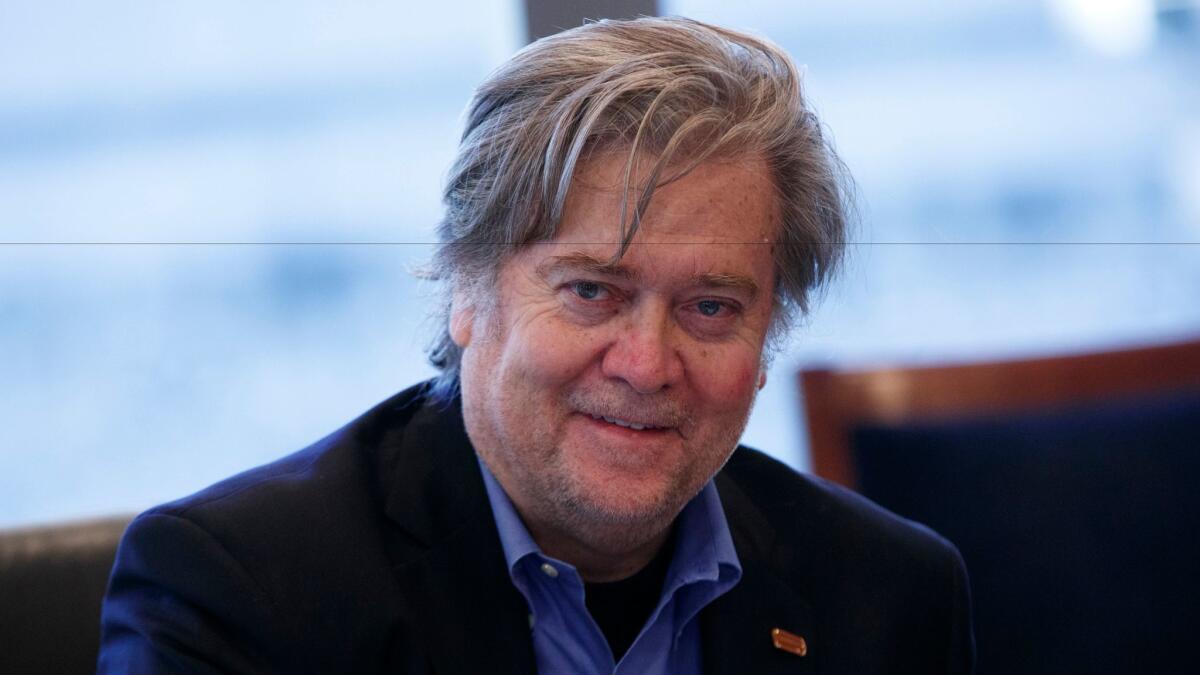
President Trump thanked Stephen Bannon on Saturday, his first public comments since the controversial presidential advisor left the White House and returned to his perch at Breitbart News.
Bannon was an architect of Trump’s America First agenda during the campaign last year, but his fiery brand of nationalist rhetoric and economic populism sparked harsh criticism of the Trump’s response to last weekend’s white supremacist rally in Charlottesville.
Trump’s tweet Saturday morning thanked Bannon for helping take over his presidential campaign last summer when Trump was trailing in polls to Democratic rival Hillary Clinton. Trump did not mention Bannon’s work in the White House.
“I want to thank Steve Bannon for his service. He came to the campaign during my run against Crooked Hillary Clinton - it was great! Thanks S”
Later Saturday, as thousands of protesters rallied against a far-right group’s “free speech” rally in Boston, Trump tweeted again about the role he expects Bannon to play on the outside to counter what the president calls “Fake News.”
“Steve Bannon will be a tough and smart new voice at @BreitbartNews...maybe even better than ever before. Fake News needs the competition!”
A White House spokeswoman had no information Saturday about how Trump was spending his day or if he had spoken to Bannon since his exit.
The president, at his golf resort in Bedminister, had no public events on his schedule.
- Share via
President Trump and first lady to skip Kennedy Center honors over concerns of ‘political distraction’
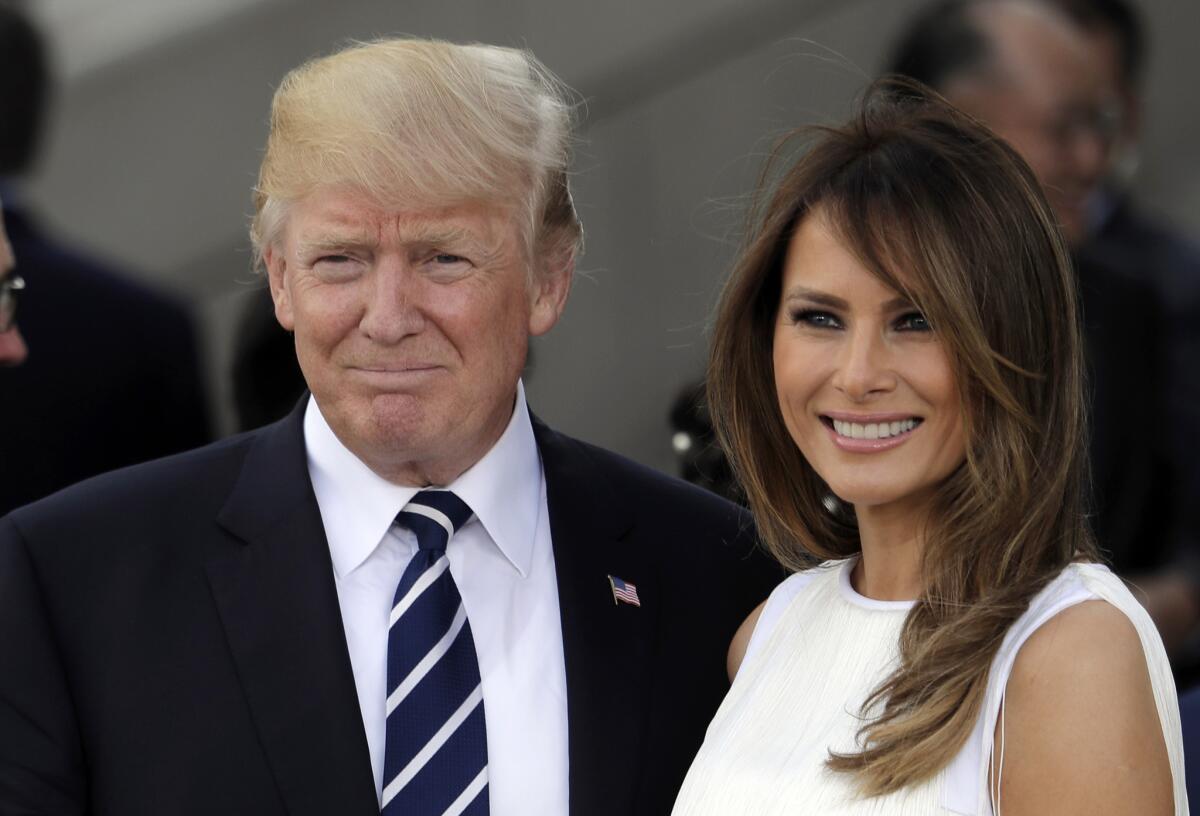
President Trump and First Lady Melania Trump will not attend the annual Kennedy Center honors in December, a traditional showcase of the nation’s arts, to avoid creating political distraction, the White House said Saturday.
Several honorees had said they would boycott a part of the high-profile ceremony to protest Trump’s policies, including proposed cuts in spending for the arts.
The White House decision comes a day after the president’s entire 17-member arts and humanities advisory council quit Friday to protest his response to the neo-Nazi rally that turned violent in Charlottesville, Va.
“The President and First Lady have decided not to participate in this year’s activities to allow the honorees to celebrate without any political distraction,” Press Secretary Sarah Huckabee Sanders said in a statement.
“First Lady Melania Trump, along with her husband President Donald J. Trump, extend their sincerest congratulations and well wishes to all of this year’s award recipients for their many accomplishments.”
This year marks the 40th anniversary of the ceremony at the John F. Kennedy Center for the Performing Arts, and the five honorees announced this month include top artists.
Some artists had said they would skip the reception with the president that is traditionally held at the White House before the event, according to the Washington Post.
Television producer Norman Lear, singer Lionel Richie and dancer Carmen de Lavallade said they would not attend the reception at the White House, the report said.
Another honoree, Cuban American singer Gloria Estefan, was planning to attend in hopes of influencing the president on immigration issues, while rapper LL Cool J has not said whether he would go.
That pre-gala event will no longer take place, the Kennedy Center said, and all honorees will attend the December ceremony as planned.
“The Kennedy Center respects the decision made today by the office of the President of the United States,” said Chairman David M. Rubenstein and President Deborah F. Rutter in a statement.
“In choosing not to participate in this year’s Honors activities, the Administration has graciously signaled its respect for the Kennedy Center and ensures the Honors gala remains a deservingly special moment for the Honorees. We are grateful for this gesture.”
The White House did not provide details about its concerns.
Other high-profile guests have declined invitations to the White House in protest of the president.
The collapse of the President’s Committee on the Arts and Humanities followed the departure of top business executives from his manufacturing and infrastructure council, which the White House later dismantled.
8:30 a.m. This post was updated with response from the Kennedy Center.
- Share via
Leading Republican says Trump lacks the stability and competence needed for success
President Trump has drawn criticism from Republicans and Democrats alike over his response to the violence in Charlottesville, Va., between white supremacists and counter-protesters.
Sen. Bob Corker of Tennessee delivered one of the most stinging reviews Thursday when he said the president had yet to show the “stability” and “competence” needed to achieve success.
“The president has not yet been able to demonstrate the stability, nor some of the competence that he needs to demonstrate in order to be successful,” the Republican lawmaker told reporters in Chattanooga, Tenn.
Corker repeated himself later, as if to stress those words.
“We should hope that he aspires, does some self-reflection, does what is necessary to demonstrate stability, to demonstrate competence, to demonstrate that he understands the character of our nation and works daily to bring out the best of the people in our nation,” he said.
Corker did not stumble over those carefully chosen words.
“I will say we are at a point where there needs to be radical changes that take place at the White House. I think the president needs to take stock of the role he plays in our nation and move beyond himself, move way beyond himself, and move to a place where daily, he’s waking up and thinking about what’s best for our nation,” he continued.
Corker didn’t elaborate on what changes he was talking about. But he did indicate that he believes Trump pushes his personal agenda first, before thinking of the country as a whole.
Corker has been generally supportive of Trump. He’s voiced his approval of the president’s agenda on immigration reform, the fight against Islamic State and the decision to withdraw from the Paris climate agreement.
Even in October, when a now-infamous “Access Hollywood” tape was released showing Trump making lewd remarks about women in 2005, Corker criticized Trump’s comments then as “inappropriate.” But he was not one of the Republican senators who withdrew his support for Trump’s candidacy.
Now a new dilemma has arisen within the GOP over Trump’s responses to the violence in Charlottesville, Va. Two days after the deadly unrest, Trump gave a scripted speech that condemned white supremacists, the Ku Klux Klan and neo-Nazis. But the next day, he referred both to white supremacist protesters and counter-demonstrators who had confronted them, saying that “both sides” were responsible for the mayhem. The back-and-forth statements prompted many Republicans to publicly chastise Trump for not placing greater blame on the racist marchers.
When asked whether Trump had done enough to denounce these groups, Corker did not mince words.
“White supremacy groups, neo-Nazi groups, KKK groups are not what’s good about our nation. They are to be called out for what they are, and that is repugnant,” he said, adding, “I don’t think the president has appropriately spoken to the nation on this issue.”
- Share via
Bannon’s foes welcome his departure but pressure Trump for further shift away from far-right nationalism
Foes of White House advisor Steve Bannon welcomed his abrupt departure Friday, but warned that the administration’s cutting of ties with the architect of President Trump’s populist agenda did not go far enough.
“There is one less white supremacist in the White House, but that doesn’t change the man sitting behind the Resolute desk,” said Michael Tyler, spokesman for the Democratic National Committee.
Republicans, though, remained largely silent. Even those lawmakers outside of Bannon’s circle of influence at the White House and with far-right groups declined to speak up.
Few Republicans seemed willing to risk retaliation for comments critical of Trump, or Bannon, who many expect will have an unbridled platform now that he will be removed from the administration.
House Speaker Paul D. Ryan (R-Wis.) and Senate Majority Leader Mitch McConnell (R-Ky.) both declined comment.
“He doesn’t typically comment on staff, but if he issues a statement tonight I’ll make sure you get it,” said a McConnell spokesman.
Sen. Ted Cruz (R-Texas) told reporters in Lubbock, Tex., that he prefers to “ignore the political circus” of Washington.
“You know, it’s easy for Washington to get consumed by the back and forth personalities, who’s up who’s down, who’s fighting with whom,” Cruz said. “My standard approach is that I don’t worry about that.”
Allies of Democrats, meanwhile, accelerated their campaign to expose others in the White House who they see as sharing Bannon’s nativist views, and to remind voters that the final tone of the administration rests with Trump and his actions.
“Personnel changes are fascinating and dramatic, but let’s just remember how little of a difference it makes with this president,” said Sen. Brian Schatz (D-Hawaii), an outspoken Trump critic. “It’s the president that matters.”
Kurt Bardella, a former House Republican aide who split with Bannon after a stint at Breitbart.com, suggested the advisor will continue to wield influence from outside the administration.
“Steve will do exactly what he has been doing from Day 1 — try to ‘bring everything crashing down,’” Bardella wrote.
“In many ways, I think Steve will feel liberated. Free from the limitations of ‘serving’ or ‘answering’ to somebody,” he added. “Now, he will be able to operate openly and freely to inflict as much damage as he possibly can on the ‘globalists’ that remain in the Trump Administration.”
Many Democrats, who had long called for Bannon to be dismissed, pressed for further action.
House Minority Leader Nancy Pelosi (D-San Francisco) announced her support Friday for a congressional resolution to censure Trump after his statements about the neo-Nazi demonstrations in Charlottesville, Va.
The Progressive Change Campaign Committee launched television ads saying one “is not enough” and calling for the dismissal of other White House aides it characterized as belonging to the far-right.
The Congressional Black Caucus released a list of 10 administrative policies, including the travel ban, immigrant deportations and voter fraud investigations, “that need to go, too.”
“Steve Bannon’s firing is welcome news, but it doesn’t disguise where President Trump himself stands on white supremacists and the bigoted beliefs they advance,” Pelosi said.
“Personnel changes are worthless so long as President Trump continues to advance policies that disgrace our cherished American values,” she said. “The Trump administration must not only purge itself of the remaining white supremacists on staff, but abandon the bigoted ideology that clearly governs its decisions.”
On both sides of the aisle, some lawmakers hoped the parting of ways shows that the recently appointed White House chief of staff, retired Marine general John F. Kelly, might be able to bring stability to the chaotic White House.
“Looks like general John Kelly is taking control of the White House,” tweeted Sen. Bill Nelson (D-Fla.). “That is a good thing.”
- Share via
What do white nationalists want, anyway? Here’s one answer.
As President Trump continues to see fallout over his response to the violence in Charlottesville, Va., and as media coverage of last weekend’s protests seems to be a he said/he said, one question lingers: What is it that white nationalists want?
Last year The Times posed that question to three young members of the Traditionalist Worker Party over lunch in Cleveland.

They don’t actually support Donald Trump or the Republican Party.
We were at the Republican National Convention, and most people who saw white nationalists there might assume they were there to support Trump. But this group was there to convert GOP voters to their own party.
“If you think about it, most Trump supporters are working-class white Americans. Those are our constituents,” said Matthew Heimbach, the co-founder of the group.
There’s plenty he doesn’t like about Trump. The president wants to spend too much on the military. His stance on immigration doesn’t go far enough. He’s “still part of the establishment.”
Heimbach offered a simple analogy:
If you like Donald Trump, you might also like the Traditionalist Worker Party.
These particular white nationalists want to redraw state boundaries into “regions” with similar ethnicities, political views and values. Then, they want a full stop on immigration into their region.
This includes all immigration – legal and illegal.
“Zero net migration, I think would be fair,” Heimbach said.
But they don’t want to stop other regions of the country from welcoming diversity – if that’s what they want.
They really don’t want to call themselves extremists – and they don’t think they’re racist.
“We legitimately reject racial hatred and supremacism,” he said. “[Racism] is used in many cases just for a white person that advocates for their people and their community.”